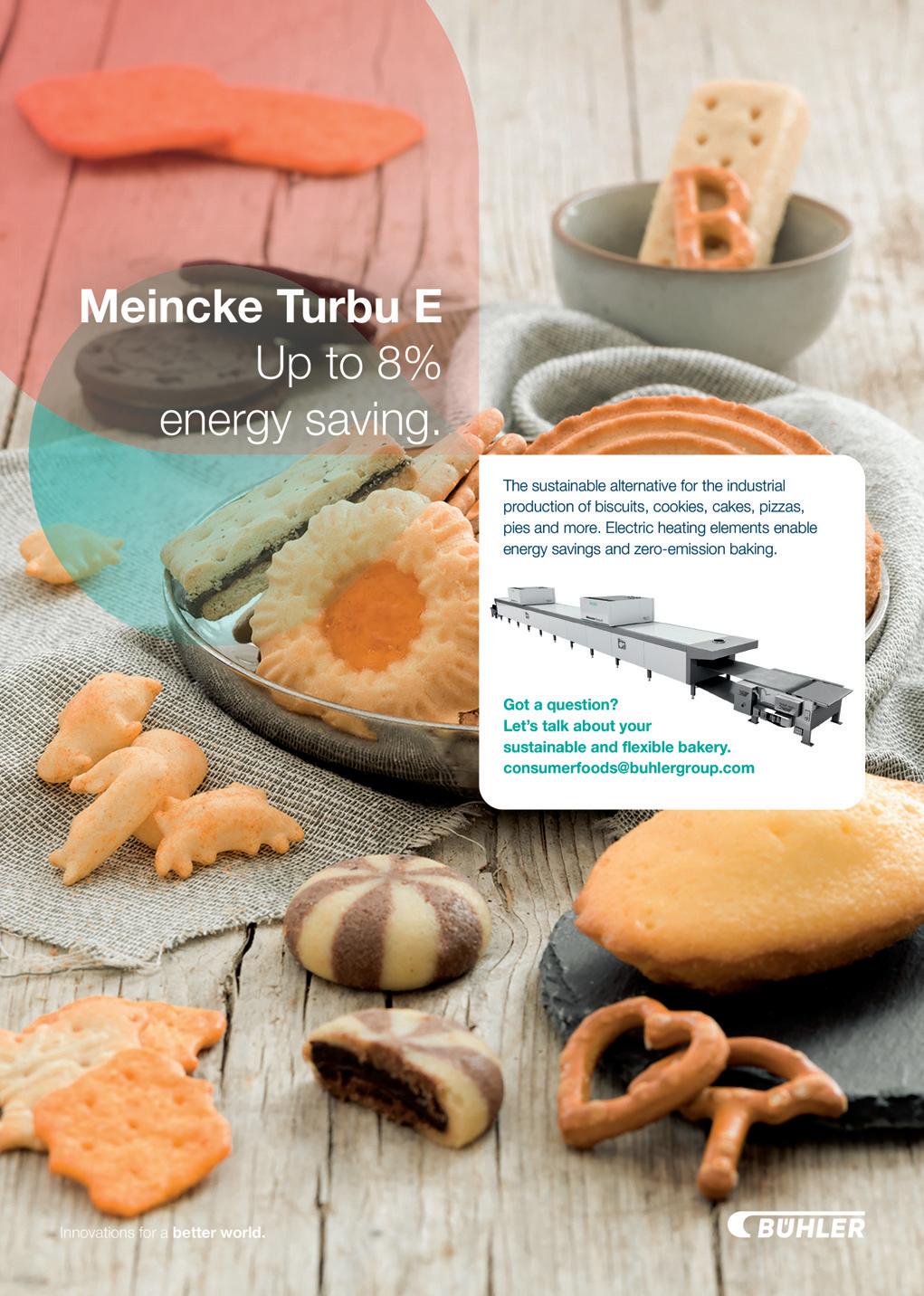A fresh batch
HOBBS HOUSE BAKERY
Pioneering bread baking since 1920

WYE VALLEY BREWERY
UK's leading advocates of sustainable brewing
PRÉ PAIN
Supplying Europe with bake-off lines
 White Managing Director
White Managing Director


A fresh batch
HOBBS HOUSE BAKERY
Pioneering bread baking since 1920

WYE VALLEY BREWERY
UK's leading advocates of sustainable brewing
PRÉ PAIN
Supplying Europe with bake-off lines
 White Managing Director
White Managing Director

with any meal and with a wide variety of toppings, fillings and dips to accompany it.
Sadly, painfully, I had to cut down on all these treats to help lose a few stubborn kilos! Therefore, reading some of the superb and delicious – looking bakery articles in this edition has been a challenge. After having to turn down pancakes, cakes, pastries, doughnuts and the like for two months, even the photographs started to look appetising.
You will be pleased to hear that I have not, as yet, resorted to feasting daily on these mouth-watering images. I am, for the moment, happy to merely read about them within this tantalisingly tasty treat of a publication.
Welcome, dear reader, to your latest edition of Inside Food and Drink. This is easily our most popular publication in the office, not because it is a better read than the others, or working on it is more enjoyable than our other titles: the real reason is that we enjoy the treats some of you send in for us to review.
From tasty nibbles to the latest alcoholic beverage releases, there is always lip-smacking expectation amongst our employees when clamouring for a look into the latest box to arrive. Indeed, it is such a common occurrence, that I am half tempted to make a big deal about the delivery of printer paper, just to see the look of disappointment on their excited little faces when the box is opened!
However, tasty treats have been off the menu for many of us in the office. Annually, after overindulging during Christmas, we
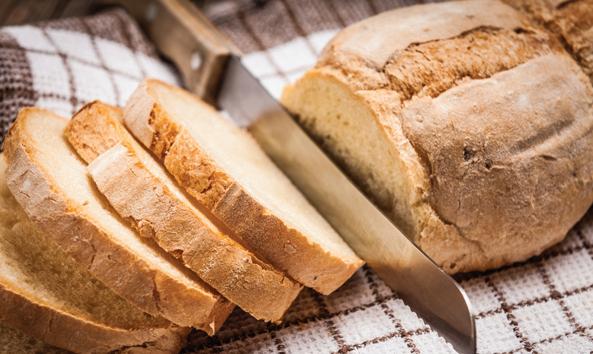
have a weight-loss competition at work with a prize (no, not chocolate cake) for the person losing the highest percentage of body weight over an agreed period.
This contest has been tough, especially as many staff have birthdays in January or February, and it is traditional here to bring in cakes, doughnuts or other similar treats on your birthday. Adding to the temptation, we also celebrate Shrove Tuesday in the office with hot pancakes at break, sup plemented with deliciously sweet and calorific fillings!
Having been a runner up in previous years, I am proud to announce that I won this year’s contest (takes a bow). In order to win, I not only had to spend more time up the gym but had to limit my diet as I enjoy my food and a good glass of red wine. Another guilty pleasure, and a key focus within this edition, is bread. I love all types of bread
I have a small confession to make, before you inundate me with the rapturous applause and praise which I clearly deserve. On the weigh-in day last week, when I was crowned the weight loss champion, I celebrated with wine and bread and cheese and some more wine and maybe some chocolate…I can’t be sure as it was all an exciting sugary haze.
So, whatever your guilty gastronomic pleasures or dietary preferences, I am sure you can still appreciate the skills, advancements, research, developments, innovations, products and services found within this edition. I loosen my belt to you all and your companies.
I have enjoyed reading all the wonderful articles, news, advertisements, events and more that this edition contains. It has been a tough journey and a difficult read whilst I diet, but a no less enjoyable experience. Your good health. n
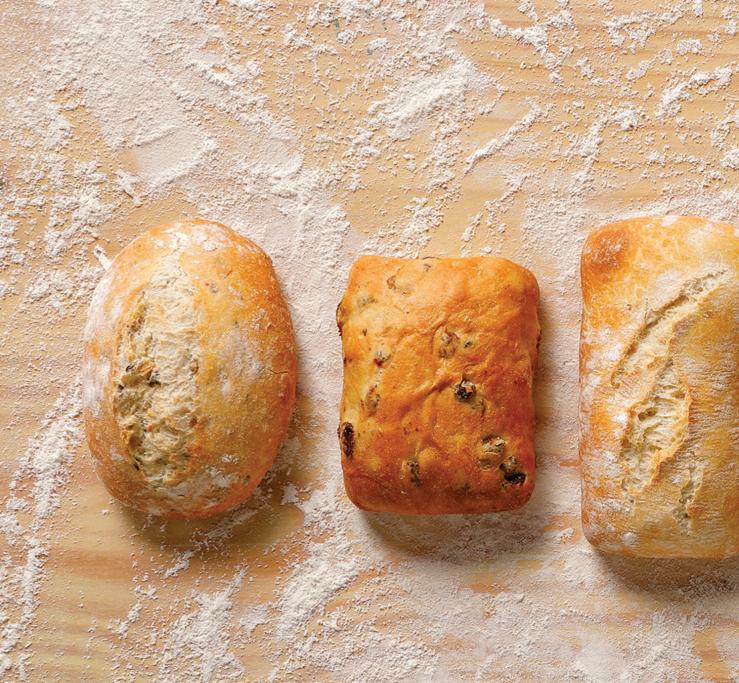
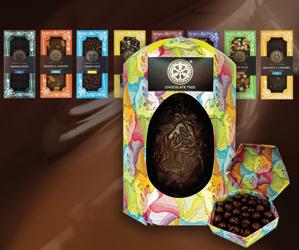

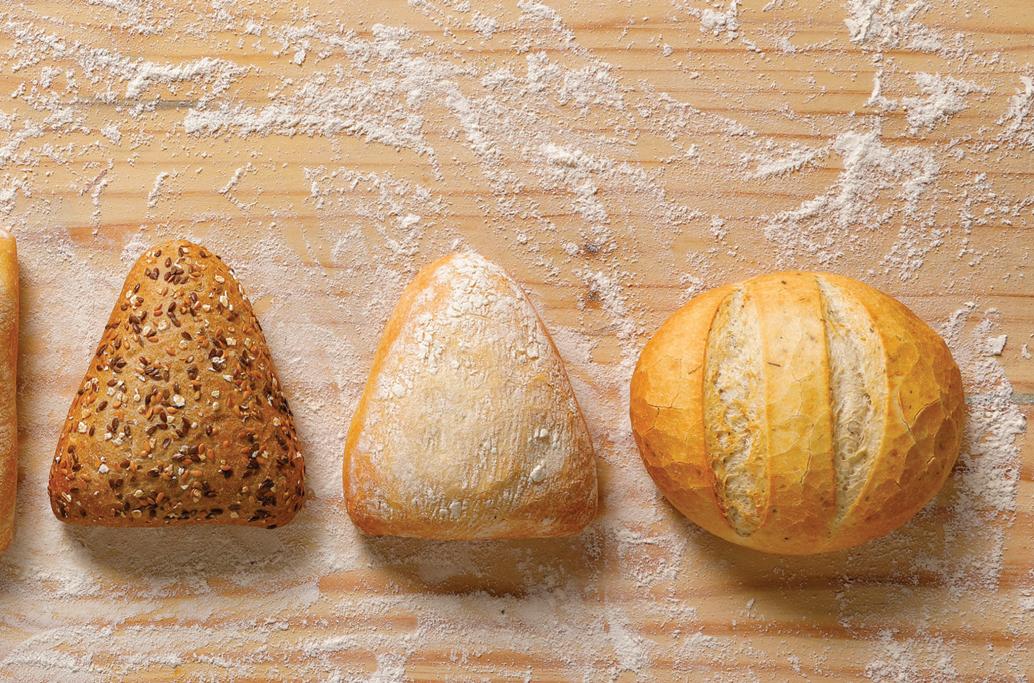


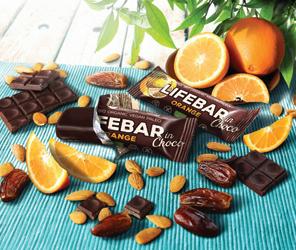
Upcoming events in the industry

Industry professionals from viticulture, production, trade and gastronomy, and the spirits segment meet for three days of concentrated business and a highly educational ancillary programme. Join international market leaders, importers and exporters, commercial agen cies, select vintners and the growing regions from the big wine nations. www.prowein.com

For more than 40 years, IFE, International Food & Drink Event, has sat at the heart of the food and drink community, welcoming 25,000 retailers, wholesalers and foodservice professionals to taste, test and source products from a global list of suppliers. www.ife.co.uk
SAGALEXPO


SAGALEXPO - Flavours of Portugal is a key event for Portuguese companies to strengthen the export side of their brands and products. SAGALEXPO has over 300 national companies and 1,000 international buyers from more than 80 countries. Visitors will see the best Portuguese products. www.sagalexpo.pt



The LCF was born out of love for the UK coffee scene. This year 30,000 creative urbanites and industry professionals are expected to attend the festival at the Truman Brewery, in Brick Lane, London. So, what should you expect from the event? All the tastings your heart could desire? Demonstrations from world-class baristas and interactive workshops? Live music, DJs, art exhibitions and coffee-based cocktails? All of this can be found at the London Coffee Festival. https://www.londoncoffeefestival.com/

interpack is a global trendsetter for the future themes of the food industry. From sustainability to digitalisation: what will be reality in the future is presented at interpack. Hosted at the Messe Düsseldorf, the focus of the show is on packaging materials, packaging machines and related process technology for the food, beverage, confectionery, bakery, pharmaceutical, cosmetics, non-food and industrial goods sectors.
www.interpack.com
Food ingredients North America is the largest ingredient event in the US focused on food, beverage and supplement innovation. Join 16,000 professionals from the health and nutrition industry. Learn about new trends from over 1,000 exhibitors and well-curated educational con tent and conference programming. www.figlobal.com/northamerica/en/home.html
Reporting on the latest developments from the South African food and drink sector
Mission Produce has partnered with ZZ2, Criterion Africa Partners, and Core Fruit with plans to develop over 1,000 hectares of avocados in South Africa for global distribution.
Mission Produce, a world leader in sourcing, producing, and distributing fresh Hass avocados (with additional offerings in mangos and blueberries), has announced a joint venture with ZZ2 Boerdery (one of South Africa’s largest farming companies) and Criterion Africa Partners (CAP), a private equity firm developing assets within the forestry value chain in Sub-Saharan Africa. The joint venture company, Selokwe Agri, is expected to expand to over 1,000 hectares of avocado orchards in the premium growing region of Limpopo, South Africa.
“As global demand for avocados continues to grow, establishing additional sources of owned production through vertical integration is a key element of our sourcing strategy to promote increased supply reliability,” said Steve Barnard, Founder and Chief Executive Officer, Mission Produce. “South Africa is the second largest exporter of avocados to the EU and the UK during the summer season. So, our new investment in the region is expected to support our expansion into export markets, especially in conjunction with the anticipated March opening of our newest forward distribution centre in the UK.”
Partnering with ZZ2 and CAP to vertically integrate the company's operations in South Africa leverages the expertise of each shareholder to maximise the production and distribution potential of the region.

CAP established Selokwe as part of its higher and better use (HBU) investment strategy, which creates value through
the improved utilisation of land, water and labour resources in South Africa and increases employment opportunities in its regional communities. In addition, ZZ2 brings its expertise in avocado cultivation and environmentally conscious farming to maintain compliance with CAP’s environmental, social and governance (ESG) standards, including the maintenance of the Global G.A.P. and Sustainability Initiative of South Africa (SIZA) certifications.
“We look forward to deepening our relationships with some of the most wellestablished, reputable partners in South Africa, the world’s eighth largest exporter of avocados,” said Keith Barnard, Senior Vice President of Sourcing, Mission Produce. “The avocado seasonality of South Africa extends our supply availability by approximately two-to-three months before Peru’s peak season, and it is expected to bring a long-term benefit in our ability to offer a year-round supply of ripe Hass avocados.”
ZZ2 has developed more than 250 hectares of avocados at Selokwe, which are expected to be harvested for the first time in the 2023 season. Mission has engaged Core Fruit to manage its logistics and transportation to the European market, where the majority of volume from South Africa is planned for distribution.

“The opportunity to grow the avocado market in Europe is significant: in 2022, the EU’s per capita consumption was 3.3 pounds, compared to the US at 8.5 pounds,” added Steve Barnard. “The addition of a high-quality source to our existing network strengthens Mission Produce’s position as a global market leader and enhances our ability to drive avocado market growth in the EU.”
Mission Produce is vertically integrated in Peru, Colombia, Guatemala, and South Africa, and manages over 5,500 hectares of avocados. n
Reporting on the latest developments from the Austrian food and drink sector

ACI Group, a leading distributor working with some of the largest global food, pharma, industrial and road construction brands, has entered into a new partnership with international market leader Soy Austria to distribute its soy-based solutions in the UK and Ireland.
Founded in Austria in 1752 as a mill, Soy Austria has been producing soy-based ingredients since 1989 (when its production facility was inaugurated). In 2003, the company closed production on grain processing to fully focus on soy for both feed and food production.
Operating from its headquarters in Prinzersdorf, Soy Austria turned its business efforts to solely manufacturing food ingredients in 2016, having perfected the processing of soy by using every part of the bean to create a multifunctional portfolio. The company also has an office in Vienna. Its minimal processing facility enables the soybean to be treated via a mechanical and thermal process avoiding the use of any chemical solvents or auxiliaries, to retain a clean-label and high nutritional profile.
In 2021, the company had a brand relaunch, changing its name from Soja Austria to Soy Austria sharpen its international company profile as a globally-acting food ingredient house. This shift of focus is reflected in the ACI deal.
The new, exclusive contract will enable the distributor to meet the growing demands of the food industry with sustainable, non-GMO and natural soy-based ingredients to drive product innovation.
“Consumers are increasingly seeking transparency and minimally processed products,” said René Skarnager, Managing Director at Soy Austria. “This rising demand
for simple and recognisable ingredients means that more companies are removing or replacing artificial ingredients with more natural options in the purchasing decision ladder.
“With sustainability one of our core values, Soy Austria is excited to partner with a distributor that puts environmental, social and governance goals at the forefront of its strategy. We look forward to working closely with ACI Group to meet the needs of food ingredients manufacturers across the UK and Ireland.”
“The popularity of soy-based solutions will continue to soar well beyond 2023,” commented Karsten Smet, CEO at ACI Group. “Currently, the global soy protein market is estimated to reach $15.3 million (£12.5m) by 2023 at a 4.4% CAGR. Health and environmentally conscious consumers that are looking for alternative protein sources are driving this market to a whole new level, pushing food ingredients manufacturers to step up to the plate and innovate.
“At ACI Group, we want to help our customers meet the demand for plant-based, high value protein and are delighted to partner with Soy Austria to deliver high quality, sustainable ingredients to the UK and Irish markets.”
The company’s extensive product portfolio includes full-fat soy flours, enzyme-active and enzyme-inactive, roasted soy grit, highquality debittered soy bran and premium
At ACI Group, we want to help our customers meet the demand for plant-based, high value protein and are delighted to partner with Soy Austria to deliver high quality, sustainable ingredients to the UK and Irish markets
full-fat soy flakes for the bakery and confectionery markets. In its second production plant, its 100% natural textured soy protein range is produced from semi- defatted soy flour to meet the demands of the plantbased meat market.
Soy Austria has committed itself to the strictest quality regime in the soy business, aiming for long-term relationships with its customers. Production is under constant and strict quality control in order to guarantee the highest possible product safety.
Supported by a computer-assisted control system and state-of-the-art food safety equipment like metal detection and X-ray technology, Soy Austria provides safe food ingredients for the global market. Emergency plans, spare capacity at plants and a dedicated team of mechanics, available 24/7, ensure uninterrupted production.
The partnership with Soy Austria follows last year’s news, which saw ACI Group secure exclusive UK distribution agreements with two leading nutraceutical ingredients suppliers, Caltron Clays and GR Herbals. n
Reporting on the latest developments from the UK’s food and drink sector

Food and Fuel supports the financial and physical wellbeing of young pupils and their families and will offer workshops, lessons, web-based assemblies and online cook-alongs. The scheme also gives ingredients to families and an innovative opportunity to borrow slow cookers and air fryers from school libraries.
The project supports the wider environmental and community mission of UKHarvest, to help people out of food insecurity and end food waste across the UK. The charity also offers education across the country and hosts an award-winning community food hub in London.
UKHarvest is already on a mission to eliminate hunger and food waste through the redistribution of quality surplus food. The company collects perishable food from places like supermarkets, hotels, whole salers, farmers, stadiums, catering companies, shopping centres, delis, cafes, restaurants, film and TV shoots, and boardrooms. UKHarvest take it, directly and free of charge, to charities who are helping vulnerable men, women and children in the UK.
The charity already offers money-saving, waste-preventing cookery courses and tips with engaging sessions that are designed to improve cookery skills, educate about healthy choices, and fight food waste in the home. The intention is to eat well for less, whilst also reducing an individual’s environmental impact.
“It’s heart-breaking to see so many people affected by the cost-of-living crisis,”
said Yvonne Thomson, CEO of UKHarvest. “We meet families every day who are forced to choose between paying for heating or feeding themselves. We’ve launched this project to immediately ease some of the pressures faced by those most in need, to enable everyone to prepare healthy food at an affordable price. This adds value to the support we already provide directly to charities and individuals through our food rescue and redistribution service, community hubs and by helping people cook well for less and make the most of their food.”
Recent figures from The Food Foundation show one-in-four households with children cannot afford the healthy meals they need for their family. With high inflation on the costs of food and energy, households are looking for ways to reduce expenditure. Even if a food bank or pantry can provide free or low-cost food parcels, it still costs money to prepare the meals.
“We are committed to supporting families that are living in fuel poverty,” said Phil Burrows, Head of Customer Vulnerability Social Programme Delivery at UK gas distribution company Cadent. “Each week, many families are making a difficult decision between heating their homes and feeding their families. This project will support many families across our networks to alleviate some of the challenges they currently face by giving help and guidance on cooking nutritious, healthy and cost-effective meals that will feed their family.”
“Our customers are facing unprecedented challenges,” added Ian Cameron, Director of Customer Service and Innovation at UK Power Networks. “So, we have expanded our fuel poverty support over the last year, working with more partners than ever before to deliver practical support to more customers. We are delighted to team up with UKHarvest and Cadent to help support more of those families who are struggling the most.” n
A partnership between Cadent, UK Power Networks and UKHarvest aims to reach up to 20,000 pupils and their families in 70 schools across the East of England. This project will help people to eat well for less and cut the cost of cooking by exploring fuel efficient methods, introducing new technologies and revisiting some traditional essentials.
Reporting on the latest developments from the USA’s food and drink sector

Sysco has partnered with two leading universities to accelerate climate innovation and prepare the next generation of sustainability and supply chain leaders.
Sysco Corporation, the leading global foodservice distribution company, has launched its new ‘Recipe for Sustainability’ programme. Through this programme, Sysco will collaborate with top universities to explore innovations that will accelerate climate action and lead the industry towards a more sustainable future.
Students at Arizona State University and Pennsylvania State University will have the opportunity to solve real-world challenges and propose innovative, costeffective solutions to reduce packaging, food waste and the use of plastic in takeaway containers.
“Sysco is proud to partner with leading universities to help develop the next generation of sustainability leaders,” said Neil Russell, Sysco’s SVP Corporate Affairs and Interim Chief Financial Officer. “We’re eager to see the bright ideas generated through these partnerships that will help address sustainability challenges faced by our industry, and ultimately reduce our impact on the planet.”
In 2021, Sysco set an industry-leading science-based climate goal to reduce 27.5% of its direct emissions (Scope 1 & 2) by 2030. Sysco also committed to engaging supplier partners (representing 67% of Scope 3 emissions) to set their own sciencebased targets by 2026.
“The climate crisis is too big for any one company to tackle alone,” explained Mr Russell. “By collaborating with our customers, our supplier partners and other innovators such as Arizona State University and Pennsylvania State University, we can drive real change across our industry.”
In addition to partnering with Pennsylvania State University on sustainability innovations, Marie Robinson, Sysco’s EVP and Supply Chain Officer, was recently appointed to the university’s Centre for Supply Chain Research (CSCR®) Board of Advisors. The CSCR Advisory Board members commit to a two-year appointment where they are active in CSCR-sponsored programmes and events and provide input and guidance for the centre’s strategic plan and forward-thinking initiatives, as well as approving faculty research affiliates and fellowships.
In-line with its target of 2030, Sysco aims to add 2,500 electric trucks to its US fleet and utilise 100% renewable energy across all its facilities.
The company also hopes to reduce its annual greenhouse gas emissions by more than 445,000 tonnes, which equates to 7.3 million tree seedlings grown for ten years, or 1.1 billion miles driven by an average passenger vehicle.
In recognition of its efforts, the company has ranked in the top 20 Texas businesses committed to conservation and sustainability by TxN20 and was ranked by JUST Capital 2022 as the number one food and drug company to commit to serving the environment.
Sysco is the global leader in selling, marketing and distributing food products to restaurants, healthcare and educational facilities, lodging establishments and other customers who prepare meals away from home. Its family of products also includes equipment and supplies for the foodservice and hospitality industries.
With more than 71,000 colleagues, the company operates 333 distribution facilities worldwide and serves approximately 700,000 customer locations. For the fiscal year 2022, ending July 2, 2022, the company generated sales of more than $68 billion. Information about the company’s Sustainability programme, including Sysco’s 2022 Sustainability Report and 2022 Diversity, Equity & Inclusion Report, can be found on its website.
For important news and information regarding Sysco, visit the Investor Relations section of the company’s Internet home page, which Sysco plans to use as a primary channel for publishing key information to its investors, some of which may contain material and previously non-public information. In addition, investors should continue to review its news releases and filings with the SEC. n
By collaborating with our customers, our supplier partners and other innovators such as Arizona State University and Pennsylvania State University, we can drive real change across our industry
“ “
SAGALEXPO 2023
SAGALEXPO runs from 27th to the 29th of March, held at the FIL - Feira Internacional de Lisboa atividades - in Lisbon. The show is the largest national fair aimed at the export of Portuguese products. CEO José Frazão reviewed the show and what visitors can expect. Questions by Phil Nicholls.
What do you see are the benefits to businesses of attending the show?

SAGALEXPO – Portuguese Flavours is the only food fair held in Portugal that directly promotes the meeting of Portuguese food and beverage companies with international buyers from all five continents.
SAGALEXPO actively seeks out the biggest players in foreign markets and invites them to attend the fair as our international guests. By participating as potential buyers, they represent endless business opportunities for our exhibitors, building their exports.
At its first event, SAGALEXPO had more than 250 Portuguese companies exhibiting and over 700 international buyers attending. During the three days of the event, the exhibitors had several meetings with the buyers, giving them the opportunity to present their
products, and this resulted in new partnerships – which, in turn, allowed them to increase turnover and expand their exports.
Please summarise what Portuguese food and drink companies can offer the global market?
The Portuguese agri-food sector can answer market needs and create high-quality products and services to address them. Portuguese companies in the food and beverage sector are highly specialised and are known for their first-rate products.
Portuguese olive oil producers, milk and dairy producers, and preserves and meat companies are all famous internationally. Tourists are usually fascinated about our gastronomy, and frequently want these foods available in their own countries. This brings two opportunities: an increase of tourism inflow, boosted by recommendations


from friends and relatives who have already been to Portugal; and an increase in demand for our products from international buyers wishing to import them.
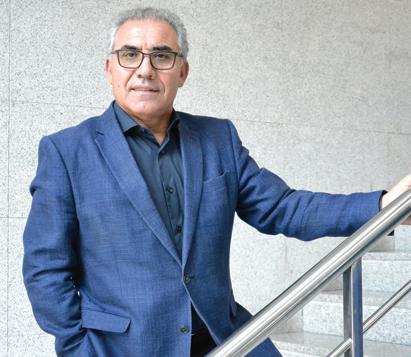
How has SAGALEXPO 2023 evolved since the last show? What is new for this year?
This year, we present a more sophisticated version of the fair by simplifying the way the exhibiting companies and international buyers interact. All companies who register beforehand benefit from privileged publicity and promotion in our digital channels, as well as in our magazine Veja Portugal.
We have considered all the feedback from the first event and improved several operational aspects. As in 2022, we offer all international buyers accommodation for the three nights of the fair, entrance tickets to the event, and the opportunity to have lunch with the exhibitors every day. The latter is an additional networking opportunity that allows buyers to sample our national products and brands.
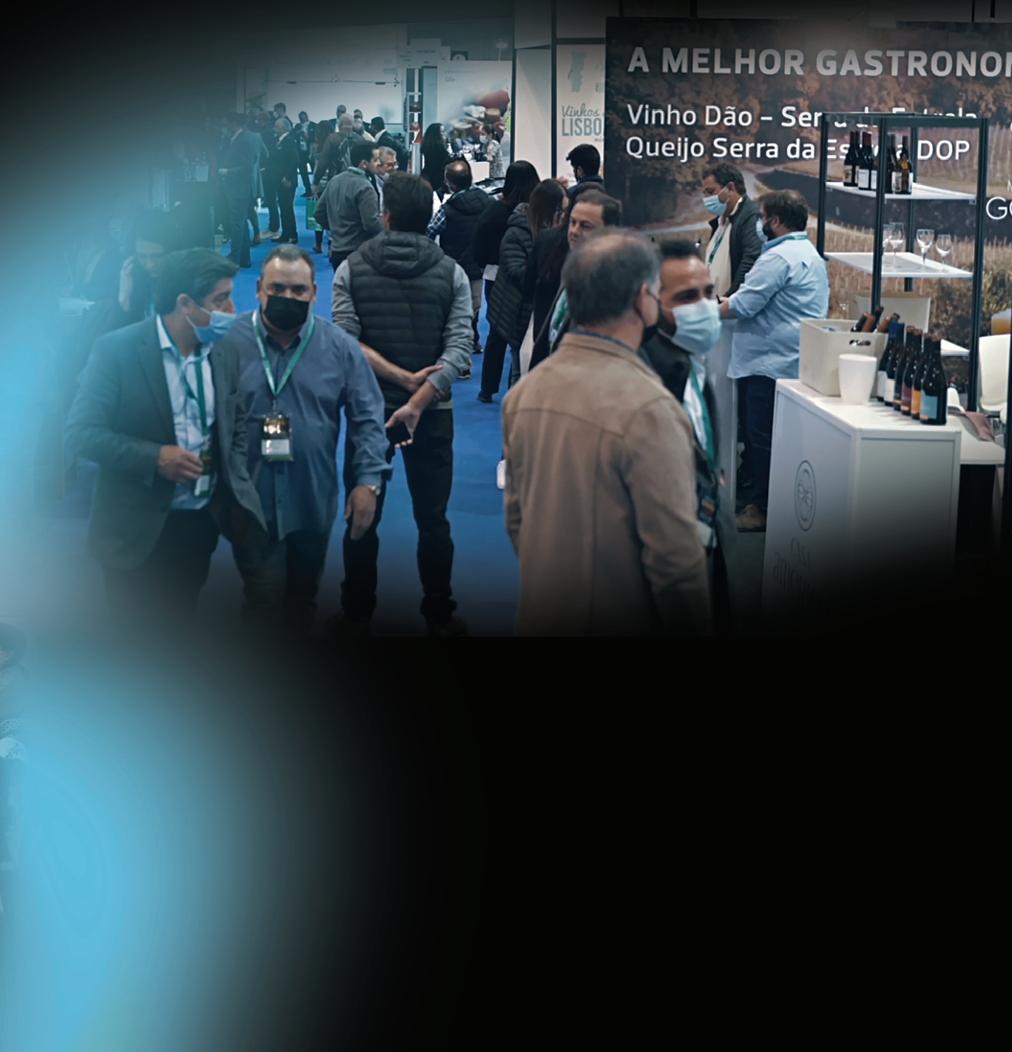
SAGALEXPO 2023
What visitor and exhibitor numbers are you targeting for this year?

Our goal was to exceed last year’s numbers, and we achieved that during 2022. We expect to surpass 350 exhibiting companies, and to welcome over 1,000 international buyers at SAGALEXPO 2023.
What can visitors expect from their trip to SAGALEXPO 2023?
We have a very complete and diversified range of exhibitors and, therefore, brands and products. The importing company can not only find a specific product that one of the companies exhibiting is already selling, but also request a variation of an existing product to be created by that same company. The possibility to create an exclusive brand for a market is something that our international guests really liked in 2022 and continues this year. Additionally, the exhibitors also present seasonal products. The international visitor will have a lot to see, taste and learn about.
What benefits can Portuguese companies expect to gain from exhibiting at SAGALEXPO 2023?

We represent a wide range of Portuguese food and drink products. Attending SAGALEXPO means travelling abroad without having to leave the country. By bringing to our event key importing companies from all over the world, we facilitate more business contracts and partnerships.
Your specialised commercial team helps international visitors attend the show: how much do you feel this additional service helps boost attendance?
SAGALEXPO has a specialised commercial team with over 30 years of work experience organising events, having gathered a network of reputable contacts from different markets. By spending the time to get to know our guests and their needs, as well as to hear what they have to say about our performance, we try to ensure that they attend the fair and will want to return for years to come.
After all, SAGALEXPO is not only about the internationalisation of Portuguese brands and products, but also about helping our international guests expand their portfolios according to their market’s demands.
Looking at the companies already booked for SAGALEXPO 2023, can you share any previews about the Portuguese food trends and developments on display this year?
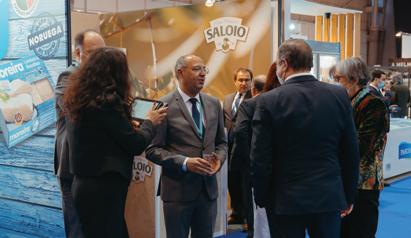

We are very pleased that we have not only kept 90 percent of the exhibiting companies from the first event, but also that new ones have joined us this year. It was a risk to start this project, because there were still a lot of concerns from our guests about travelling abroad due to the pandemic. However, we are thankful that we decided to push through.
Both Portuguese companies and international players believed in us, and that proved beneficial, due to all the subsequent new businesses. This year, everyone expects even better results. We know that our exhibitors are excited to surprise our international guests with new products, but we need to keep them as that: a surprise.
Are there any special aspects of SAGALEXPO 2023 that you would like to include in this feature?
We have a special event prepared for all the buyers that want to know about Portuguese wines. Our partner, ViniPortugal, the promoter of Portuguese wines abroad, will organise a wine tasting, giving the buyers the opportunity to taste the different grape varieties produced in our beautiful vineyards.
On a personal level, what aspect of SAGALEXPO 2023 are you most excited about?
SAGALEXPO is a very ambitious project, with a different dynamic from other fairs that we organise during the year, and that is a challenging task. It is very fulfilling to design and plan a project, then see it steadily come together.
Logistically, SAGALEXPO requires careful planning, demanding a lot of the team’s time and attention. Much can happen during the
event itself and not everything will go exactly according to plan, but we see it as an opportunity to do better. E-commerce and its development and growth could be harmful to companies such as ours that organise in-person events, but we realise that buyers do not dismiss the importance of face-to-face contacts or the chance to taste the products before making a commitment; we promote a dynamic event so buyers can interact with several different suppliers in a single space. We are studying the feasibility of a digital project that we want to disclose soon, and that will improve the digital side of things.
Is there anything not covered by the above questions that you would like to share with our readers?
To keep posted on our social media accounts and to our digital magazine Veja Portugal. Here we disclose new exhibiting companies and share everything happening in the country. We want to show the world the best that Portugal has to offer. n

F4F – Expo FoodTech
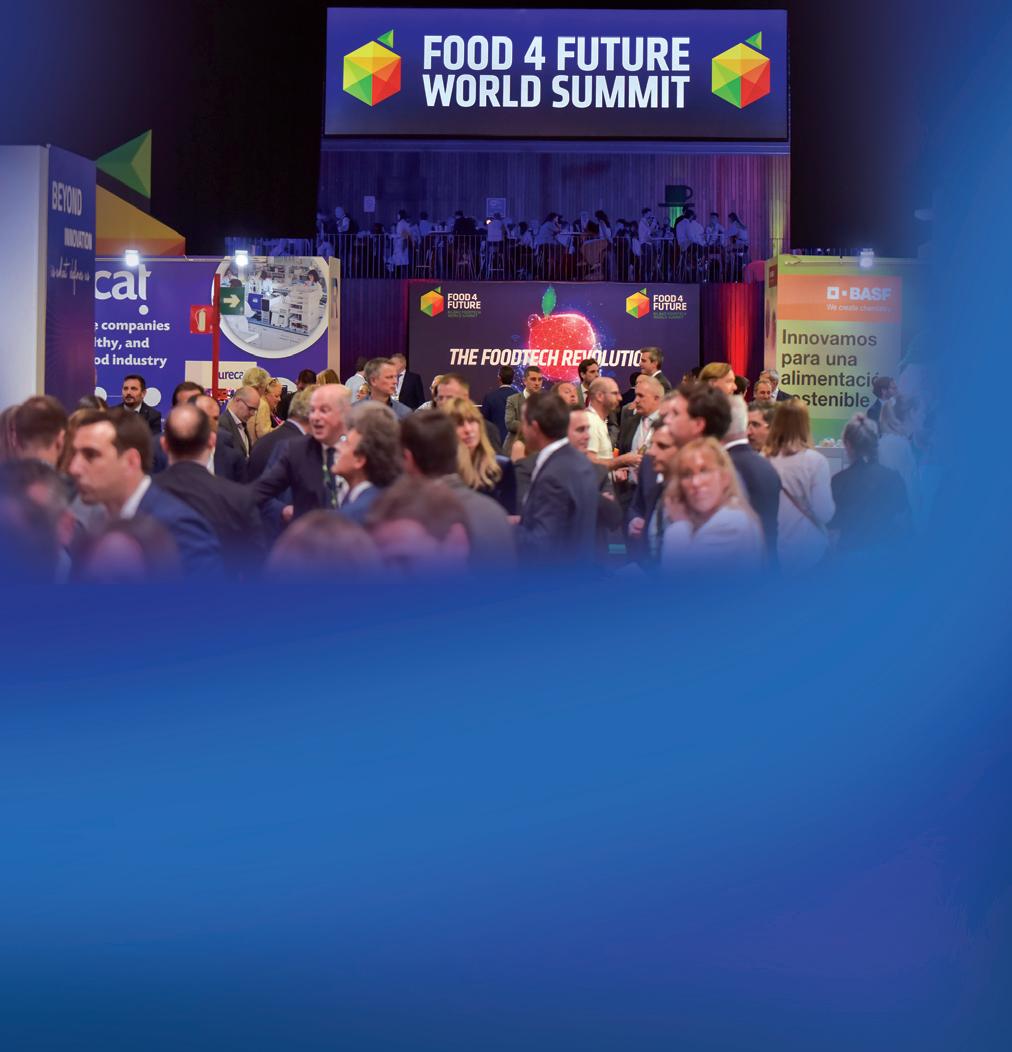

F4F – Expo FoodTech, the global technology event for the food industry will host a new edition of the FoodTech Startup Forum 2023. Once again, the FoodTech Startup Forum will bring together more than 2,000 new startups to present their projects, solutions and business models that will revolutionise the food and beverage industry.
For three days, and in a space of more than 4,000 square metres, startups from around the world will showcase technological innovations to face the challenges of safety, traceability, sustainability and efficiency of the value chain within the food industry. A committee of experts will select the 200 most innovative startups, and the 60 most disruptive ones will be able to present their projects to investment funds and leading companies in the sector. Agrotech, Industry 4.0, Automation, Refrigeration and Climate, Food Processing, Food Packaging, and Food Science categories will divide the presentations at FoodTech Startup Forum 2023. In addition, the selected startups will be direct candidates for the FoodTech Innovation Awards 2023.

The FoodTech Startup Forum offers the entrepreneurial ecosystem a knowledge platform to promote entrepreneurship and the most dis ruptive innovation projects based on technologies such as IoT, Artificial Intelligence, Data Analytics, or new ingredients and foods developed through biotechnology.

Foodtech startups will be able to meet with corporate ventures, international technology clusters and the food industry as a whole. Also, they will have contact with government agencies, clusters and associations, universities, and technology and innovation centres, incubators and accelerators so that they can establish synergies.

The world's largest event for startups in the foodtech sector is now open for applications so foodtech startups from all over the world can present their projects and solutions. Interested companies can register to the FoodTech Startup Forum until the 7th of April 2023.
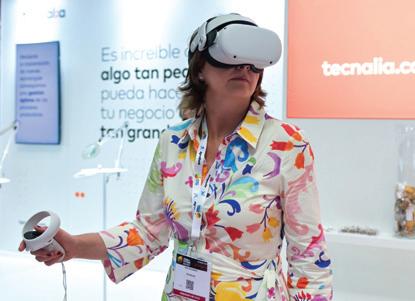
Among the participating startups who attended in previous years were DAT Technologies, which developed a blockchain platform to guarantee the traceability of the food value chain, and Factic, which uses AI and Machine Learning to forecast demand in food and beverage companies.
Alacarte and its automated device that reduces the alcohol content and calories of any bottle of wine or liquor while preserving its original essence, and Insekt Label Biotech and its vegetable protein alternative (developed from crickets and beetle larvae), have also showcased solutions at the Foodtech Startup Forum. n
Biffa is a leading sustainable waste management company that annually recycles

151kt of plastic into material which is used to make new products. Report written by Waste Strategy & Packaging Manager of Biffa Roger Wright.
The unpalatable fact is that the UK still produces too much waste and does not recycle enough of it. Currently the UK is falling short of its 2050 target to prepare 65% of municipal waste for re-use and recycling, and plastic packaging is an important part of this story. As of 2021, the UK has a recovery/recycling rate of 44% for plastic packaging, while materials such as aluminium (75%) and paper and cardboard (70%) are much higher.
It is easy to point at plastic packaging to say the material is a problem, to get caught up in the good-bad debate that polarises public opinion and media commentary. However, when items are made from reusable and recyclable plastics and managed correctly, they provide sustainable, cost-efficient, and durable packaging solutions.
The five best ways to create a more positive future with plastics involve utilising recyclable plastics, increasing capacity and infrastructure, reducing contamination, replacing single-use plastic, and simplifying packaging.
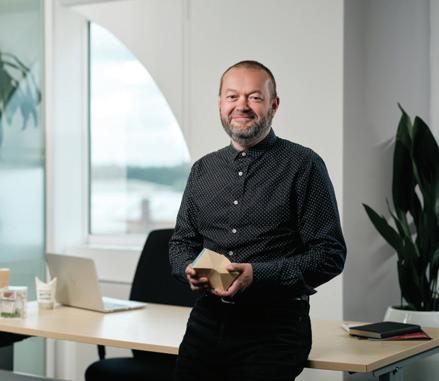
WRAP’s 2022 update to its annual recycling tracker shows that 90% of UK citizens regularly recycle when asked about all types of materials. However, the recovery rate of plastic packaging is 44% because much of it (flexible plastics or pouches) is not recyclable or reusable. While recycling is part of the nation’s day-to-day activities – and the motivation and behaviour are clear – the packaging used for many products does not support recycling.
What can be done about this? People and businesses need information to guide and support their choices. From businesses’ product design and packaging decisions to consumers’ purchase choices, understanding is needed at every stage of the process. If people know more about the different types of plastic and the environmental and economic impact of their choices, then a change in behaviour would be more likely, all the while increasing the quality of recyclable material by creating separate waste streams.
When recyclable plastic packaging leaves the UK, the carbon cost of transportation leads to more emissions compared to onshore recycling. There is a clear argument for more plastic to be recy cled in the UK; to support green investment, infrastructure, eco nomic growth and jobs.
An end to the export of plastic packaging would mean the UK must recycle the 0.7mtpa of plastic packaging waste a year currently exported. This would take at least 12 polymer plants with a minimum 55,000-tonne processing capacity. Biffa’s 57,000-tonne capacity recycling plant in Seaham brought 100 full-time jobs to the local region: investment in infrastructure benefits both the economy and local communities in addition to the environment.
The Deposit Return Scheme in Scotland, launching 16th August 2023, is an example of how bold legislation can drive investment in and improvements to recycling infrastructure. As the logistics provider for the Scottish scheme, Biffa is developing new facilities to handle increased volumes of materials. The consultation for England, Northern Ireland and Wales is now complete, with the launch date set for 1st October 2025.
Last year, Biffa highlighted that nearly a fifth of all recycling is lost due to contamination. Food contamination on or inside packaging is one of the major issues hindering our recycling efforts, but it doesn’t
https://www.biffa.co.uk/sustainability

From bamboo cutlery to plant-based plastic alternatives, any mate rial in a single-use and on-the-go context presents a unique challenge. For example, it doesn’t matter if something is compostable if it ends up in general waste or if non-recyclable materials are put in the recycling bin. Both result in resources being lost and emissions being created.
The ban on single-use plastics will help increase the use of readily recyclable packaging solutions; it is, however, just one piece of the puzzle that will help the UK circular economy.
Brands are operating in highly competitive markets, working with tight margins. Packaging needs to be easy to fill, protect the contents and catch the eye of consumers in a split second in saturated environments. Often this leads to choices in colour and materials that render the container unrecyclable. It does not have to be one or the other; it is possible to create sustainable plastic packaging that speaks to the consumer.
have to be this way. Increased awareness around the recycling pro cess and the impact of contamination will help change behaviour for consumers and businesses.
There are plans for legislation to make the current voluntary, on-package labelling system mandatory. This needs to be realised for both consumer and business packaging, with the clearest messaging possible, to drive awareness of what the recycling symbols mean and the condition a container needs to be in to be recycled. This will reduce the amount of unrecyclable material in the UK collection and processing systems, improve the quality of our recycled materials and lower the carbon emissions output.
Our industry, regulatory bodies and government need a greater understanding of the packaging materials in circulation. Extended Producer Responsibility begins this year, obligating businesses to report greater detail on the packaging they produce and in what quantity. This will provide valuable insight to support customer choice and promote better packaging design for recycling.
The UK government recently announced its intention to ban certain single-use plastics, including plates and cutlery. While this is a welcome step in the right direction, the plastics themselves are not the problem; it is that they are single use. As single-use plastics are phased out, they need to be replaced by more multi-use or reusable options.
Commonality and consistency are key to creating simple, sustainable packaging. If materials or different types of plastic are mixed, then it becomes harder to separate these materials and recycle them. Packaging such as laminated material, plastic wrapping and big sleeves need to be separated or recycled at specialist facilities; this is often impractical and unsustainable at scale.
This is also true of packaging that contains more than one colour of plastic. No food-grade coloured plastic can be recycled back into natural-coloured food-grade packaging as the pigment remains in the polymer. When mixed pigments are recycled together, the material becomes grey. Adopting clear plastic wherever possible will help move towards more sustainable packaging. Improvements can also be made by shrink-wrapping labels rather than gluing and tethering bottle tops to bottles (ideally the same colour).
Plastic packaging is unlikely to lose its edge if it is clear, homogenous and consistent. Eye-catching designs can still be used, provided the components are easily removed and recyclable. Increasing public awareness will support positive changes in consumer behaviour. People want to do the right thing, and those brands which explore sustainable options first will catch the eco-conscious eye and achieve cut-through – the time to start is right now.
Biffa supports some of the UK’s leading brands through this process. Its Blueprint for Waste Net Zero outlines the role of recyclable plastic packaging within the future carbon hierarchy and what further changes are needed to deliver a truly circular economy.

You can learn more about Biffa and its efforts towards sustainability here:


The latest news from across the global food and drink sector

Nao Spirits and Beverages (India’s first Craft Gin Distillers) announced the Jay Dhawan Scholarship in association with the Gin Guild. The distillery will sponsor one student every year from India, to pursue an MSc in Brewing and Distilling from Heriot Watt University in the UK (one of the most prestigious and respected institutes in the world of brewing and distilling).
This scholarship was created to celebrate the memory of Nao Spirit’s late distiller, Jay Dhawan. Much loved by all, Jay had started his career behind the bar at one of Mumbai’s most celebrated establishments – Bombay Canteen. Wanting to pursue a different path
though, he jumped at the opportunity to join Nao Spirits and be trained to be a distiller under Dr Anne Brock.
He trained in 2017 alongside Anand Virmani, the Co-Founder and Master Distiller at Nao Spirits, and went on to produce India’s first craft Gins – Greater Than and Hapusa. The team at Nao Spirits and the Gin Guild would like to thank Jay’s parents and family for allowing them to create a way to remember him.
This scholarship will be open to all applicants from India, with a preference given to those from the Indian F&B sector. Applications are currently being accepted for September 2023.
Since the start of February, eggs laid and sold through the British egg industry Lion Code label can no longer be labelled as free-range or free-range organic. This means consumers will only see ‘barn’ or ‘caged eggs’ on their supermarket shelves.
The changes to the labelling of eggs is due to the compulsory nationwide housing order which was put in place for all birds in the UK at the end of last year, to help contain one of the worst cases of Avian Influenza (AI), also known as ‘bird flu’, ever seen.
There is an EU derogation for free-range laying hens which states they can be kept inside for up to 16 weeks, if they are required to be housed in an event such as a bird flu outbreak their eggs can still be labelled free-range during this time. Since this time period has now ended for the whole of the UK, all eggs from free-range birds that are being housed must now be labelled as ‘barn.’
“We want to reassure the public that it is still possible to buy eggs from hens that have been well cared for,” said Kate Norman, the RSPCA’s laying hen welfare expert. “RSPCA Assured eggs are always from farms inspected to the RSPCA’s higher welfare standards. This means they are 100% cage-free, and the hens are provided with raised perches and plenty of enrichment inside the barn to peck at, forage and express their natural behaviour.”
The Kroger Co recently announced the opening of a new spoke facility in South Florida. Joined by the local community, Kroger celebrated the expansion of the delivery service and welcomed 90 new associates.
The 60,000-square-foot spoke facility will work in conjunction with the Groveland, Florida fulfilment centre. All orders are picked at the products' peak freshness within the Groveland facility. The expansion to South Florida, including Miami represents an extension of a collaboration between Kroger and Ocado Group, a world leader in technology for grocery e-commerce.
At the hub sites, more than 1,000 bots move around giant 3D grids, orchestrated by proprietary control systems. The grid, known as The Hive, contains totes filled with products and ready-to-deliver customer orders. As customers' orders near delivery times, bots retrieve products from The Hive and present them at pick stations for items to be sorted for delivery, a process governed by algorithms that ensure items are intelligently packed. Bags are evenly weighted, and each order is optimised to fit into the lowest number of bags, reducing plastic use.
Kroger's end-to-end cold solutions keep groceries fresh once loaded into a customised refrigerated delivery van, which can store up to 20 orders. Vans may travel up to 90 minutes with orders from the hub and spoke facilities to make deliveries.
Europe Snacks, a leading European producer of savoury snacks for third party brands, has announced acquisition of 100% of crisp manufacturer, Burts Snacks. This operation enables Europe Snacks to accelerate its growth in the UK, which is Europe’s largest snacking market.
Supported by Apax Partners, Europe Snacks entered the UK market with the acquisition of Kolak Snack Foods in 2016. The acquisition of Burts represents a further step in expanding the group’s presence in the UK, with the product portfolio being highly complementary.
Morning routines have just been made simpler with the launch of Rokit Health’s wellness coffee pods.
Compatible with Nespresso machines, these 100% recyclable aluminium pods, bursting with goodness are now available in Tesco in three varieties: Mind Boost, Immunity Boost and Mighty Matcha, RRP £4 for 10 pods.
Mind Boost is 100% Arabica coffee enriched with vitamins B2, B3, B5, B6 and B12, to support the nervous system and contribute to mental performance. The drink promises aromas of cereal and malt, and a spicy, fruity aftertaste. Immunity boost is a coffee promising benefits for the immune system. Mighty Matcha continues the matcha revolution with a hot drink from Japan, high in antioxidants.
Rokit Health drinks are all made from the highest quality natural ingredients, sourced from sustainable and ethical farms all over the world and only ever use raw ingredients that are minimally processed and free from chemicals, preservatives, and flavourings.
The unification of the two companies in the UK will enable the group to better serve existing clients and unlock growth through a wider offer of snacking products and a market leading innovation pipeline. The combined manufacturing and supply chains of Europe Snacks and Burts will facilitate the group’s further investment in additional capacity and service excellence.

Burts will continue to operate from its two manufacturing facilities in Plymouth and Leicester, led by current Managing Director Dave McNulty.
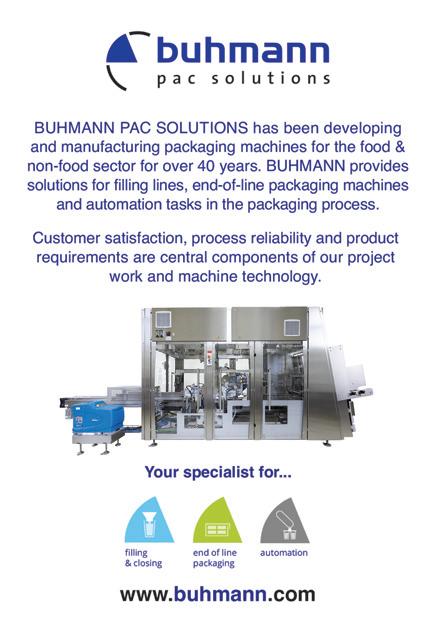
Taste of the season
Easter chocolate delights
Its never too early to start thinking about Easter chocolate. These days, there are more choices than ever, from some of the most sophisticated and delicious chocolate makers on the globe. Inside Food & Drink sampled some of the best. It was a hard job, but someone had to do it.
Inspired to create a positive change for people with Autism, Harry Specters was the vision of founder Mona and her family. The award-winning company creates taste sensations that directly improve the lives of autistic people. The Rainbow Egg is a white chocolate egg consisting of 29% cocoa solids. With natural ingredients and a breath-taking design, this Easter treat is a delight for the eyes and the tastebuds. The chocolate is also gluten-free and is always made with the freshest of ingredients. The company also offers Chocopops: these fun lollipops feature exciting Easter-themed edible designs and come in packs of five –the perfect element for any Easter egg hunt. On average, for every £1 spent at Harry Specters, 69p is dedicated to providing paid employment, work experiences and training opportunities for people with autism. Since 2012, the company has helped more than 300 autistic people and supported 155 carers.

Our thoughts : “This egg was unlike anything I’d ever tasted. The flavour was as powerful as the exciting visuals, and the strong creamy flavour was unforgettable and enticing. It’s definitely one that everyone should try.” – Daniel O’Malley, Marketing Manager.
i F D &These products are available now at:
www.harryschocs.co.uk
These products are available now at: www.bettys.co.uk

The Betty’s ‘Easter Eggs for Grown Ups’ range includes some of the most impressive offerings you are likely to see this year. The limited-edition Spring Bloom egg is handcrafted in the company’s Yorkshire bakery, made with exquisite eau de nil-coloured white chocolate and hand-decorated with royal icing flowers and a silver shimmer. At 19cm high and 310g there is also a good height and weight to them. And that is before you have tried the quality of the chocolate itself. The company offers a wider Easter selection, including mini eggs, milk choco late orange button eggs, and the post-friendly ‘flat egg.’ There is a vegan alternative, a strikingly elegant egg containing 65% Venezuelan cocoa. Betty’s is a truly luxury option.
i F D &Our thoughts: “The first thing I noticed was that this egg was a feast for my eyes. It is truly spectacular, with great attention to detail. The taste did not disappoint either, with a divine sweetness that was both substantial and comforting. This is not only the best white chocolate I have ever tasted, but some of the best chocolate altogether.” – Hannah Barnett, Editorial Assistant.

The Chocolate Tree is an award-winning chocolatier who has mastered craft chocolate that tastes exceptional and protects biodiversity. The Milk Chocolate Easter Egg is the epitome of luxury. With a 45% cocoa content and an eye-popping design, this egg is sure to keep people coming back for more. The addition of a surprise compartment in the vibrant box filled with hearty salted caramel popcorn is a treat for all the senses and really magnifies the enchantment of Easter. This egg is perfect for all ages as a feel-good indulgent treat. Also on offer are a variety of bars perfect for any occasion, the bean to bar chocolates utilise single estate sustainable cacao from South and Central America and have a rich and succulent taste perfect for any chocolate enthusiast. With 100g bars of craft chocolate available as well, this company knows how to combine the perfect ingredients to take its customers on a spectacular taste journey.

Our thoughts: “The egg had a rich chocolate taste, which was light and moreish. The design was so beautiful and really envisioned the magical essence of the theme, plus its ethical nature made me feel great eating it. The salted caramel popcorn was also melt-in-your-mouth good.” – Imogen Ward, Editorial Assistant.
These products are available now at: www.choctree.co.uk

Easter chocolate delights
Our thoughts : “The egg had a surprisingly subtle crunch with every bite and maintained a perfectly balanced nutty and bitter taste with exceptional smoky undertones. We loved the playful characterisation of Frizzle and the creative shape really brought her to life.” -The Studio Team.


Montezuma’s is a fun and enthusiastic innovator of the chocolate world and a huge advocate for sustainability. Creating a one-of-a-kind experience with every offering, the brand has knocked it out of the park with its Easter range. Furthering its eco-friendly initiative, whilst providing delectable flavours, Montezuma’s Organic Chocolate Eco Eggs are a sight to behold. With 100% recyclable packaging and no plastic in sight, these eggs – filled with organic goodness – are the perfect choice for those looking for ethical chocolate that tastes amazing. Alternatively, the company’s Easter Hens come in three flavours and a unique shape that is fun for all the family. The packaging pops and the excellent value for money makes Silkie, Frizzle and Orloff the perfect addition to your egg basket this Easter. Another wonderful offering is the Chocolate Peanut Butter Mini Eggs; the perfect balance of earthy peanut butter, mixed with tantalisingly sweet chocolate is enough to wish everyday was Easter.
These products are available now at Waitrose stores and online: www.montezumas.co.uk
The Läderach FrischSchoggi is a Läderach classic, and a perfect gift. FrischSchoggi is a marriage of fresh Läderach chocolate with carefully sourced ingredients, presented in its iconic slab form. It is handmade without additives or preservatives by artisan chocolate makers in Switzerland, using a combination of traditional and innovative methods. The name FrischSchoggi comes from a Swiss-German expression for fresh chocolate It is synonymous with creativity and a unique taste experience. The creaminess of the chocolate is ensured by the milk which comes from Alpine cows that have been out in the fields and enjoyed the Swiss sun and grass. From fruity and fresh with white chocolate and rasp berry pieces, or classic with milk chocolate and caramelised Piedmontese hazelnuts, to pure rich indulgent enjoyment with dark chocolate, there is something for everyone here.
i F D &

These products are available now at: www.laderach.com
Our thoughts: “The dark chocolate with raspberry had the bitterness one associates with high-quality dark chocolate. It really brought out the sweetness of the raspberry. In general, the variety of textures was superb and the flavours divine. You could tell this was a handmade, artisan product. Truly exceptional.” – Phil Nicholls, Editorial Manager.

Valrhona’s limited edition collection for Easter 2023 is all about ushering in the lightness and lushness of spring. The charming packaging suggests all the joys of the season of renewal: flowery meadows, woodland creatures and starry-eyed chicks. The contents are even more exciting. An assortment of eggs made with delicate milk chocolate praline, shortbread pieces coated in gianduja milk chocolate, a dark chocolate ganache, and dark and milk chocolate caramel hearts. There is something to suit the whole family in this distinctive Easter collection. Pioneering chocolate artisans since 1922, Valrhona is constantly pushing the limits of creativity to expand ethical chocolate’s aromatic palette and spark the next taste revolution. This innovative approach was what brought about Guanaja, Valrhona’s iconic dark chocolate, known as the most bitter in the world when it was launched in 1986, and Dulcey blond chocolate ‘chocolate’s fourth colour.’
Our thoughts: “There was a subtle yet distinctively delicious flavour in the dark caramel heart. I really enjoyed the dark ganache for its creamy, smooth, chocolate filling. It contrasted perfectly with its rich shell. The blond Dulcey fishshaped chocolate treat was amazing. Biting into this confectionary left me with a velvety, caramel aftertaste.” – Adam White, Marketing Executive.
These products are available now at: www.valrhona.com
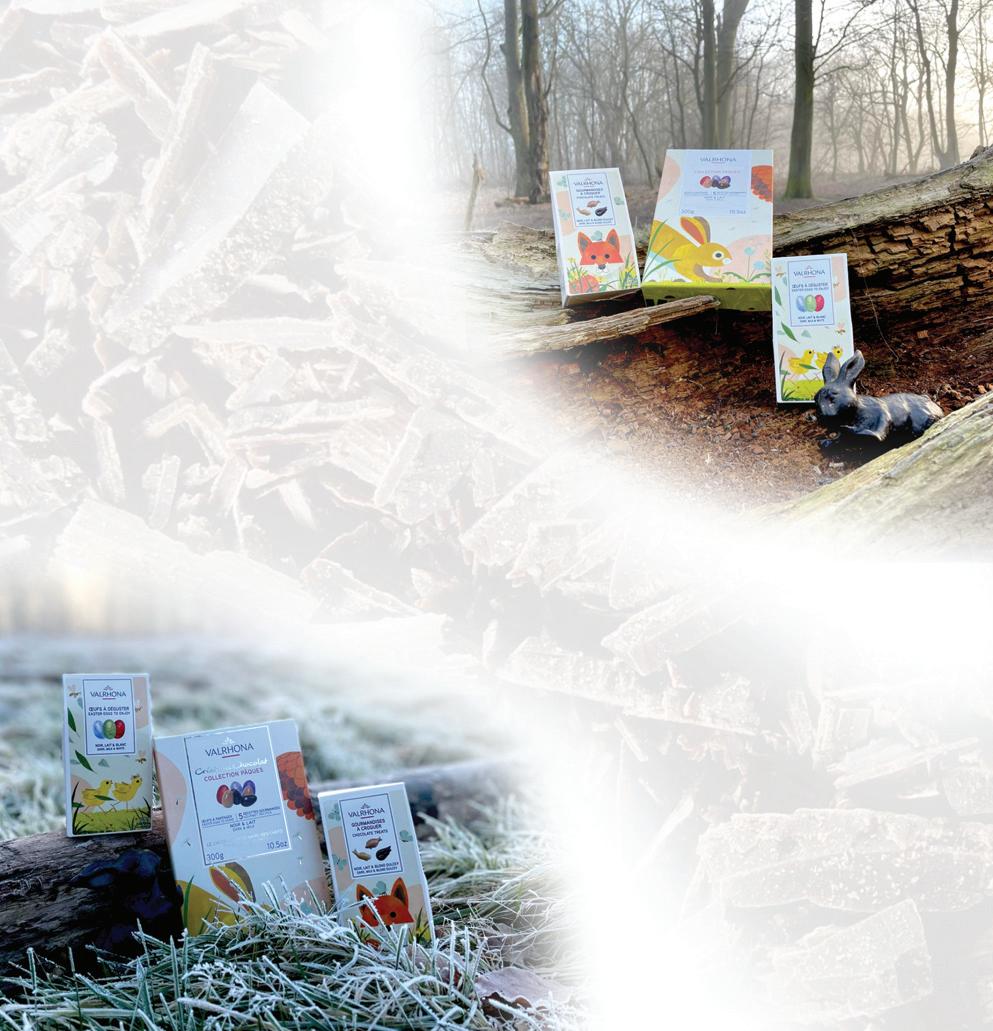
Interesting and unusual food and drink facts from around the world

Diospyros Digyna is a species of persimmon. It is also known as the chocolate pudding fruit due to it tasting like the sweet dessert when ripe.
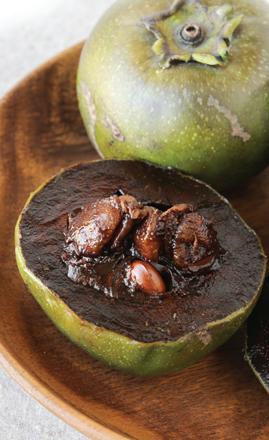
In 1759 Arthur Guinness boldly signed a 9,000-year lease on the St. James’s Gate Brewery to establish the iconic Guinness factory in Dublin.
Macaron Day was first founded in 2010 by Chef François Payard to celebrate the sweet treat. On the day, participating New York bakeries offered customers free macarons.

In celebration of its 50th anniversary, Schreiber Foods Inc cooked the world’s largest batch of macaroni and cheese. Weighing in at 2,151 kg, the super-sized meal was distributed to more than 2,000 people.
Jellyfish have no brain, heart or bones and consist of 95% water.
The world record for the most Cadbury Creme Eggs consumed in one minute was awarded to Peter Czerwinski in 2014. He successfully consumed six.

The world record for the heaviest carrot was awarded to Christopher Qualley in 2017 for his carrot weighing 10.17 kg.

The Ivory Coast is the largest producer of cocoa in the world, producing an estimated 2.2 million tons during the 2021-2022 crop year.

Marshmallows originated from the use of sap from the marshmallow plant in ancient Egypt. The recipe called for the sap to be mixed with honey and nuts.

The earliest record of the Easter egg in the UK was in 1873, produced by Fry’s of Bristol.

Betty Crocker is a fictional character, created by Washburn Crosby Co. Originally designed to add a personalised touch for responses to customer queries, the name was later turned into a brand.
Breadfruits are rich in starch, so when cooked they are said to taste like freshly baked bread.
There is no sincerer love than the love of food
– George Bernard Shaw –
Inside Food & Drink meets Ecolab’s Senior Marketing Manager UK & Ireland Christian Southall and Regional Marketing Manager
UKIE-Nordics Mark Wright

A trusted partner at nearly three million customer locations, Ecolab (ECL) is the global leader in water, hygiene and infection prevention solutions and services. Senior Marketing Manager UK & Ireland Christian Southall and Regional Marketing Manager UKIE-Nordics Mark Wright outlined the latest developments at Ecolab. Questions by Phil Nicholls.
To begin, could you please briefly introduce Ecolab to our readers?
With annual sales of $12 billion and more than 44,000 associates, Ecolab delivers comprehensive solutions, data-driven insights and a personalised service to advance food safety, maintain clean and safe environments, optimise water and energy use, and improve operational efficiencies and sustainability for customers in the food, healthcare, hospitality and industrial markets in more than 170 countries around the world.
Focusing on the food & drink sector, can you please outline Ecolab’s programmes and solutions for a healthier world?

Ecolab’s programmes and services improve upon the environmental performance of the customer’s plant or building, by reducing the amount of natural resources consumed (water and energy), emissions
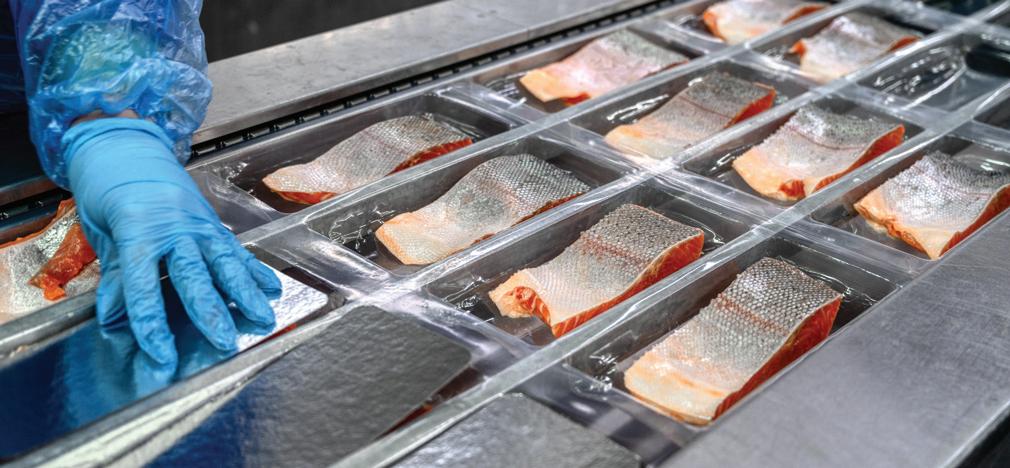
(both wastewater and gases) or waste. Our approach helps customers meet environmental standards and control environmental costs.
A safe food supply is essential for feeding the world’s growing population. Ecolab has unrivalled expertise in GMP food safety to help prevent food-borne illness throughout the supply chain, including the farm and animal health, food and beverage manufacturing, plus foodservice and food retail industries.
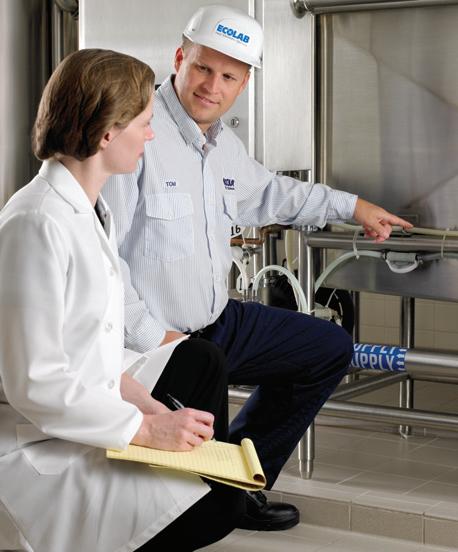
Food security is an important issue today. How does Ecolab contribute to food security across the global food chain?

During the pandemic, but also now during the current times of uncertainty, food availability cannot be taken for granted. Food prices for the consumer, but also raw material cost for the processor went up significantly.
This incentivises the reduction of food waste
Through improvements in hygiene management, Ecolab can help customers reduce quality-attributed food losses and maintain longer shelf life. For instance, the Ecolab digital solutions help customers to be more efficient in controlling deviations from defined cleaning procedures. This ensures a more consistent hygiene outcome which reduces quality induced losses and re-works, plus offers insight for continuous improvement towards food safety and quality.
Through expert consultancy in combination with our hygiene products we help customers to break cross-contamination pathways and make cleaning processes more efficient. Current utility cost of energy and the availability of water are major triggers that push processors to reach a next level of efficiency. Ecolab’s scope of expertise in water and energy management can significantly move the indicators without compromising on food safety.
The food & drink sector was hit hard by the global pandemic. How much do you feel this has altered public perceptions about food safety and global health?
Food safety has always been a prerequisite for customers. The general expectation is that food is safe to eat. People do not generally care about how the food gets to the store. They expect the food manufacturing company and the supply chain to provide safety measures for the people in the facility. During the pandemic, many of them had staffing issues mostly related to workers safety not food safety. Today, the public generally has increased awareness, due to the ability to detect and recover food safety hazards. Availability of rapid testing, much improved tracking of pathogens to the origin of a contamination and more stringent publication of recalls play-
essential roles in this. Increased awareness eventually impacts buying behaviour: trusted sources will be preferred, not only by the consumer, but also by all participants in the supply chain.
In most cases, viruses are not on the food safety list - even though they should be. Norovirus for example causes many infections and it is generally found on fruits and uncooked items. The corona virus has been reported to survive on packaging. Longer term this will impact the buying behaviour of consumers, but more imminently it has impact on the procedures, storage and selection processes of food processors, because they can take informed decisions.
Ecolab provides solutions to clients to minimise and eliminate contamination risks. This helps to prevent the spread of contaminations along the supply chain. Validated efficacy of hygiene products in line with worker safety and environmental requirements, plus expert guidance in how to apply them safely and effectively are essential elements to achieve this.
Inside Food & Drink meets Ecolab’s Senior Marketing Manager UK & Ireland Christian Southall and Regional Marketing Manager
UKIE-Nordics Mark Wright
In February, Ecolab launched the Innovation that Leads to Impact project. How would you summarise this project?
Our customers have come to expect Ecolab to develop innovations that improve their operations, reduce business risk, and lead the industry. With this in mind, we brought together the food and beverage industry to present our newest innovations.
Over the years, Ecolab programmes and services have helped clients:
•Ensure food safety
•Achieve operational efficiency

•Address public health concerns
•Reduce labour
•Lower environmental impact
•Save water and energy
•Extend the life of assets
•Reduce packaging waste
•Improve safety for employees and their customers
During the event we discussed several new innovations targeted towards applications for surface disinfection, drain disinfection, digital monitoring and versatile CIP (Cleaning in Place) disinfection, plus fryer and oven hygiene .
Could you please highlight the innovations you launched as part of this project?
Manual Cleaning Insights:
Track critical open plant cleaning parameters such as chemistry concentration and water temperature in an easy-to-read dashboard and receive exception notifications for quick action.
ExelerateTM Tufsoil
Ready-to-use heavy duty gel cleaner and degreaser designed to remove tough burnt-on soils that can withstand hot surfaces without drying for up to 90 minutes.
Drainspexx
Easy and reliable method for food producers to significantly reduce pathogenic microorganisms in drains, prevent cross-contamination on food contact surfaces, and support food safety.
Nodsan EAS®
Effective non-oxidising clean-in-place (CIP) disinfectant that can be used alone or in combination with alkaline or acid detergents.
3D TrasarTM Technology for CIP
3D Trasar is a diagnostic tool to verify every clean-in-place (CIP). 3DT identifies opportunities to improve CIP efficiency and provides the customer peace of mind that someone is monitoring their food safety risk 24/7.
Non-Rinse Disinfection
Surface disinfection range for food and beverage operations that does not need to be rinsed off from the surface saving time and water.
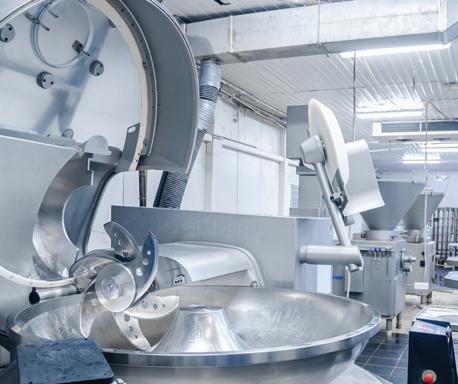
Sustainability is such a global buzzword. How does the Innovation that Leads to Impact project support customers’ sustainable operations?
Our impact is greatest in the work we do for our customers. By helping businesses enhance their performance while reducing reliance on finite natural resources, we reduce their costs and support their growth. Through digital technology, connected chemistry and other innovative solutions, we deliver economic and environmental benefits that make businesses more efficient, productive and sustainable.
Does Ecolab have any plans or objectives for the future that you would like to share?
By 2030, we aim to help our customers conserve 300 billion gallons of water per year by reducing consumption in our own and our customers’ operations. This equals the annual drinking water needs of more than one billion people.
Ecolab will also help to provide enough high quality and safe food to feed two billion people for an entire year, preventing 11 million food-borne illnesses. We aim to clean 90 billion hands and provide safe medical care for 116 million people each year, reducing more than 1.7 million infections.
Finally, we will help customers become carbon neutral by reducing greenhouse gas emissions by 6 million metric tonnes, preventing almost 10 million pollution-related illnesses.
What aspect of your job excites you personally?
Mark: I have a mission to create and develop engagement, connecting people to conversations that result in a collaborative effort to make a difference.
It is important to me that my impact goes further than words, and everyday my job allows me to do this; from being involved in sustainability circles, building cross functional networks, creating advocation through online platforms and social media, connecting customers to innovation and digital technology that drive change in both sustainability and new standards of food safety
This all makes for a rewarding environment.
Is there anything not covered by the above questions that you would like to share with our readers?

Technology plays a critical part in our delivery of service to customers, and we have incorporated new digital technology into both our associates’ service delivery, but also at the fingertips of our customers.
Our Bluetooth enabled monitoring system allows Ecolab to monitor rodent activity on a 24/7 basis on a customer’s site. Empowering our teams to quantify the rodent pressure at critical points across the site and respond accordingly. Never has this level of quantification and understanding been available and it is forever changing the pest landscape.
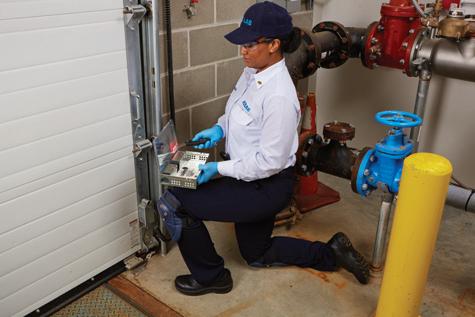
For an F&B production facility, to have the peace of mind their site is being monitored 24/7, can reduce the risk of product contamination, as Ecolab, through the power of data and insight, can act faster and smarter, to rid any rodent activity. All the data captured is also
available to our customers, via our online portal: MyEcolab. With both parties working in partnership, armed with up to date data, we work together to better understand the onsite factors, including the data insight, and together act more effectively and efficiently.
Ecolab’s service has always been delivered with an Integrated Pest Management (IPM) approach, but now through leveraging digital technology, a new layer of intelligence can be applied to IPM. Changing the pest landscape forever. n
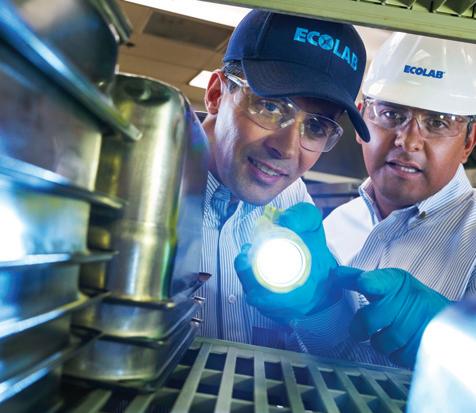


pré pain hobbs house bakery leipomo rosten oy wenzel’s the bakers
Dutch baker Pré Pain has 30 years’ experience supplying Europe with a delicious range of bake-off lines, including best-in-class french baguettes and petit pains. Commercial Director Gerben Vollenbroek outlined the company’s history and the ongoing series of innovations to enhance the product line, in conversation with Phil Nicholls.
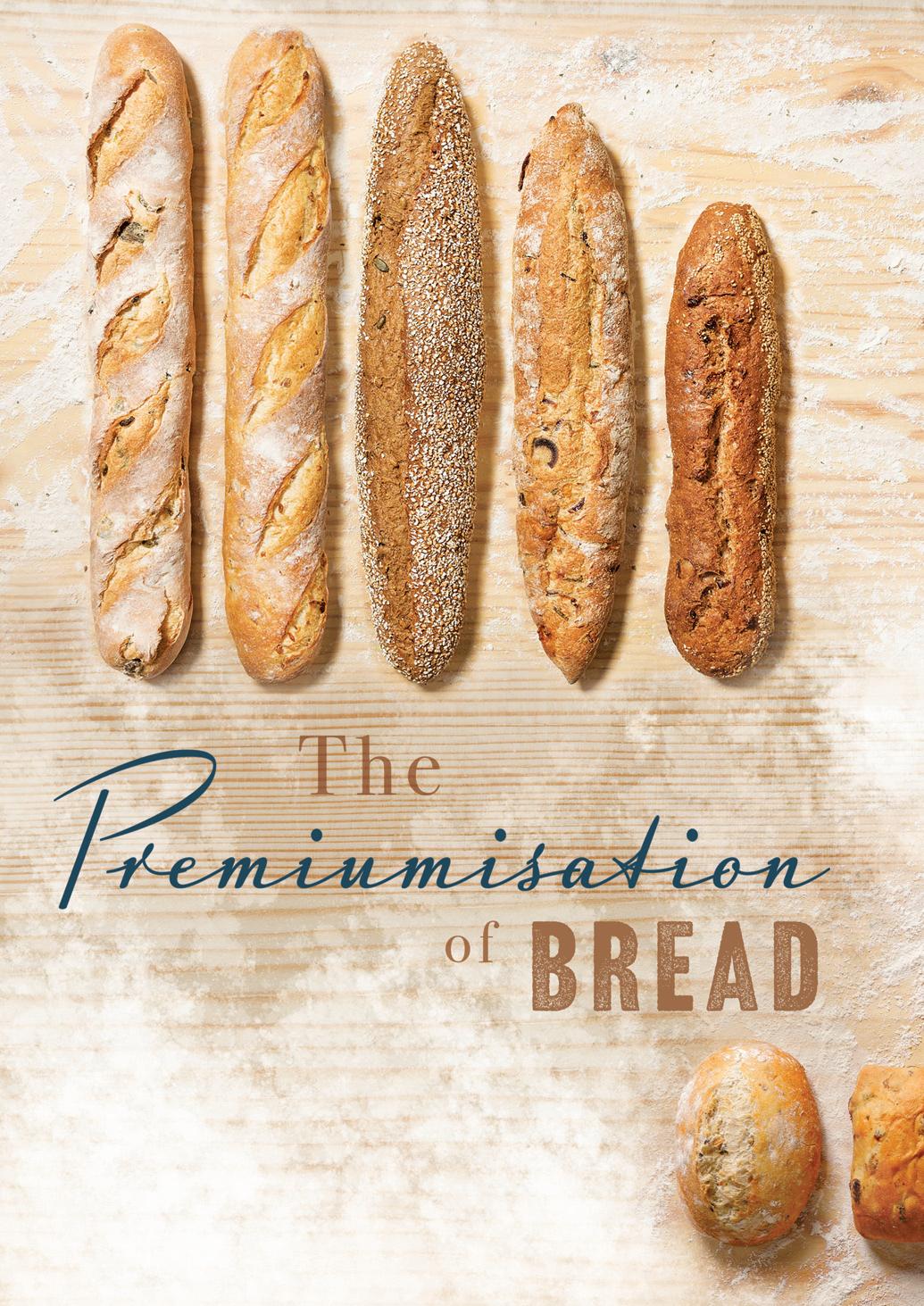
Pré Pain is working through a programme of premiumisation as part of its vision for the future. The company has state-ofthe-art bakery technology and years of experience, but this does not mean that Pré Pain is standing still.
“Our short to mid-term strategic aim,” explained Commercial Director Gerben Vollenbroek, “is to change our portfolio to a more balanced combination of top-quality commodity products on the one hand, and added-value artisan and premium products on the other. This combination allows us and our customers to accelerate growth whilst giving a superior consumer experience.”
Pré Pain’s founding company, Smithuis, started in 1889 as an artisan bakery in Oldenzaal. Smithuis created Pré Pain in 1992 as the first company in The Netherlands to produce ISB bread.
In 2014, Pré Pain established a stone oven line; one of the longest in Europe. In the following year, Pré Pain became a part of ARYZTA, the international bakery company. Further expansion followed in 2017 with the installation of a dedicated sourdough kitchen, then 2022 brought heavy investment in its french bread line with a stress-free dough preparation. The result of this investment programme is that Pré Pain now produces best-in-class french baguettes and petit pains.
T he company remains based at Oldenzaal in the east of The Netherlands, with eight production lines at the facility, five of them being mega lines. The factory has 220 employees, operates around the clock and enjoys BRC and IFS certification. Pré Pain supplies
customers in The Netherlands, Belgium, Germany, the United Kingdom, Ireland and around Europe.
“We have an annual capacity to produce 90,000 tonnes of product,” said Mr Vollenbroek. “Through 2022, Pré Pain created 650 million rolls, baguettes and loaves.
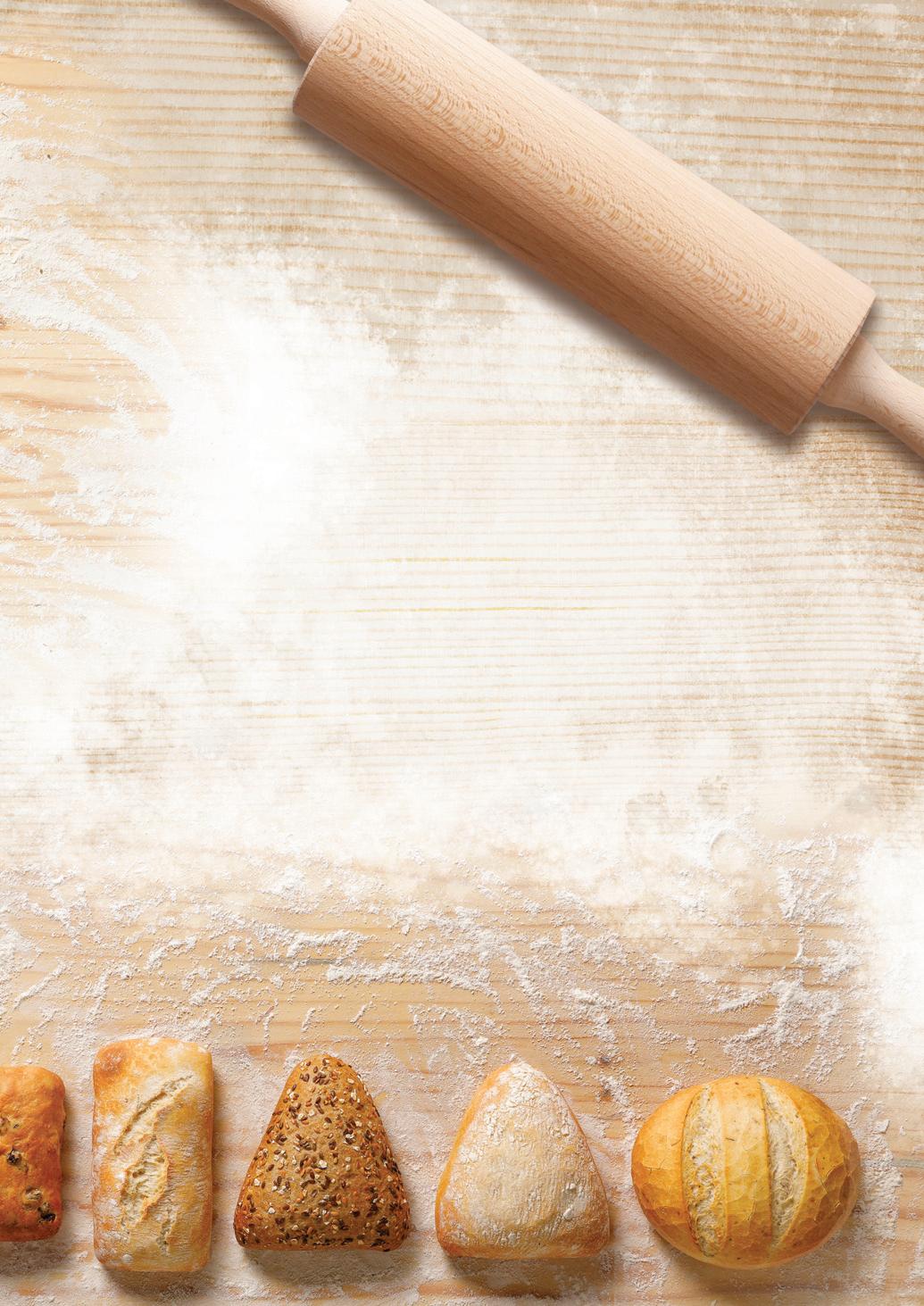
“Our list of biggest selling items includes french and artisan baguettes, kaiser rolls, artisan and italian rolls, plus a premium stone oven loaf that we produce for the UK market. In 2023, we expect our next generation french baguettes and petit pains to be among the biggest selling products.”
The extensive Pré Pain range of bake-off products are primarily delivered frozen however they still produce some ambient product for key customers. This portfolio is steadily being upgraded through the premiumisation programme.
“Our premium portfolio has three pillars,” Mr Vollenbroek continued. “Stone oven sourdough products baked with a living starter culture, next generation french baguettes and petit pains made with a stress-free dough preparation, and finally artisan bread, baguettes and rolls made with roasted and cooked seeds and kernels.
“In the future, we still want to serve our key customers topquality commodity bread, but our anticipated growth will come from this premium portfolio, as we wish to lead the market in innovative and speciality bread products.”
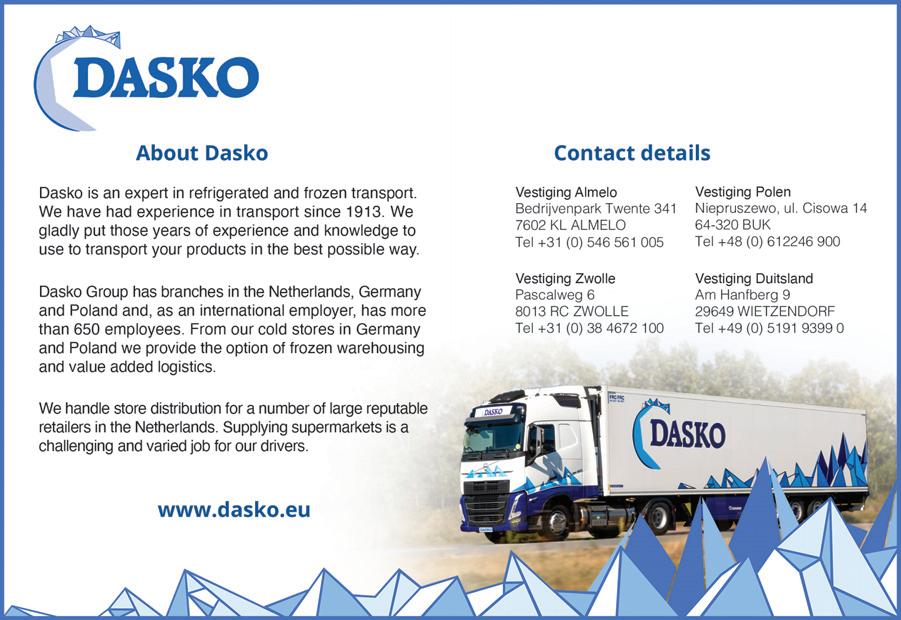
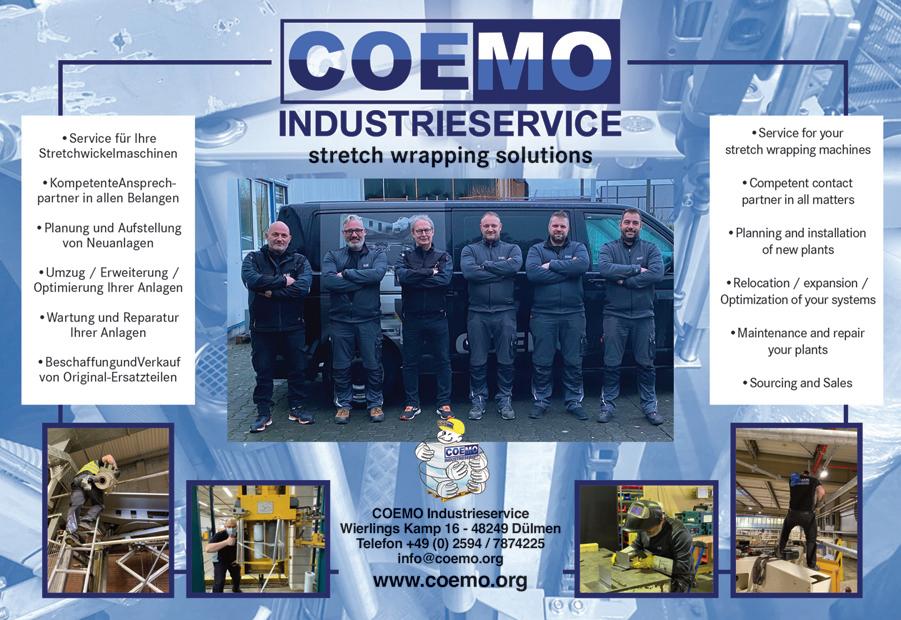
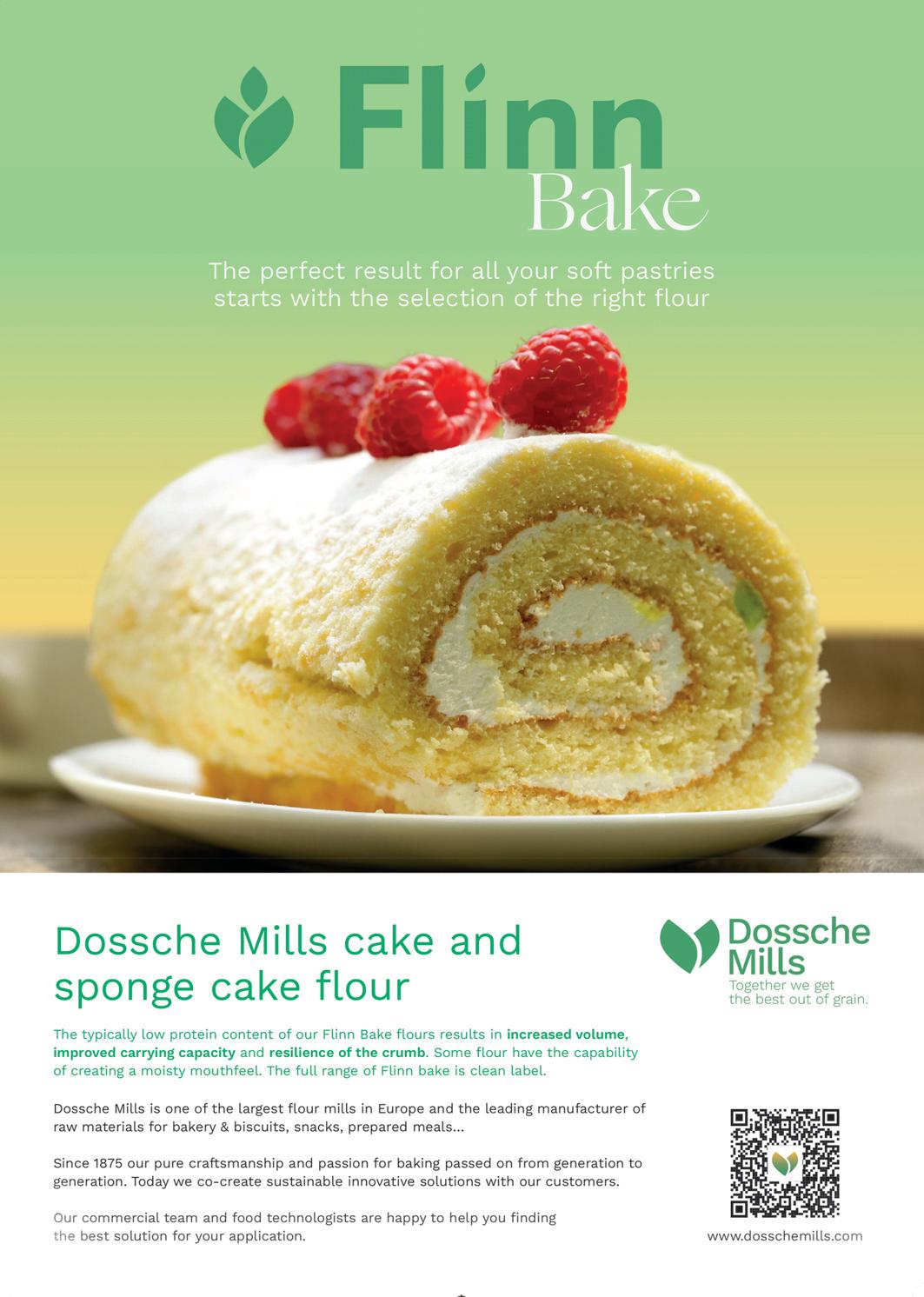



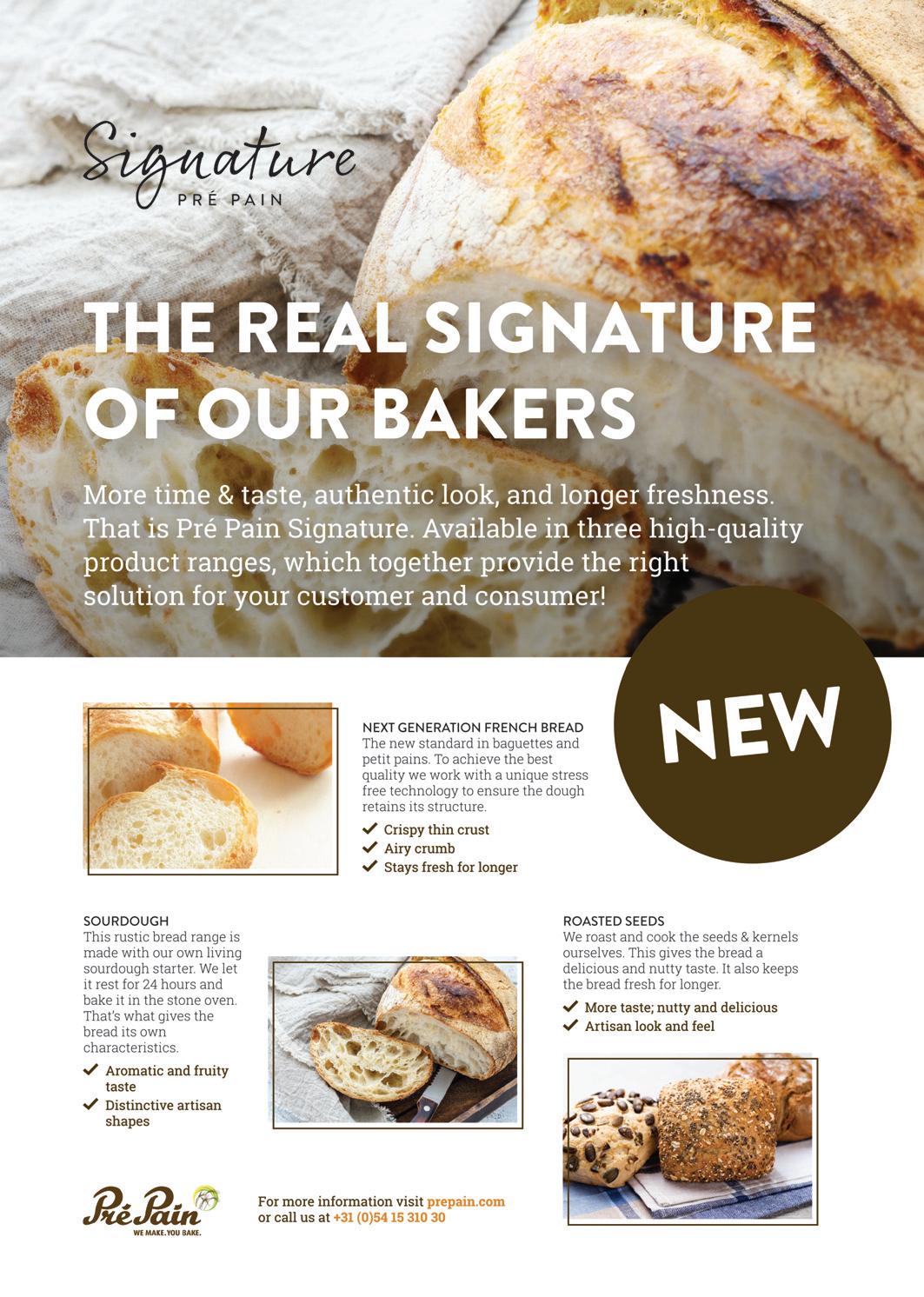
As a market-leading bakery, Pré Pain maintains an ongoing investment strategy to consolidate its position and ensure quality products for customers. “We recently invested in machinery to allow us to roast and cook seeds and kernels, which are then entered directly into the dough, to ensure the best possible taste for our breads and rolls,” Mr Vollenbroek explained. “Later this year, we will take delivery of a new machine that will allow us to produce a new range of rolls in many different shapes and sizes, to accommodate the wide range of requirements from our customers. These ongoing investments all support the growth of our premium product portfolio.”
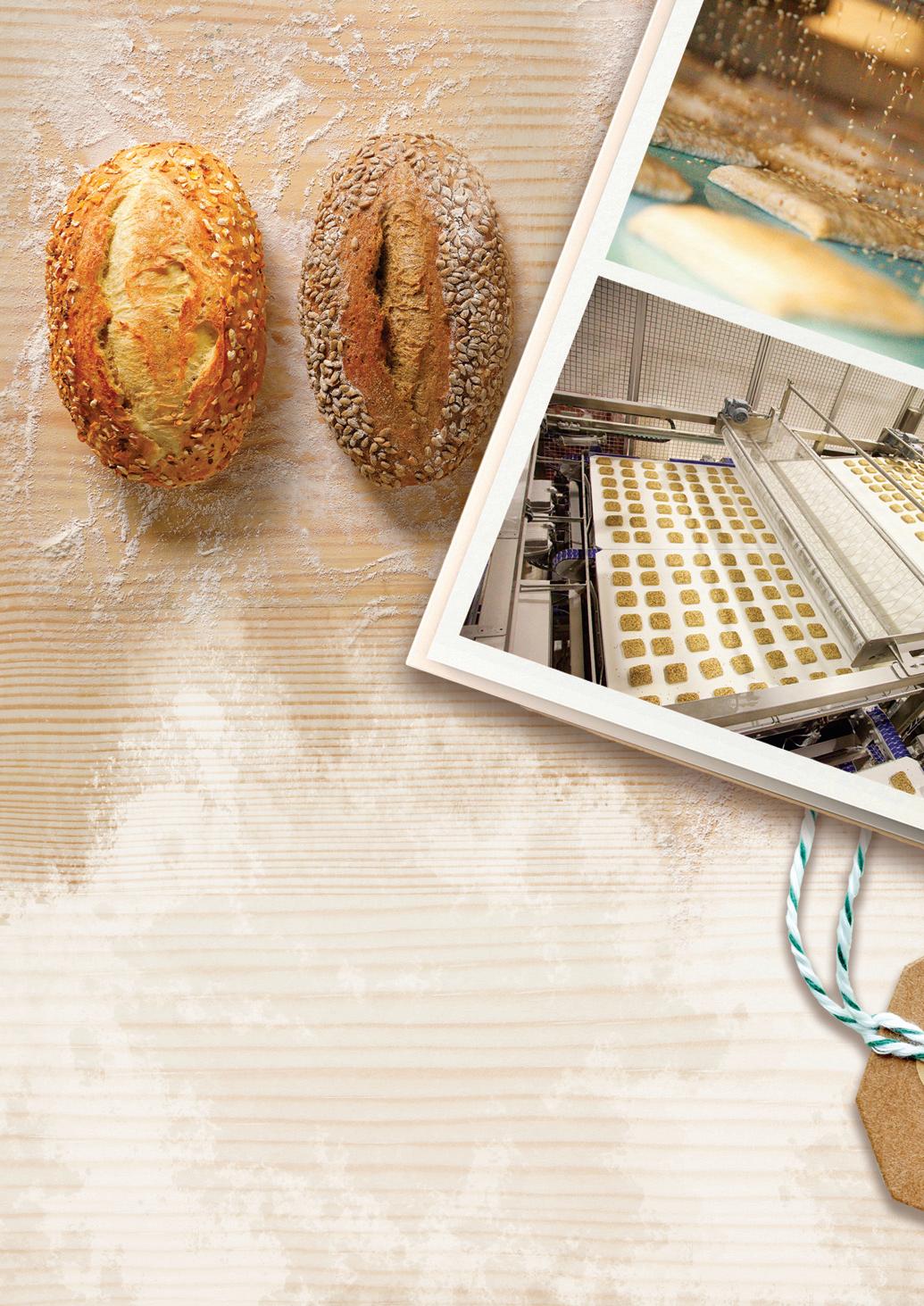
Across the broad Pré Pain portfolio, there are many features which help the company stand out from the competition. Pré Pain is one of the very few industrial bakers to make sourdough bread with a living starter culture, giving its bread a unique taste. Also, the roasted seeds concept gives a delicious nutty flavour to Pré Pain’s bread.
Alongside these unique concepts, Pré Pain also operates in a highly efficient manner, enabling it to make very affordable high-quality products.
“We are alone in this part of Europe in our ability to make the quality of the next generation french baguettes and petit pains that we are now able to bake,” Mr Vollenbroek said. “The features that set these items apart from our competitor products are the light airy crumb, a very thin crispy crust and the fact that the bread stays fresh for longer.”
Pré Pain works in close cooperation with suppliers and partners, collaborating with key customers to co-develop new concepts and lines. This process involves a shared vision to initiate new product development and achieve category growth.
“Our partners are crucial to our success,” explained Mr Vollenbroek. “We have our own innovation team and an
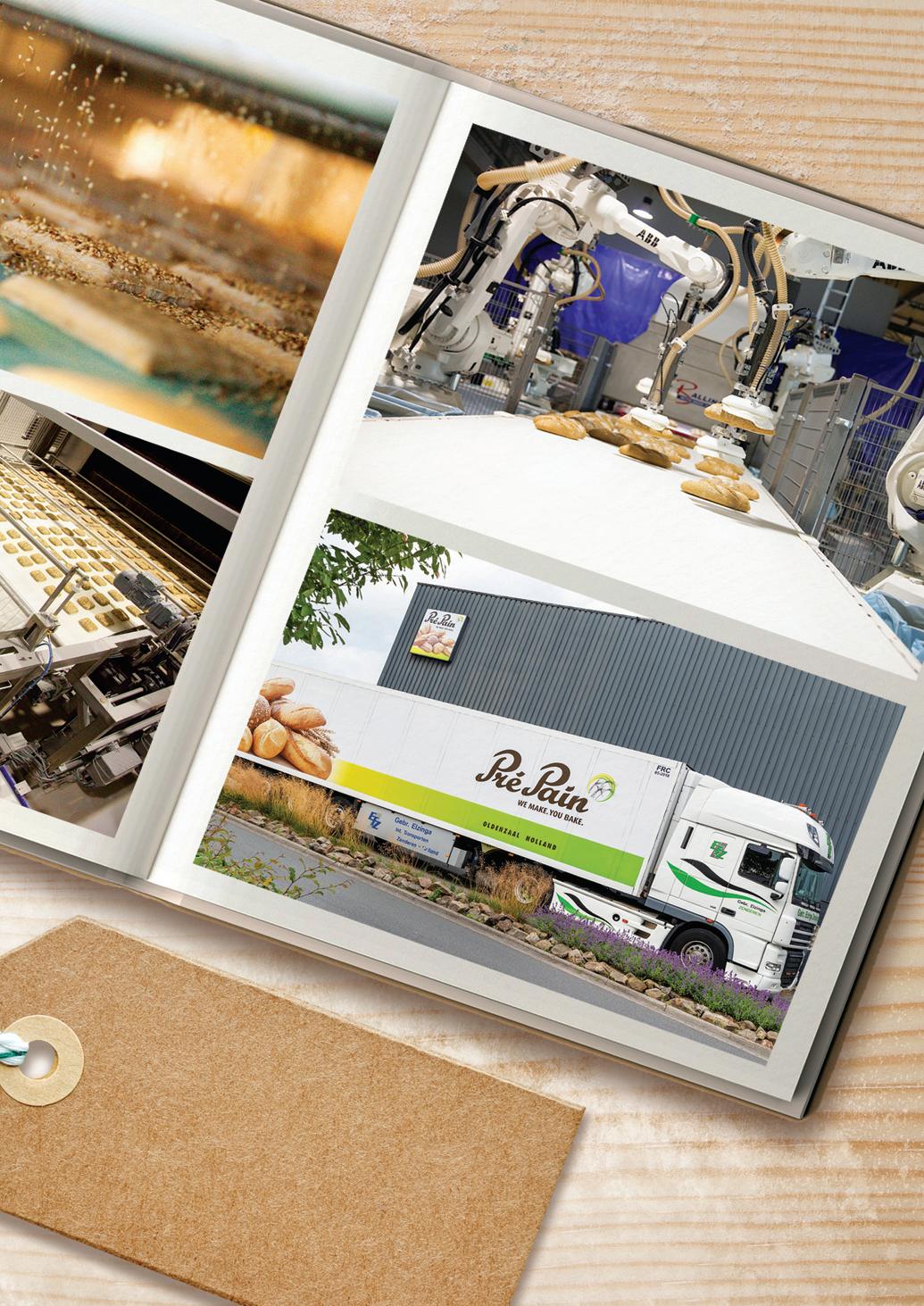
industrial“PréPainisoneoftheveryfewbakerstomakesourdoughgivingbreadwithalivingstarterculture, itsbreadauniquetaste”
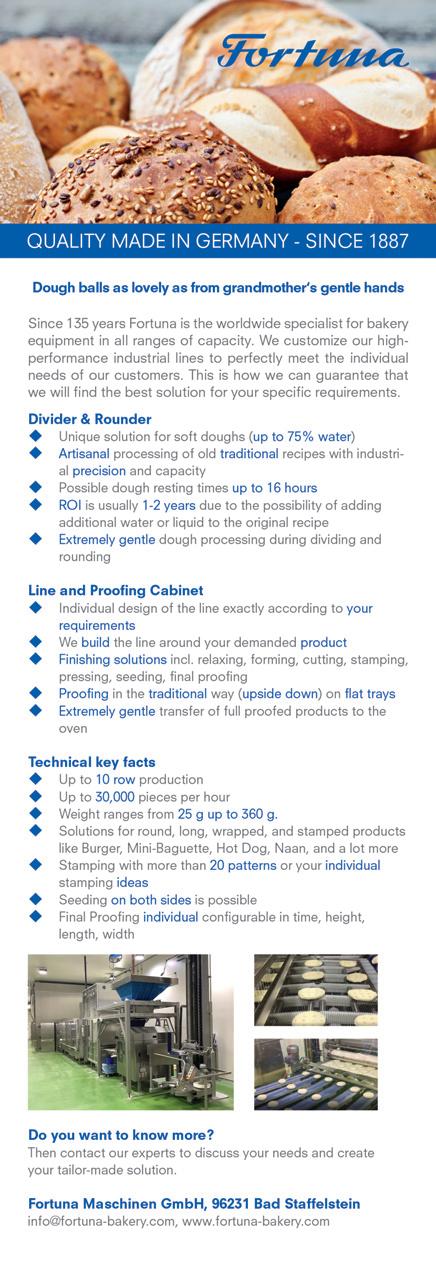
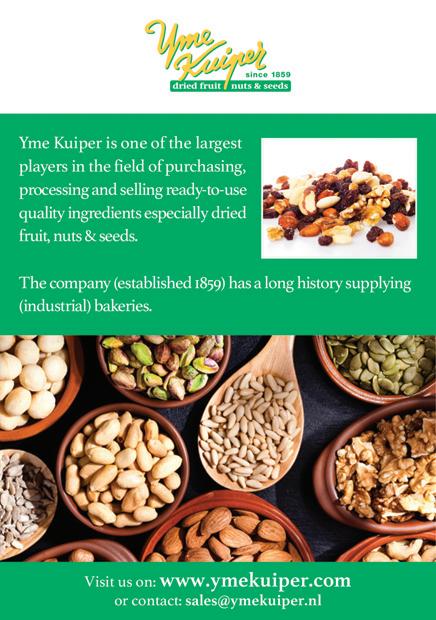

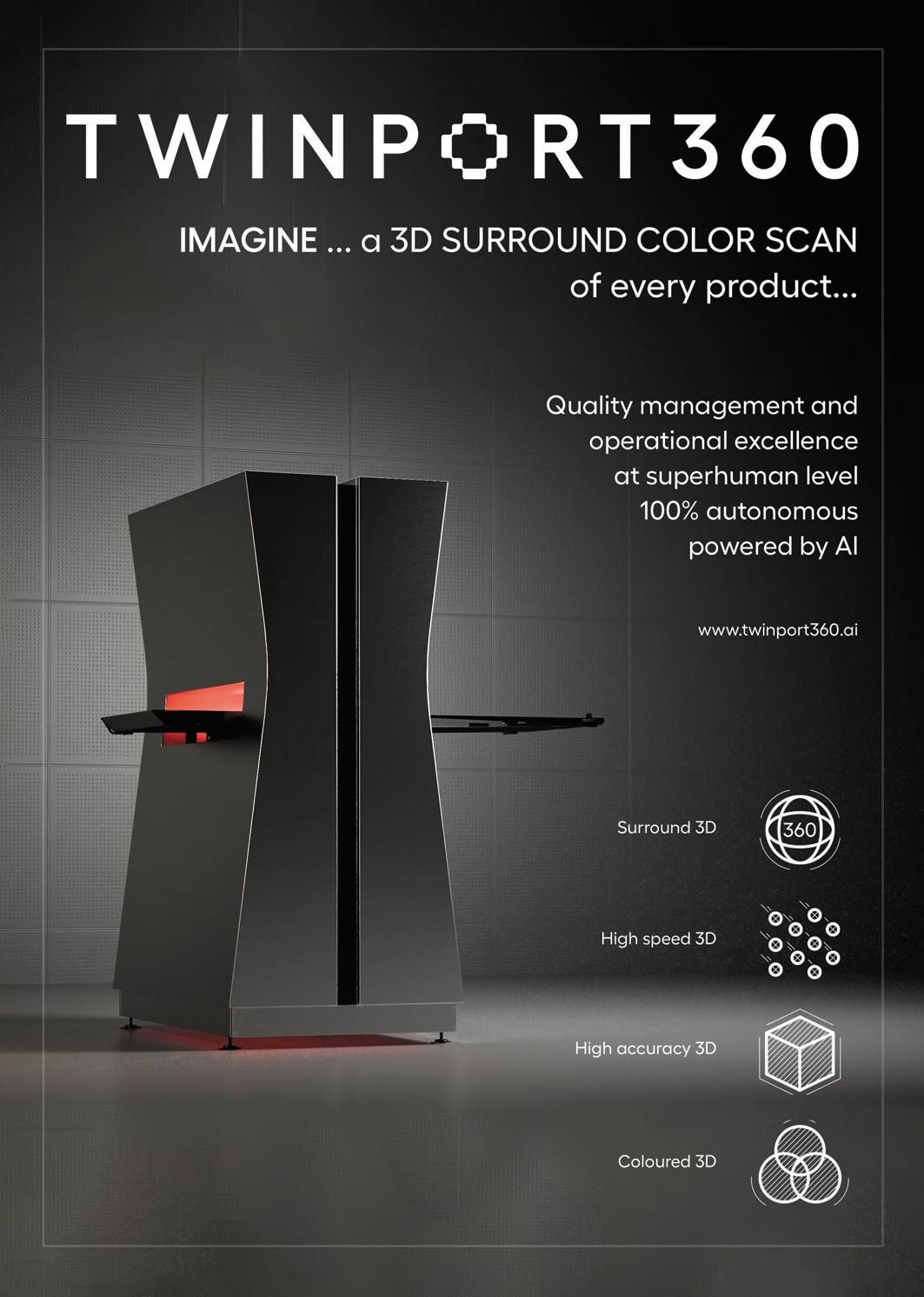
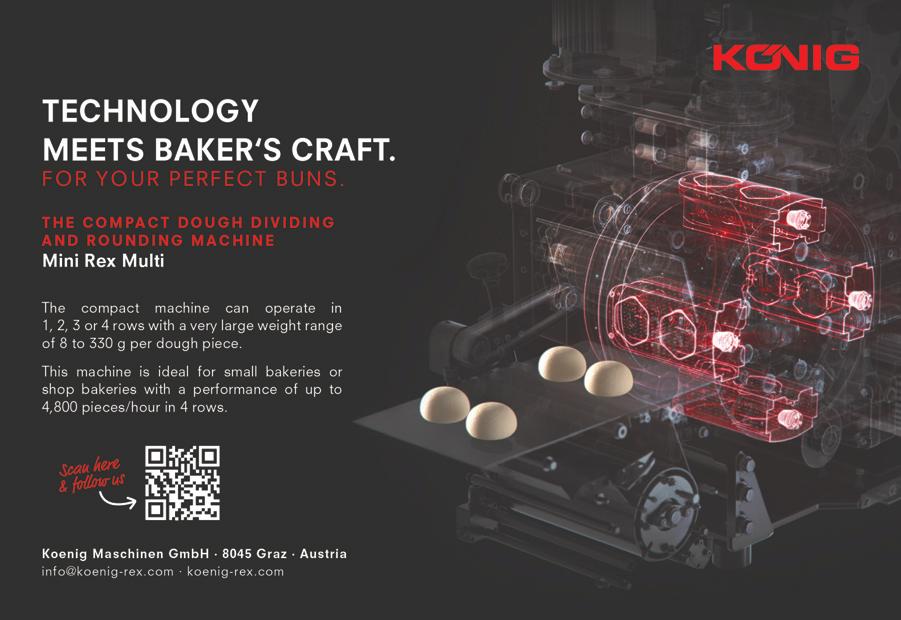
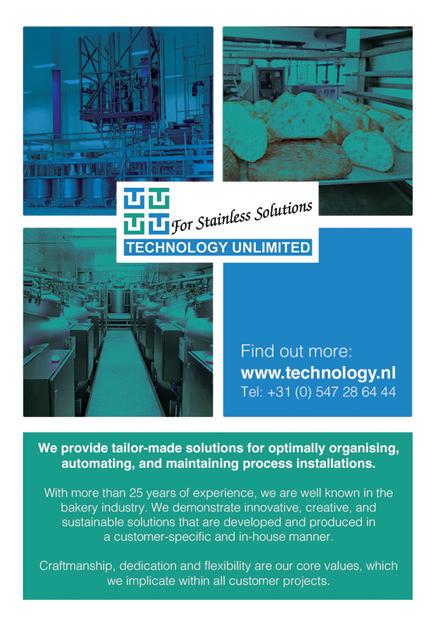

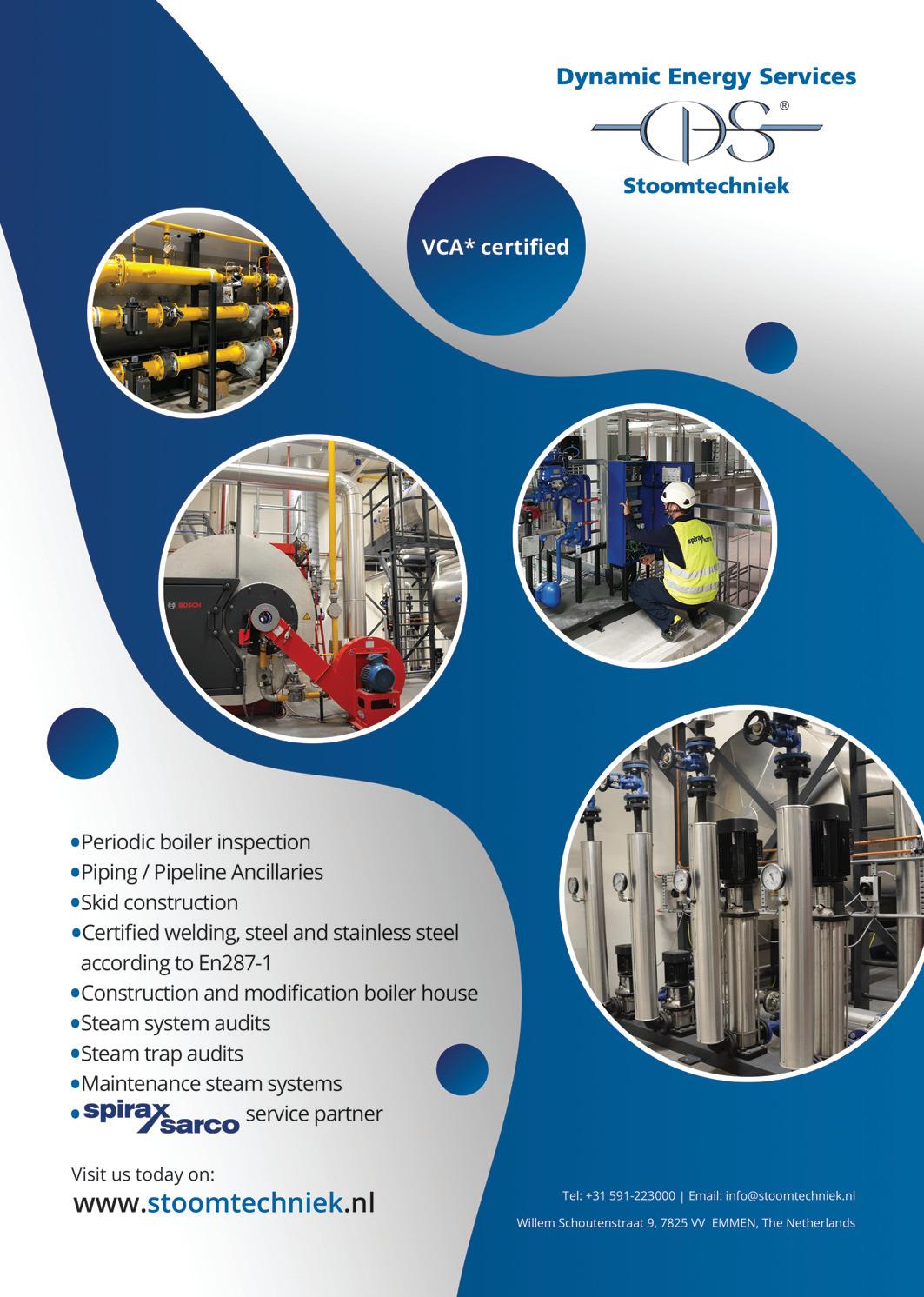
in-house test bakery that cooperates closely with customer teams. We also rely on our supply partners to share new and best practices, helping us to continue to improve what we do.”
Continual improvement is also a feature of Pré Pain’s sustainability programme. The company builds environmental efficiencies into its everyday operations and supply chains. This involves a particular focus on reducing its carbon footprint and all types of waste, notably food and packaging, plus a drive to improve the company’s water usage.
“At Pré Pain, we have installed a rework machine on our biggest line,” Mr Vollenbroek said. “With this machine, we reuse finished breads that have been disapproved due to size or shape, then
recycle them to make new breads, significantly reducing waste. In conjunction, we are making our cooling and freezing equipment more sustainable by increasing energy efficiency.”
While the bakery industry was negatively affected by the recent global crises, bread will always remain an important product for customers. Pré Pain’s strategy of growing with premium products is expected to unlock opportunities to gain further market share in the coming years. The challenge remains to find the right skilled workforce for this premiumisation journey –people such as bakers and technicians.
“We are already executing our strategy to premiumise our portfolio,” explained Mr Vollenbroek. “For the future,
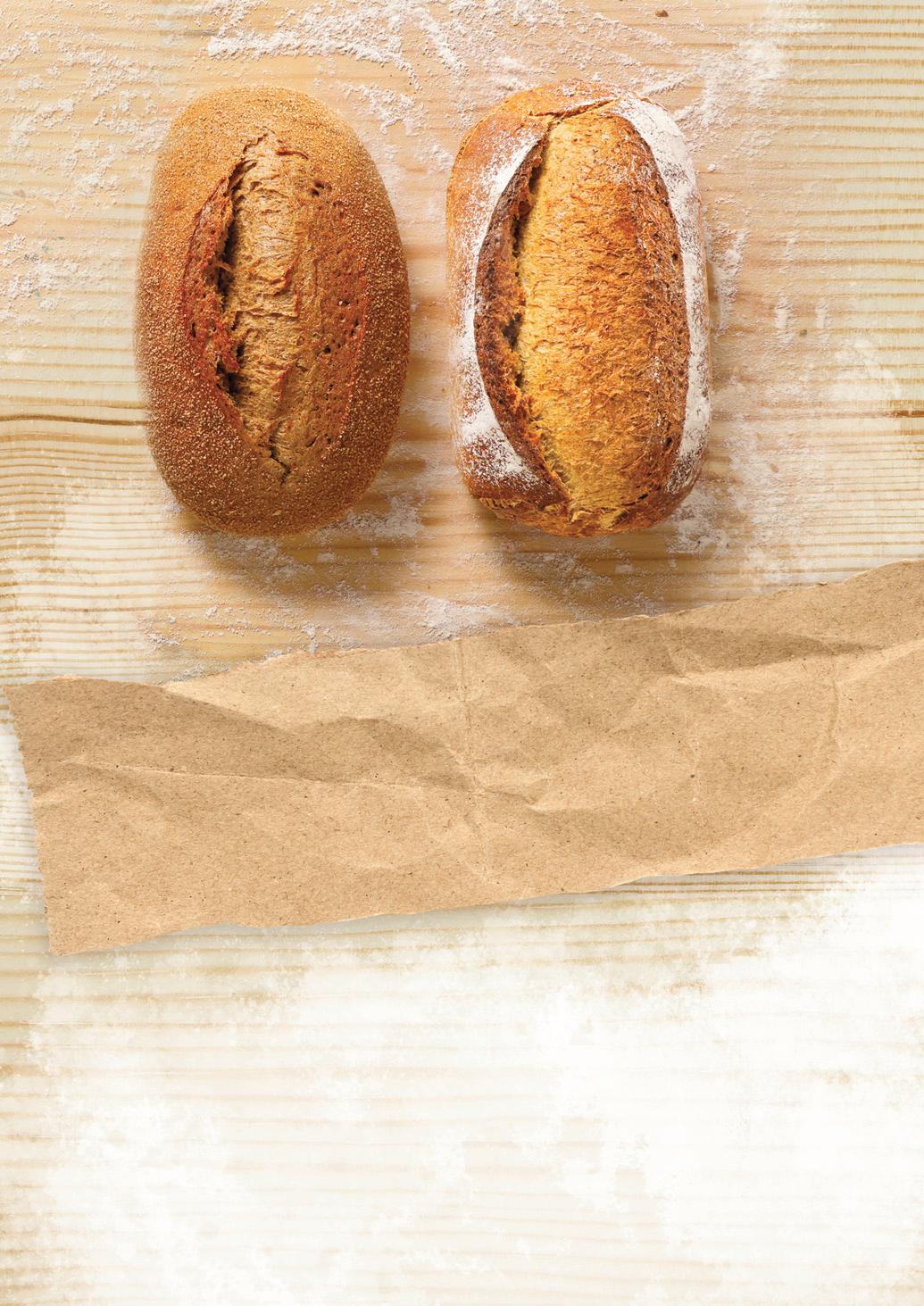
“What excites me is when I see Pré Pain introduce new and successful products into a supermarket or a restaurant; fresh items that help our customers achieve their business goals”
we are looking at investing in new lines that support this growth. We want to further roll out our unique concepts of next generation french bread and stone oven sourdough bread, plus our lines featuring roasted and cooked seeds and kernels.
“Our mission is to serve inspiration,” he concluded. “We work very hard every day to help our customers grow their ISB sales line and, in turn, provide their consumers with tasty and nutritious bakery products. What excites me is when I see Pré Pain introduce new and successful products into a supermarket or a restaurant; fresh items that help our customers achieve their business goals.”
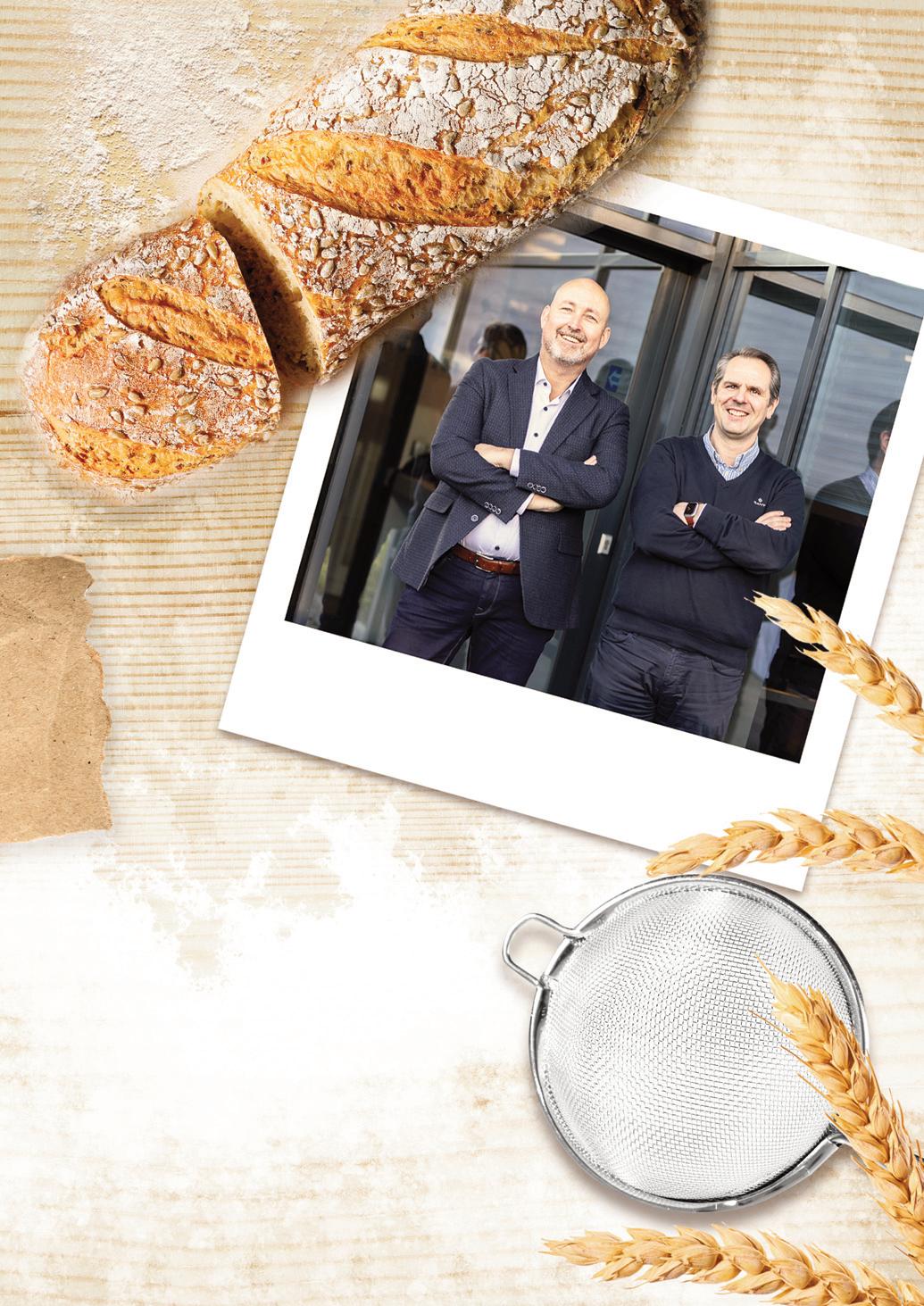
Hobbs House Bakery has been quietly flourishing, pioneering its way through bread baking across a history stretching back to 1920. A name that still conjures quality, innovation and satisfying taste, the fiercely independent business continues to thrive through the talents of brothers Tom and Henry Herbert. Andy Probert sat down with Henry to discuss the company’s desire to 'green-up' its expansion plans, and the true meaning of sourdough.
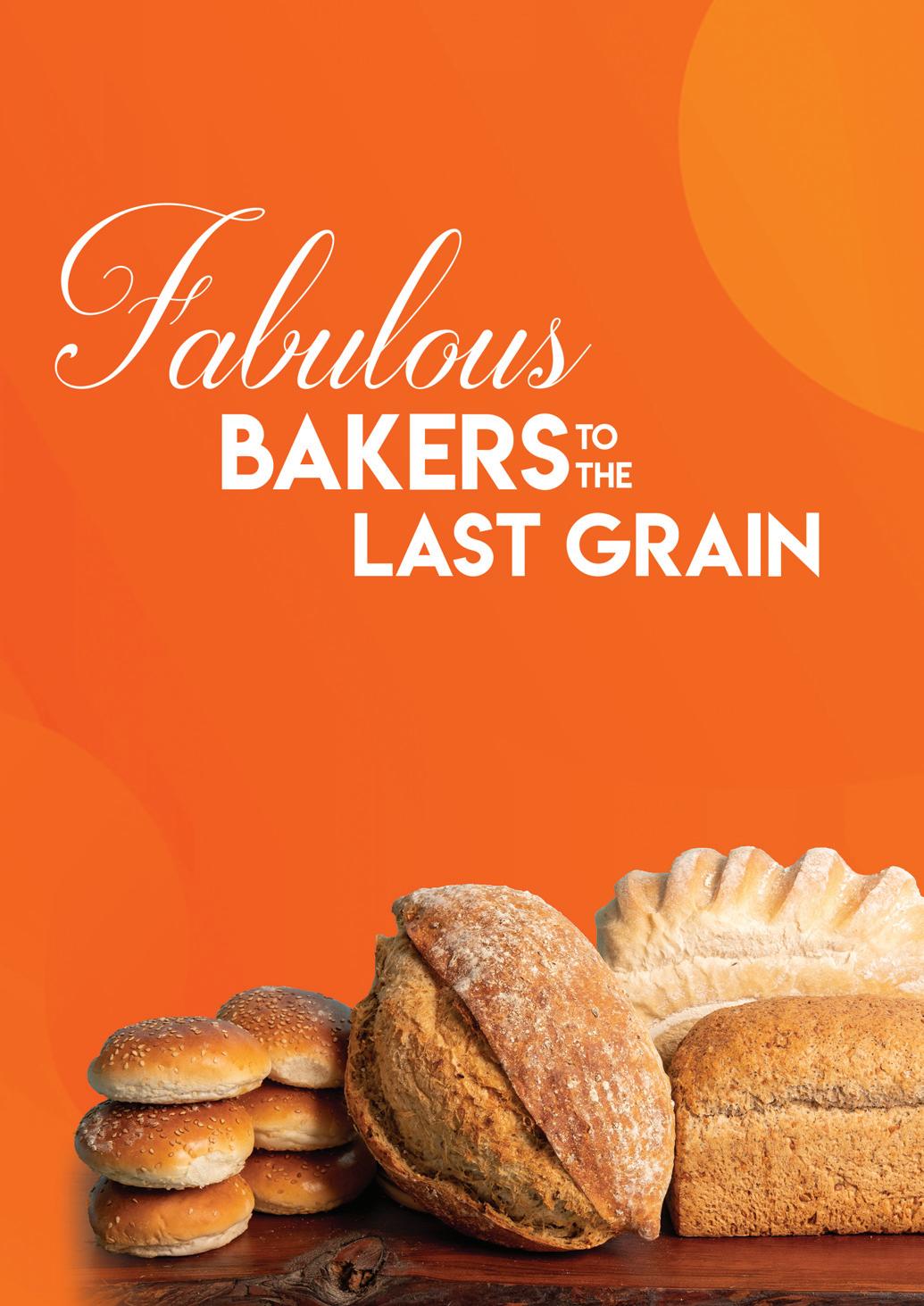
Henry Herbert is passionate, as he hammers home the truths of shouldering a five-generation hub of innovation with his brother George, the desire to de-mystify what ‘sourdough’ is – and a commitment to bring sustainability to the table.

From their Hobbs House Bakery HQ, located in the Cotswolds in Chipping Sodbury, the brothers enjoy the views of quintessential English countryside. But look closer, and the brothers’ environment is one of industriousness, urgency and no lack of forward planning.
“We remain a fully independent family business, with a pipeline of family members coming through,” said Mr Herbert. “What sets the bakery apart is having very clear strong core values indelibly stamped at its heart.”
The bakery employs 160 people and operates five shops, one in Bristol and four in the surrounding market towns of Chipping Sodbury, Nailsworth, Malmesbury and Tetbury. The business has taken on more wholesale customers, a mix of hospitality and resellers, such as country shops, delis and retailers. “We have seen massive growth on this front in the last decade,” explained Mr Herbert. “We are good at making bread to a high standard. Wholesale now represents 85% of our business.”
The company operates two business models: with fresh products delivered within 25 miles of its production hub, and a frozen range
for customers nationwide. “We offer a consistent 24/6 baking operation, and bake between 130,000 and 150,000 units a week,” he added.
“We see ourselves as custodians of a business, building a legacy with a long-term view. Our team is an extended family, the customers our backbone. We are a growing bakery, but with strong family values driving its soul. We are not dazzled by the bright lights of fast profit and rapid growth.”
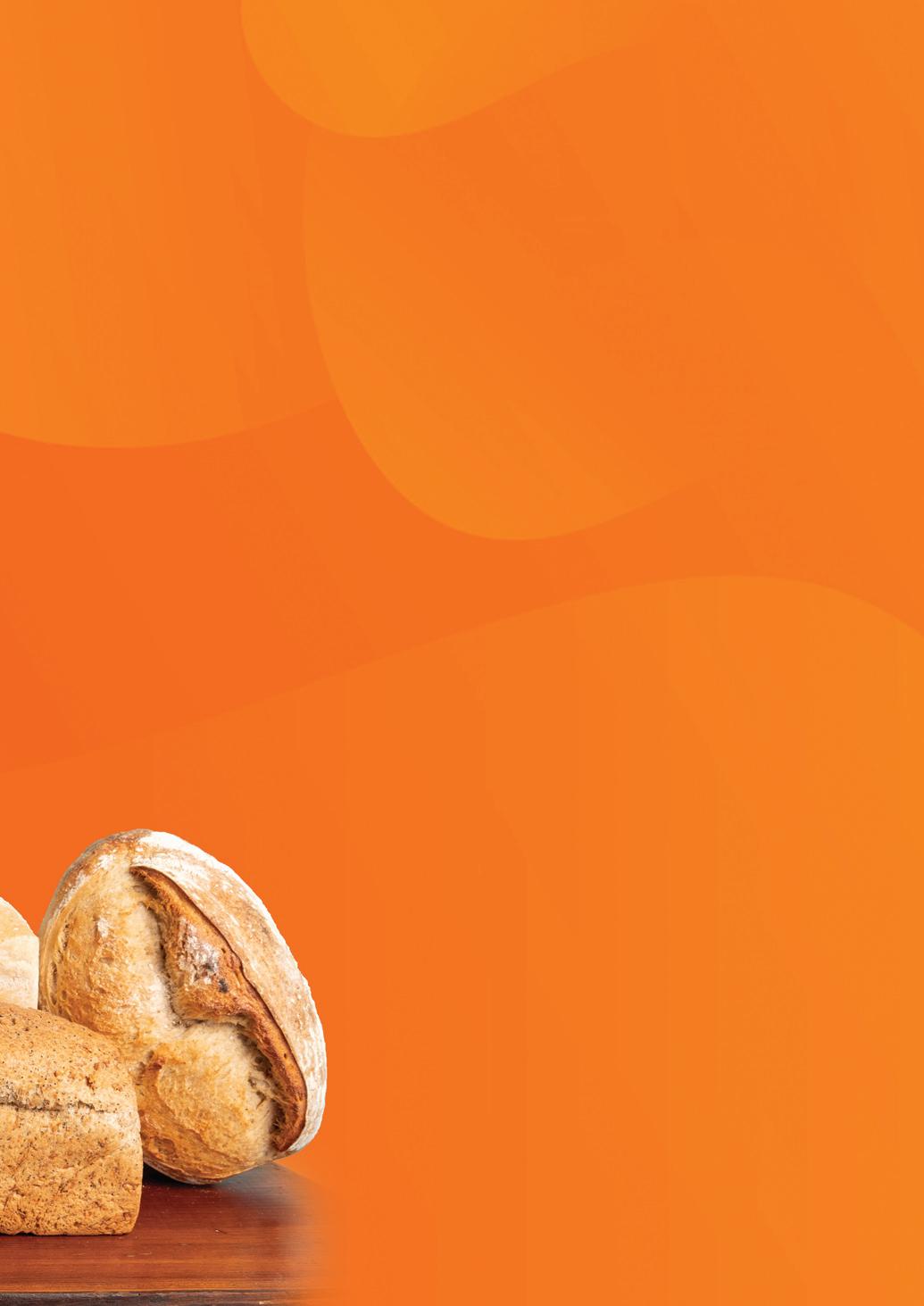
With the production hub spread over nine facilities on one site, the bakery is looking to expand and maintain its 10% year-on-year growth of recent times. It has signed a 20-year lease for the site and taken on an additional 10,000sqft, taking its total footprint to 30,000sqft.
“We are rebuilding the bakery,” Mr Herbert explained, “which is about three-quarters done. It will cost about £2 million, but once complete, it will set us up for the next 20 years.”
Hobbs House Bakery began life when a blacksmith hit hard times. He was persuaded by his wife to hang up his leather apron, swap it for a linen one, and learn to bake bread. He began to make bread with less yeast and started using the 'overnight' method, which the family uses to this day.
The business thrived, and in 1970, baked Bristol’s first known organic loaf. The family continued to move with the times, culminating with their Olive Loaf winning two stars at the illustrious Great Taste Awards in 2020. It has perfected baking one of its most loved loaves, the mighty Organic Wild White Sourdough. With a flavour-filled crust, a moist and chewy centre, and an irresistible sourdough taste, the loaf is slowly risen for 14 hours and made with their nearly 70-year-old Sourdough recipe. For the past two decades, the Herbert brothers have continued pushing the frontiers of baking, as well as finding fame on the Channel 4 television series The Fabulous Baker Brothers, showing how anyone can bake.
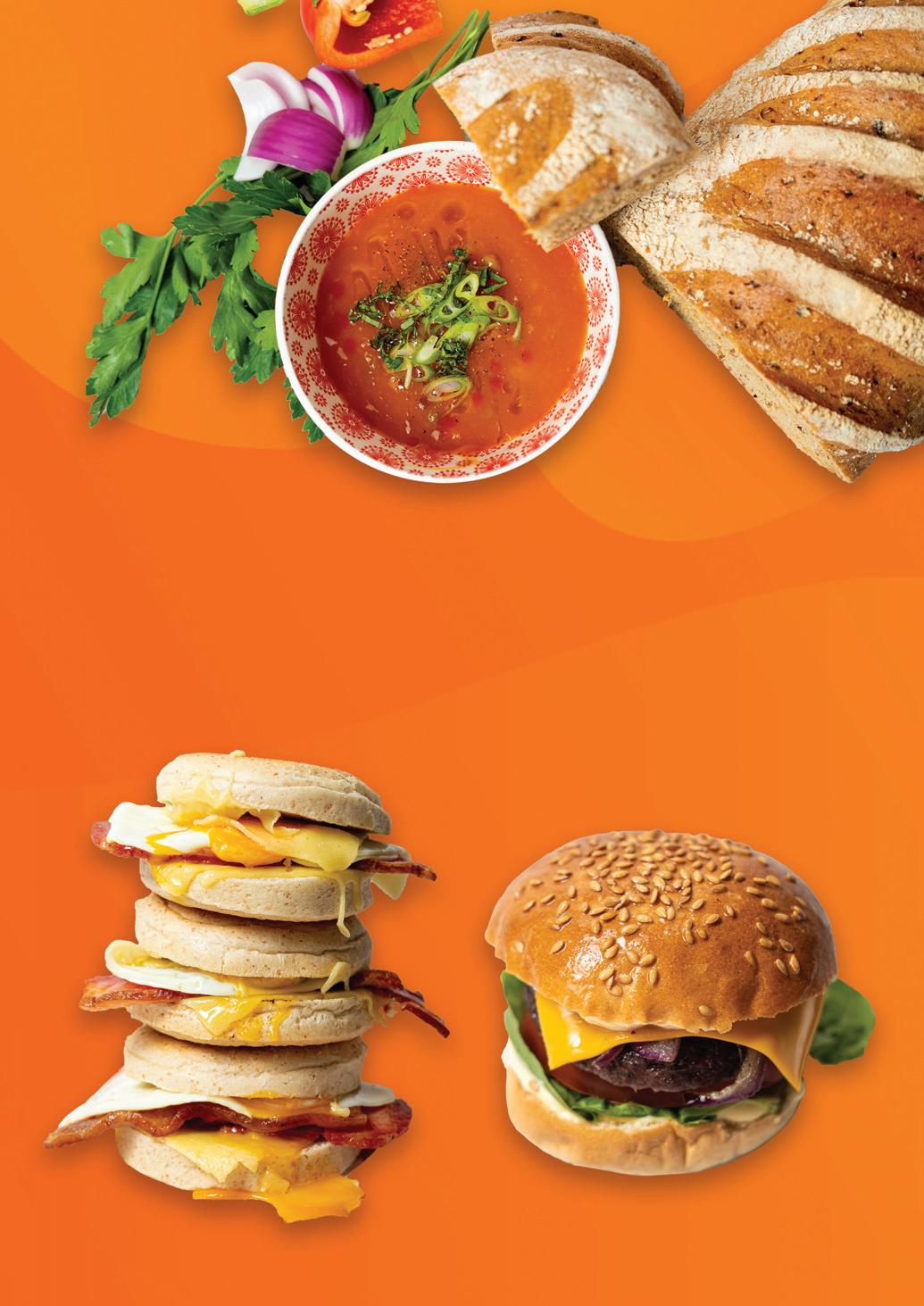
In 2019, the bakery became the first in the UK to become a Certified B Corporation. This accreditation proves it meets the highest social and environmental standards for people and the planet.
“Community and sustainability have been at the heart of our business since we baked our first loaf of bread over 100 years ago,” Mr Herbert said. “Now, through the B Corp accreditation, we have the stamp to prove it, and this validates what we stand for.”
Hobbs House Bakery’s charitable efforts range from donating 250 loaves a week to the local community to a ‘buy one, give one’ initiative in, which one loaf is donated to children in Tanzania for every gluten-free loaf sold. The bakery has removed all plastic packaging for its online orders and works hard to eliminate waste, such as using leftover croissant dough to make cinnamon buns.





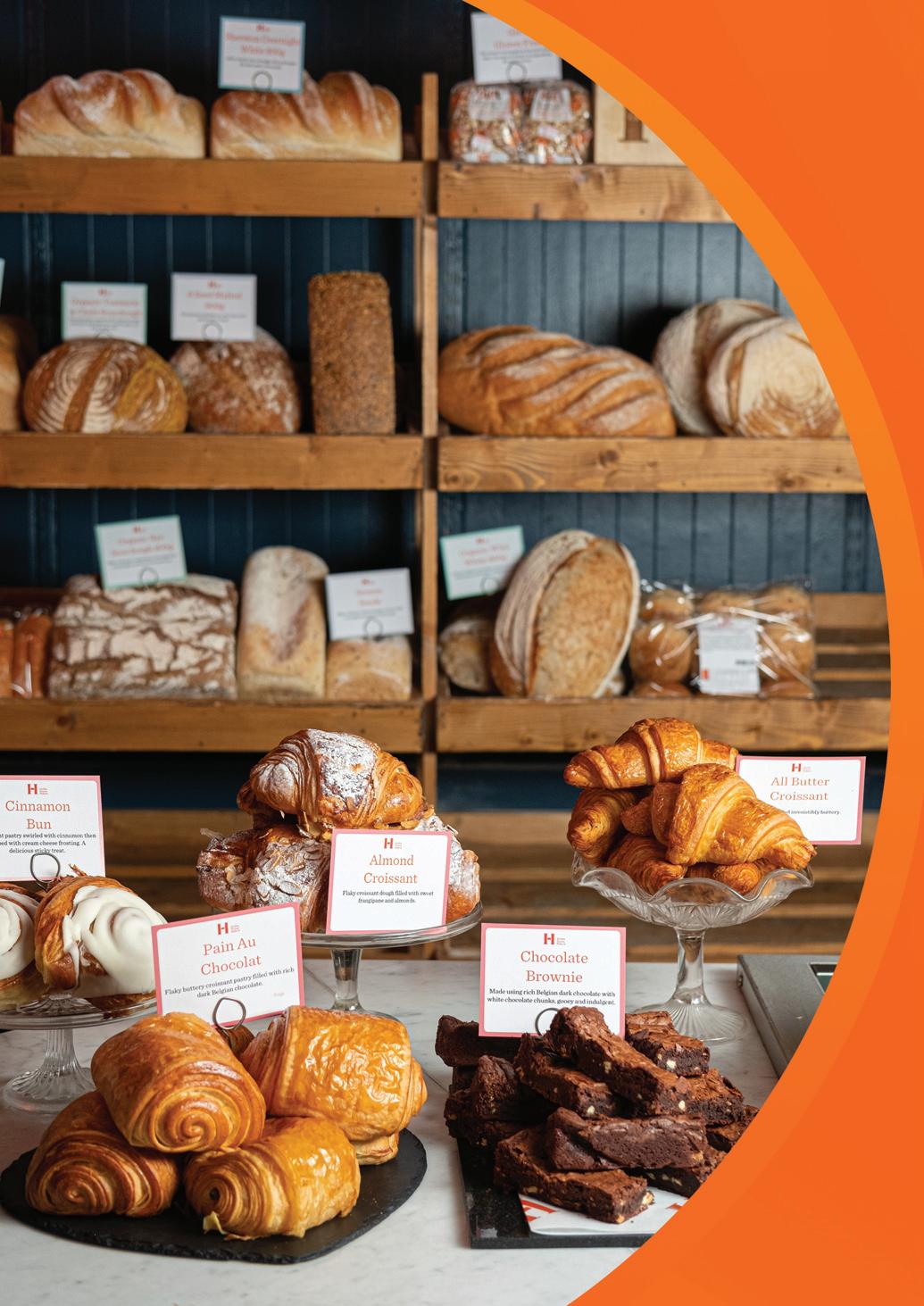
The company’s most important ingredient, flour, is sourced from Shipton Mill, 15 miles away from the bakery. “We have worked with the mill’s owners for over four decades,” added Mr Herbert, “and we mirror their sustainability, provenance and quality values.”
The company now issues regular impact reports assessing its carbon footprint and environmental goals, according to Mr Herbert: “We have assessed our suppliers and been on a real journey to understand our farmers and miller. This has led us to look at regenerative agriculture, and there’s a good network of local producers who want to farm differently.”
While the bakery has set targets to reduce its carbon emissions to net zero by 2032, it has ambitions to source 95% of its flour from ‘healthier and fertile soils’ within a decade.

“Our flour processing produces around 60% of our carbon,” Mr Herbert explained. “The bakery needs grain for flour; our priority is to find and use flour from well-farmed grain and not damage the soil in which it is grown.
“We are trialing recipes made with better local grains while learning the impact this will have on our processes and products. It will lead to better-tasting products that are good for our planet, our communities and our bodies.”
To counter labour shortages, Hobbs House Bakery has developed in-house training to enable apprentices to become fully-fledged bakers, as Mr Herbert described: “We relied in the past on local bakers, but that resource dried up. Our apprenticeship scheme comes with a long-term view to invest in today’s youth and enable the business to grow sustainably by having a pipeline of talent.
“We remain a people-first company by looking after each other, ensuring we offer quality products that never under-deliver, and respect the ingredients so consumers will fully enjoy the results.”
This feeds into the bakery joining other artisan and independent bakers under the Real Bread Campaign to re-assert the true meaning of ‘sourdough’ and ensure consumer clarity in food labelling.
“We are advocates for true sourdough,” Mr Herbert concluded. “Sourdough is bread in its purest form and begins with a starter, a living wild yeast culture used to raise the bread. Ours has been used and replenished daily for several decades. A loaf not made using the proper method and called sourdough is highly misleading.
“It’s obvious we care about what we do. We will never fall into the trap of adding preservatives and additives to our bread. The family legacy has lasted more than 100 years, and we will never sacrifice our craft and artisanal skills.” n
Leipomo Rosten Oy is a family affair; now under the ownership of the Meltovaaras, the company has been a success since 1939. As the third biggest bakery in Finland, the company has created a unique range of seed-based products, including its notorious Seed Crispies and SeedBoosts. Marketing and Export Director Veera Meltovaara discussed the company’s delicious offerings, and the company’s future plans, in a report by Imogen Ward.
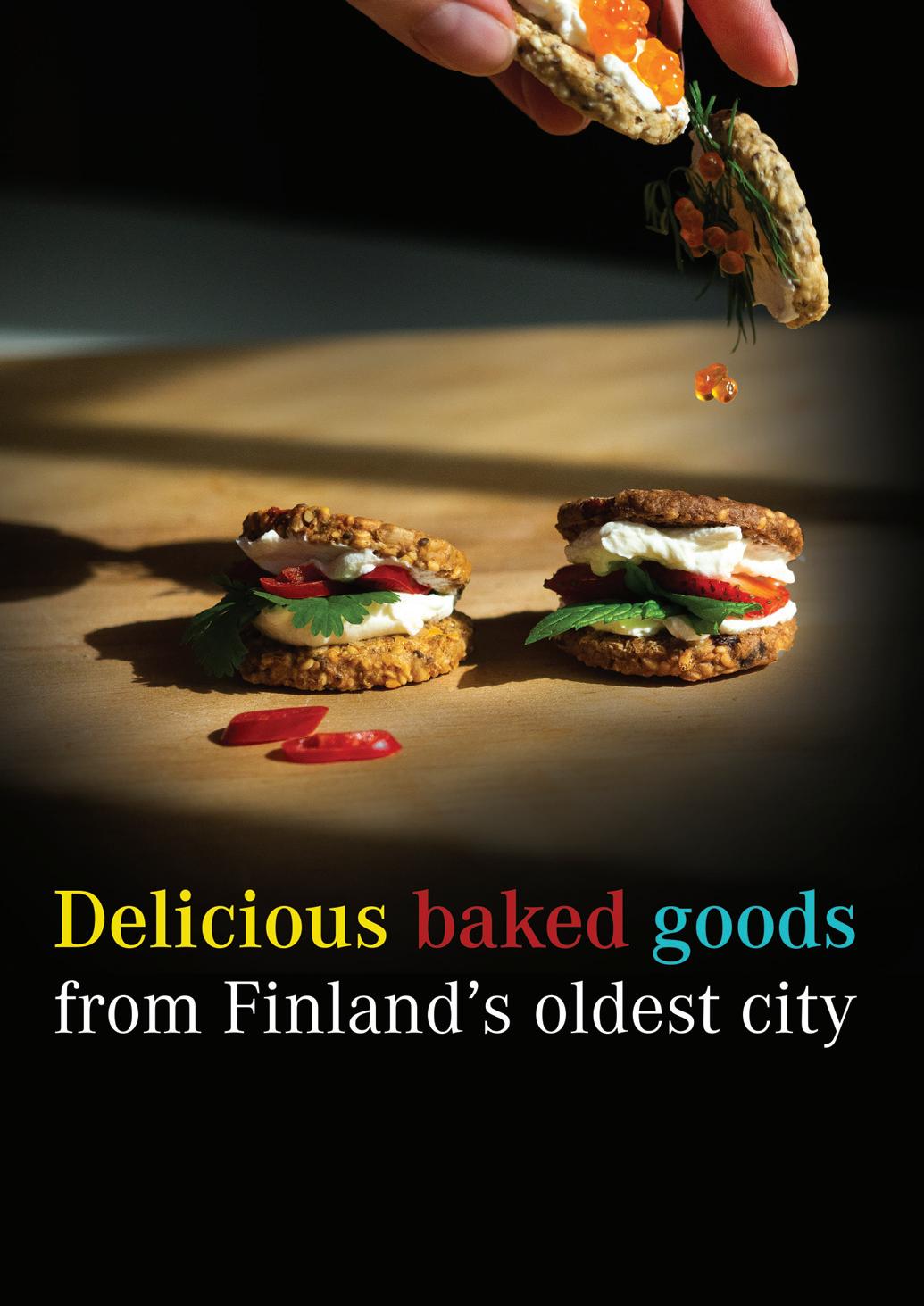
ASa market innovator of unique products, Leipomo Rosten Oy continues to impress with its tantalising flavours and food recipes. The company successfully maintains an annual revenue of €46 million. “There is nothing on the market similar to our seed product recipes,” Marketing and Export Director Veera Meltovaara said. “The crispiness of our products is also something I’ve yet to see anyone else replicate.”
Located in Finland, the company currently has seven production sites dotted across the country, including two bakeries in Turku, which produce fresh goods, dry bread-like seed crisps and seed snacks. There are also three facilities located in the city of Heinola that create organic products, gluten-free specialities and traditional fresh bread.
Thanks to the recent acquisition of Porin Leipä Oy, Rosten has added two additional bakeries to its portfolio. Located in Pori, Finland, the merger revitalises an old connection: up until 35 years ago, the two companies were under the same ownership.
As time progresses, Rosten aims to expand its brand even further. The company hopes to enter the global wholesale market and also aims to increase its presence in the UK. Alongside its plans for globalisation, Rosten also hopes to expand business further in Finland.
Rosten has an impressive portfolio, from its range of Seed Crispies to its more traditional Rostis. The company also offers a huge range of sweet treats and breads for its customers to enjoy, including novelty choices for Halloween and Christmas.

Using a variety of seeds, the company has created a formula for success. Each
one of its unique recipes caters for all and offers a taste sensation to remember. “The latest upcomer at Rosten is our range of SeedBoosts,” Ms Meltovaara said. “So far, we have three different flavours in this range: Garlic and Chilli, Cranberry and Chocolate Chip, and Sesame and Chia. They are all gluten-free and are a nice addition to our healthy snacks range.”
With its Finnish roots in mind, the company also produces traditional Rostis. Winner of the Finnish Television Competition: Finnish Recipe for Success 2020, Rosten’s Rostis is
exceptional in both taste and quality. Based off Karelian pasties, this product incorporates rice porridge, egg and butter in a crunchy rye crust. “The Karelian pie is probably the most consumed product in Finland. Whilst we came up with an exciting idea, we didn’t invent it; we simply updated a really popular product and made it easier to eat on-the-go. Traditionally, Karelian pies are quite time consuming to make; our product offers customers a quick alternative that tastes excellent, and we hope to export this to more countries soon.”
The Rostis so far have been a hit, and Rosten is now looking to develop the product
further, researching different flavours and recipes, including possible meat and vegetarian alternatives.
Since 2017, the company has also produced an enticing range of crispbreads called Seed Crispies. With seven different flavours in this range (including glutenfree options Oat and Sunflower, and Chia and Quinoa), Rosten worked hard to create an award-winning product that is both tasty and quintessentially healthy. All Seed Crispies incorporate at least two different seeds, which equate to a large percentage of the products’ ingredient list.
Impressively, the range’s latest addition, Protein Sesame and Flax Seed, dedicates a whopping 85% of its ingredient list to seeds. It is high in protein, which makes it a low
carb product. The Seed Crispies line is a huge success, receiving awards for the best launch and packaging of the series.
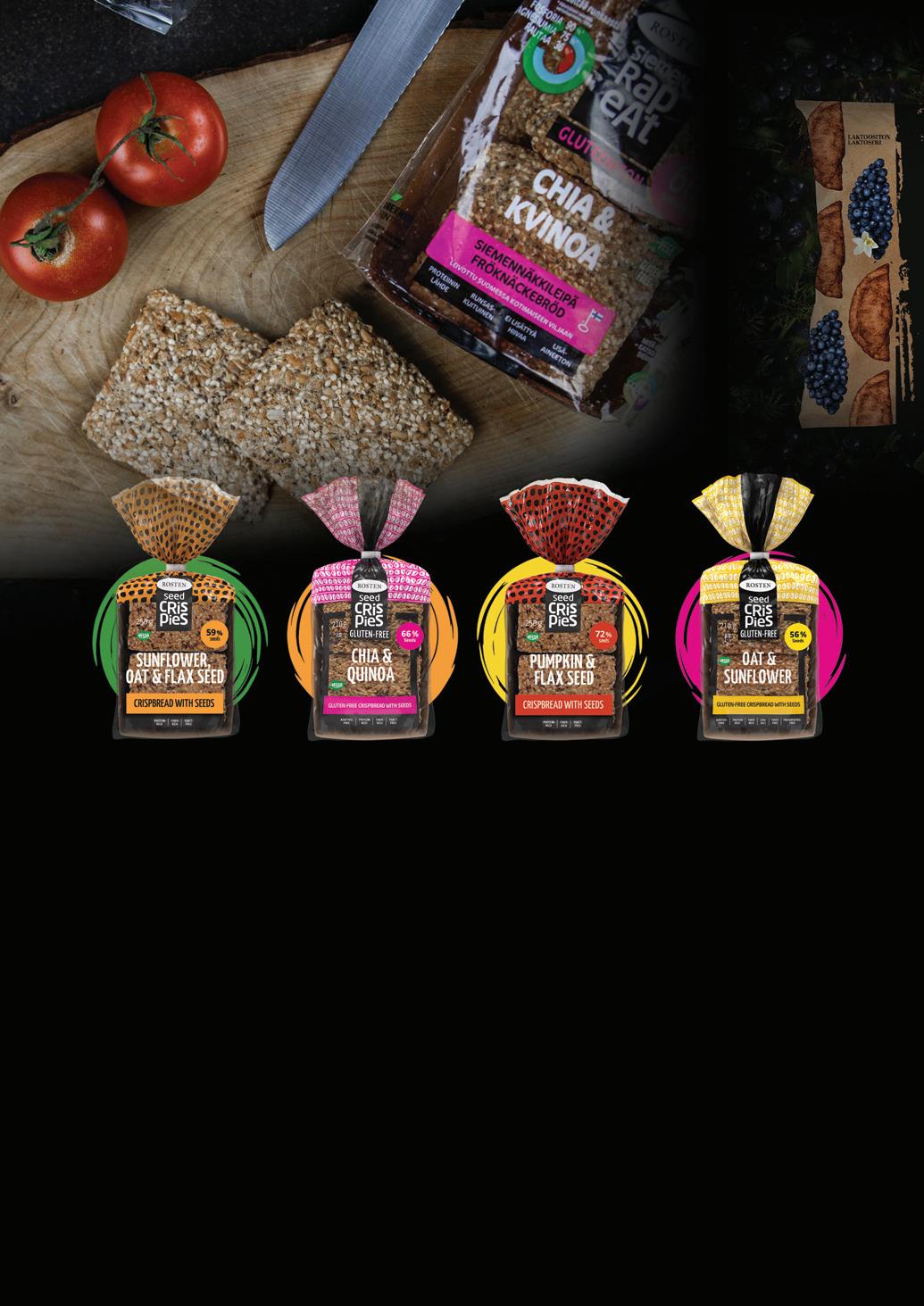
Teamwork to be proud of “We produce our goods solely in Finland, and we employ Finnish bakers too,” Ms Meltovaara said. “Some Finnish bakeries tend to outsource their baking abroad and have it transported back to the country. We are proud of our Finnish roots, and our goal is to become world-renowned as the best Finnish family bakery.”
The company is also Avainlippu certified, which is a key flag symbol awarded to businesses who maintain a domestic content of at least 50%. All the wheat, rye and oats used in Rosten’s recipes are produced on
domestic farms. This would not be possible without local suppliers to provide quality Finnish ingredients.
With hard-work and dedication, all 320 of Rosten’s employees create food that evokes pride. Some of the more experienced employees still make the bread manually, ensuring the art of baking remains alive at Rosten.
“I recently graduated from my EMBA, and what I learned from that – and from being in a leadership role – is that the wellbeing of employees is so important,” Ms Meltovaara explained. “At Rosten, we value our employees and take care of them as much as possible. We ensure the working environment is a positive one and always offer our employees the opportunity to learn
new skills too. I think it’s important to understand that leadership roles change – we don’t use the same methods year after year – we adapt to ensure that what we are doing works well for our employees and for the company too.”

The company also has five factory stores. These are located in Turku, Pori and Heinola premises and give customers the opportunity to buy produce straight from the source. So-called ‘wonky’ produce is a recent offering from a lot of retailers, these are products that do not meet wholesalers’ expectations of shape or size. Rosten’s factory stores sell this type of stock to customers, providing the same taste and quality at a reduced price. This successfully minimises waste and helps customers who may have financial struggles.

Wastage is a big deal at Rosten. The company has worked hard over the years to completely remove food waste from the equation. “83% of our waste ends up being
recycled, and 100% is reused in some way,” Ms Meltovaara said. “We also make use of bread rejected by our wholesale customers, some of this is then sold in our factory stores, and the rest is donated to the Finnish Red Cross.”
LED lighting has also been incorporated into all of Rosten’s bakeries for over fifteen years, being one of the first bakeries to adopt this type of lighting. On top of this, the company has ensured its pack-
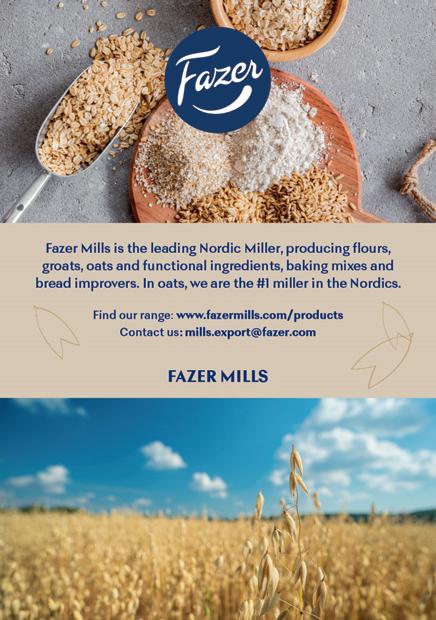
aging is recyclable, minimising virgin plastic content as much as possible.
“We have been sustainable for a very long time,” Ms Meltovaara concluded. “Lately, the word sustainability feels somewhat like a marketing trick for companies. It is, however, extremely important to Leipomo Rosten Group. We are always assessing how our production can affect the local ecosystem and will continue to work hard to maintain zero waste at our bakeries.”
Family-run bakery Wenzel’s the Bakers has over 45 years’ experience offering the best of baking at reasonable prices through a growing chain of High Street shops. General Manager Karl Spinks served up the latest news and insights into the rising business, in discussion with Phil Nicholls.
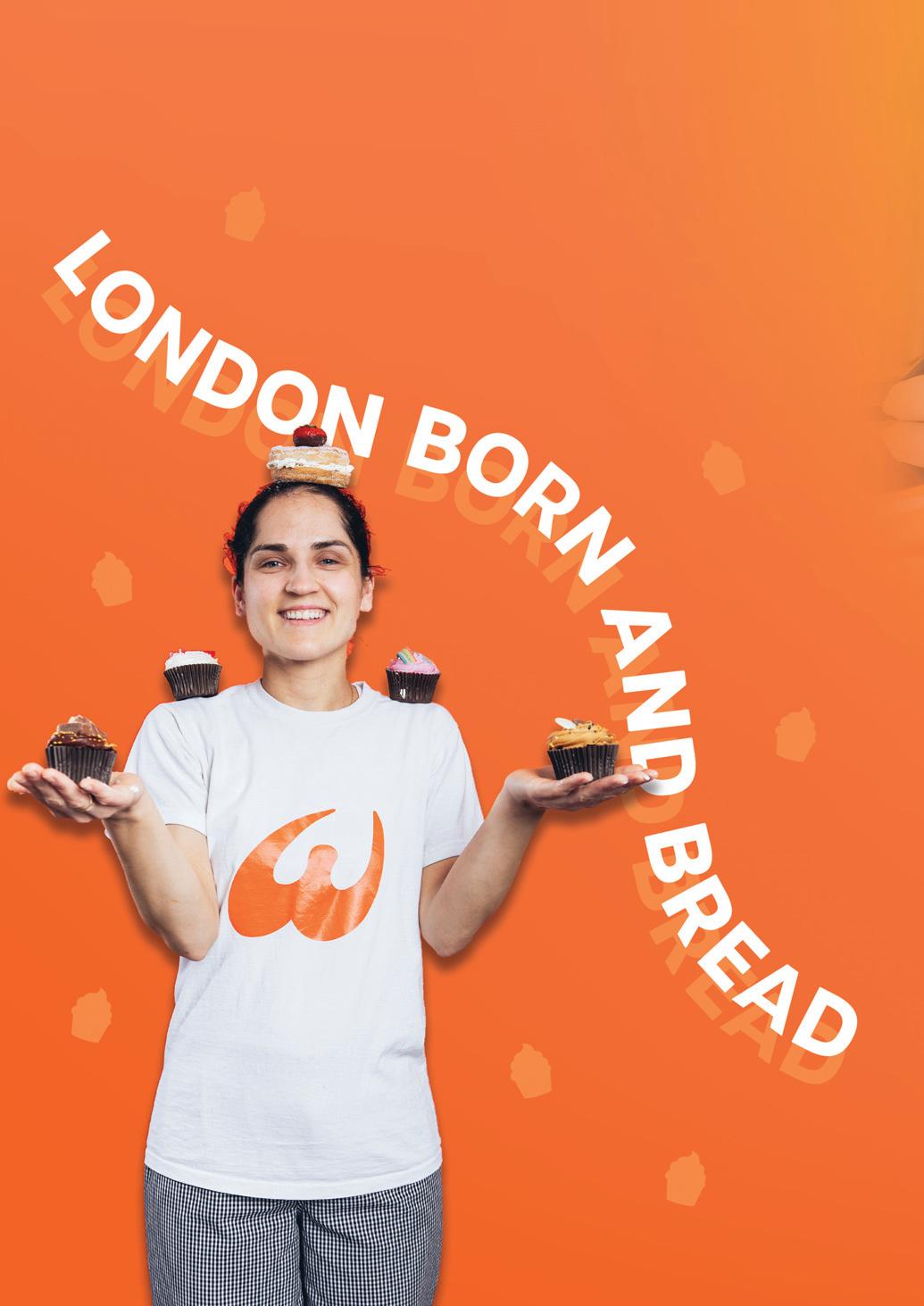
The current economic climate is challenging for many retail outlets. However, London-based Wenzel’s the Bakers has found ways to fight back against these issues and continues to build the business.

“We have adapted to the current situation,” explained General Manager Karl Spinks, “and are overcoming the hurdles by expanding our recruitment team and revising our methods. Our retention has massively improved, and Wenzel’s the Bakers has introduced a new benefit system to improve our team's motivation and to deliver a helping hand in the current climate.”
Founded in 1975, Wenzel’s the Bakers has steadily expanded to 95 locations across southern England. The past two years, however, have been tricky, according to Mr Spinks: “Not just as a business, but regarding the welfare and wellbeing of our staff due to the fear and stress of the pandemic, the dramatic change in consumer habits and the current issues with regards to energy prices and the consistent cost increases due to the conflict in Ukraine.”
Despite this challenging backdrop, Wenzel’s the Bakers have maintained an excellent rate of growth. During this time, the company opened another 30 shops and expanded the bakery facilities to meet increasing demand. Wenzel’s also launched a nationwide delivery service for its mouth-watering selection of iced doughnuts.
Wenzel’s 3,000 sqm bakery is constantly being updated with the latest specialist equipment. The company’s logistics department prides itself on delivering fresh products to stores within 10 hours of being baked.
The Wenzel’s the Bakers shops offer a fantastic range of tasty sandwiches and bakery treats: alongside the traditional Meal Deal featuring soft drinks and a packet of crisps, the Wenzel’s menu includes baguettes, paninis and bloomer sandwiches available with a range of fillings. The shops also stock a range of hot pastries and a delightful selection of sweet treats.
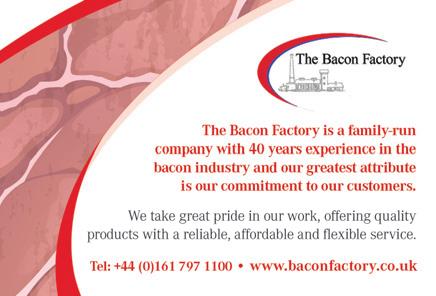




“We pride ourselves in our sales of our jam doughnuts,” Mr Spinks said. “We sell on average 25,000 per week and they are a key line for us. Also, our baguettes are great sellers and our customers love the meal deals, where they can combine the two of them with a drink. The freshness and consistency of these products makes them such great sellers.”
Driven by the quality and variety of items on Wenzel’s the Bakers menu, there is a great hunger for new shops. “Over the past year, we have seen dramatic YoY growth,” continued Mr Spinks, “and the reinvestment into the business allows us to open a new store every three weeks, on average. One area of growth we have noticed since the Covid outbreak was the delivery platforms.
“We have grown in some regions by over 80% YoY, and it is an ever-growing market. Wenzel’s the Bakers remade the website which gave our delivery platform products a lovely facelift with upto-date images. We now push our delivery platform sales through social marketing and online campaigns.”
Wenzel’s the Bakers enjoys a unique place in the market, with its own target market. Mr Spinks acknowledged that competition was growing but focused on the benefits of being challenged: “Competition is what makes us better and pushes us to go above and beyond.”
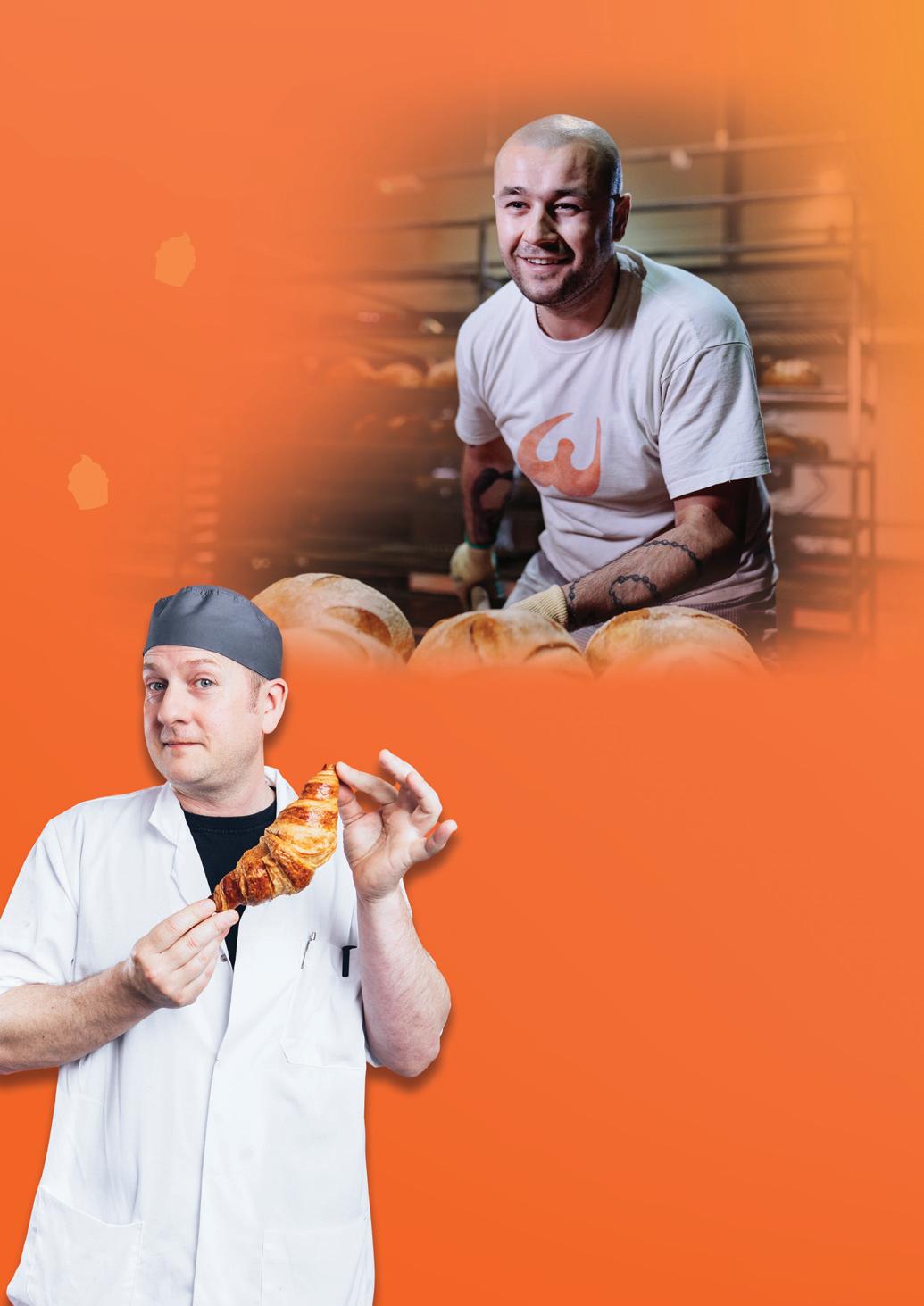
The company also goes above and beyond when it comes to sustainability, with a broad portfolio of actions. “We tackle this from many angles,” explained Mr Spinks, “from recycling our cooking oil and switching to electric vehicles. Wenzel’s the Bakers is also investing in solar panels which will be fitted in 2023.
“Regarding food waste, we donate to food banks, charities and even local farmers. We have also teamed up with Too Good to Go,
allowing customers to buy £10 worth of goods for under £4. We are making keen and direct movements to ensure we are reducing our carbon footprint and food waste.”
Working together to address complex issues such as sustainability and food waste highlights the importance of teamwork at Wenzel’s. This collaborative approach also applies to suppliers and partners, even in the face of global supply challenges.
“In the current climate, people have struggled with ingredient shortages and substitute products or ingredients,” Mr Spinks said. “Wenzel’s the Bakers works closely with our suppliers and has contingency plans in place. So far, everything has run smoothly. Regarding suppliers, we are both assets to each other's success. We have regular brainstorms and strategy meetings with our suppliers to ensure everything is on track and moving in the direction we want for our future expansion.”
Despite these assorted challenges, Wenzel’s the Bakers remains confident in the business model and the brand. Recruitment is an acknowledged issue in the retail sector, but Mr Spinks has confidence in the company’s expanded recruitment team and the overall direction at Wenzel’s the Bakers.
“Although uncertain times are looming ahead of us all,” he said, “we are confident in ourselves and our brand. We will push through it and come out stronger on the other side.”
To cope with these uncertainties, Wenzel’s has the main objective of continuing the steady expansion of the business. Regular investment in staff training is another tool to maintain the momentum for growth. The company monitors its shops and bakery to tighten the business efficiency and stay as cost effective as possible.

“My favourite part of my job is enthusing the wider teams,” concluded Mr Spinks. “I want them to be as proud and excited about the future of Wenzel’s the Bakers as I am. We are on the crest of a wave right now and I enjoy seeing how far we have come in such a short space of time.
“Wenzel’s is a family-run company, and it is a genuinely lovely place of work. We work together as a large team, battle through the tough times and always come out smiling and optimistic.” n

from crop to consumption

wye valley brewery The lakes distillery löfbergs beveland diversified foods diageo
Wye Valley Brewery has become one of the UK’s leading advocates of brewing beer as sustainably as possible. With a near-40-year heritage of being a popular choice among drinkers, the family business remains centred on delivering quality brews that have not cracked the carbon ceiling in doing so. Abbie Gadd, Head of Sales & Marketing, and Gareth Bateman, Head Brewer, discuss the company’s ‘go greener’ approach and its future ambitions. Report by Andy Probert.
Adefining characteristic of Wye Valley Brewery is that sustainability is front and centre in the brewing process –for every pull of a pint, a clink of glasses, or contentment at finishing one of their drinks. Admittedly, a drinker may have other things on their minds when contemplating a glass of their Nightjar, 1985 or the Hopfather. But for Head Brewer Gareth Bateman, the journey to that liquid heaven is the satisfaction of knowing that the path is paved with green – in an environmental way. And for vindication on the investment of being sustainable? Wye Valley Brewery’s flagship cask beers, HPA and Butty Bach, are in the top ten UK cask beers based on volume sold to on-trade.
Wye Valley Brewery always had the mark of excellent quality, even during the days when founder Peter Amor, an ex-Guinness brewer, started brewing his own beers at the back of The Barrels pub in Hereford in 1985. As the brewing side outgrew its original 18th Century coaching inn home, attaining a cult following among drinkers in the process, Peter’s son Vernon joined, and the family business moved to a nine-acre former cider mill in Stoke Lacy in 2002.
Now employing 70 people, the business operates a high-tech brewery that pro -

duces the best cask, keg and bottled beers, with over 51,000 brewers’ barrels sold to trade customers in the last 12 months.
With product quality matched by excellent customer service, it is no surprise that Wye Valley Brewery beers are served in more than 1,200 pubs and bars in the West Midlands and South Wales. From humble beginnings of producing ten brewers’ barrels a week, it has risen to an average of 1,000 barrels per week, equivalent to 14.8 million pints per year.
In response to intense competition from other new ‘disruptive’ brewery beer brands, Wye Valley Brewery underwent a corporate rebrand in 2015 and gained its second wind. “The brewery has gone from strength to strength, with us doubling our turnover in the last seven years,” confirmed Abbie Gadd, Head of Sales & Marketing.

“As well as streamlining our core cask range, we also wanted to create excitement with our limited-edition guest ales and also our decision in 2016 to start producing keg beers. With the launch of our award-winning lager, 1985, and more recently, our keg stout, Nightjar, we are appealing to a wider audience of drinkers. And our continued growth has far exceeded our expectations.”
At the core of the business is a commitment to innovation, investment and sustainability that have been ploughed into the Brewhouse.
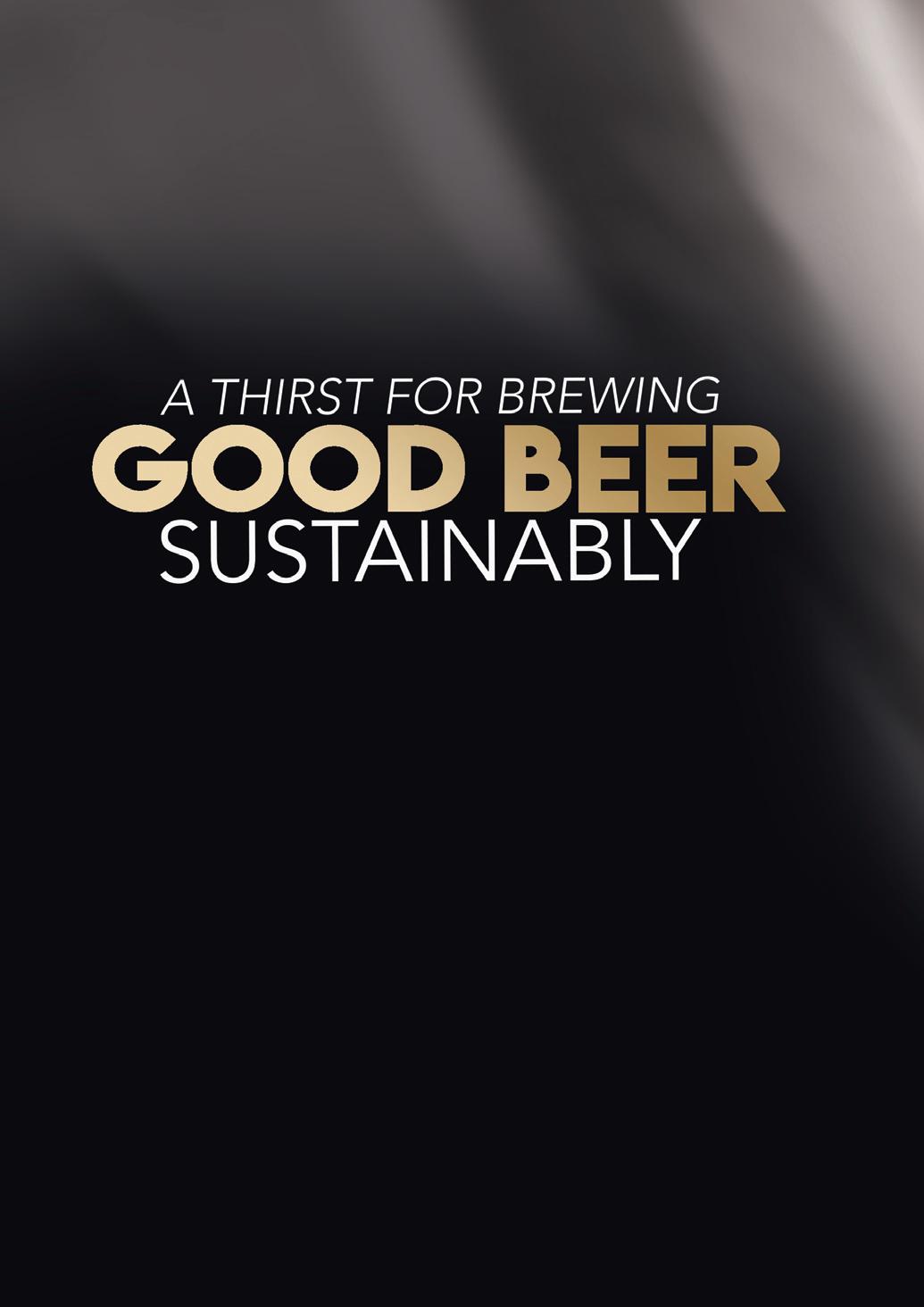
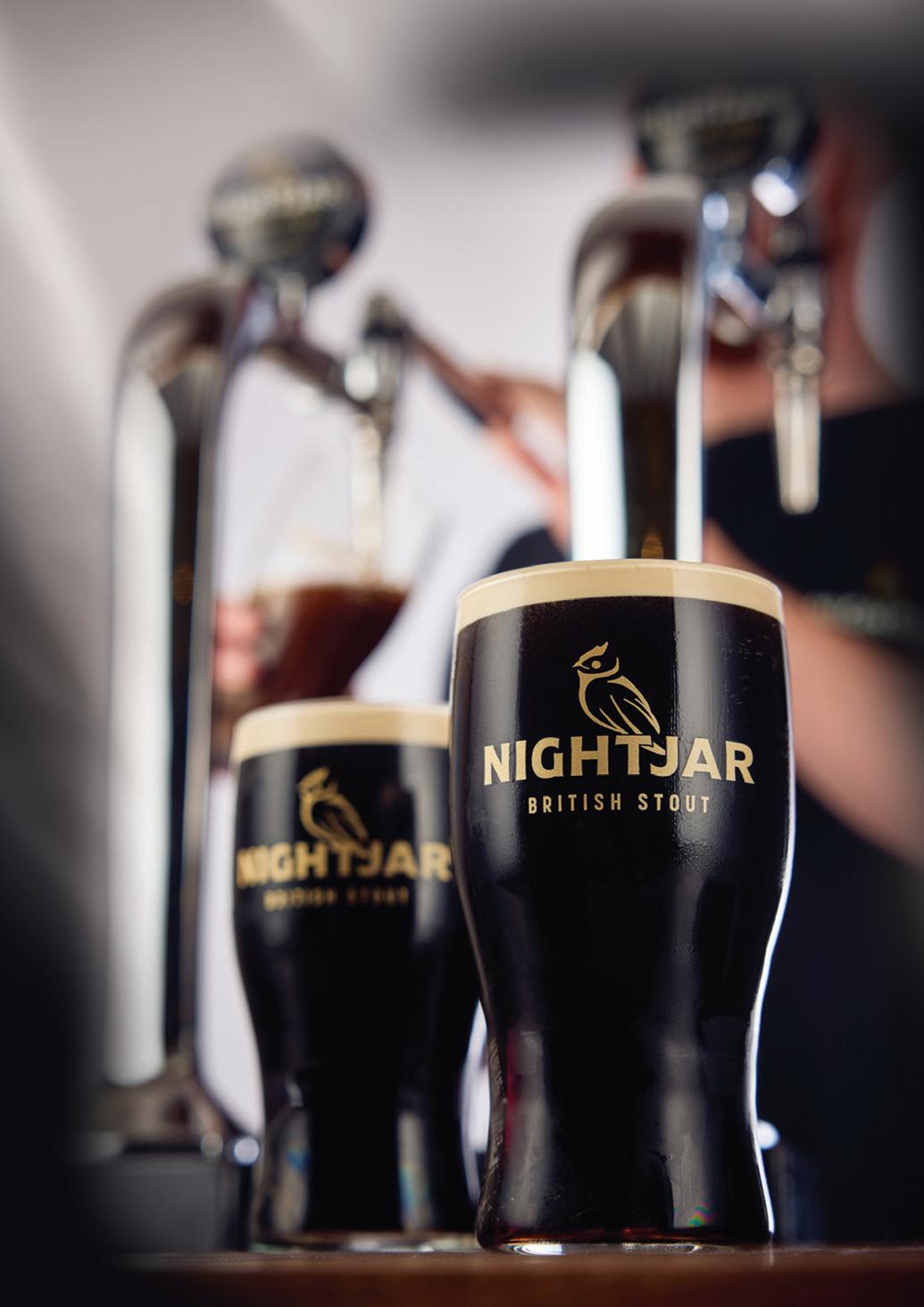



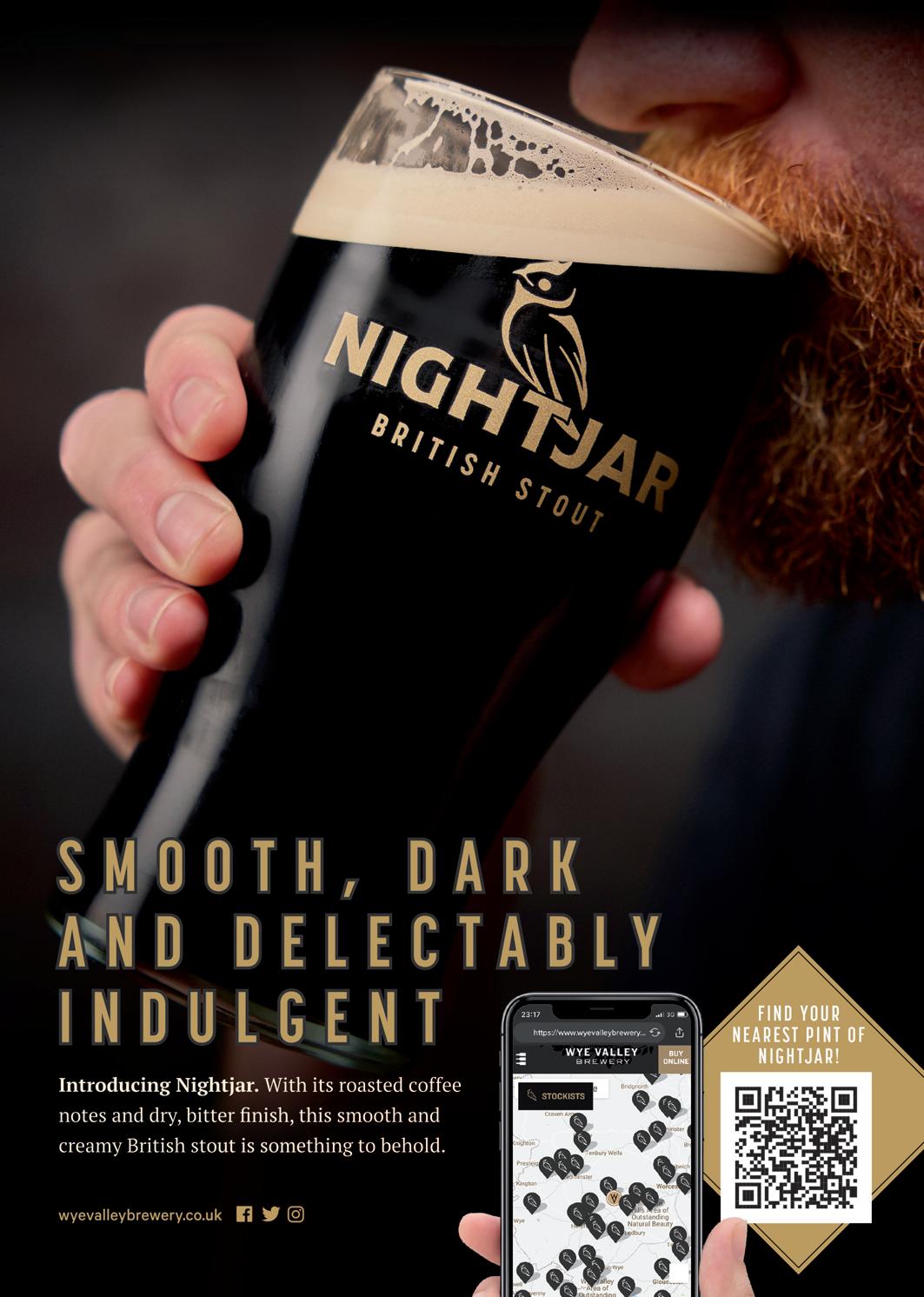
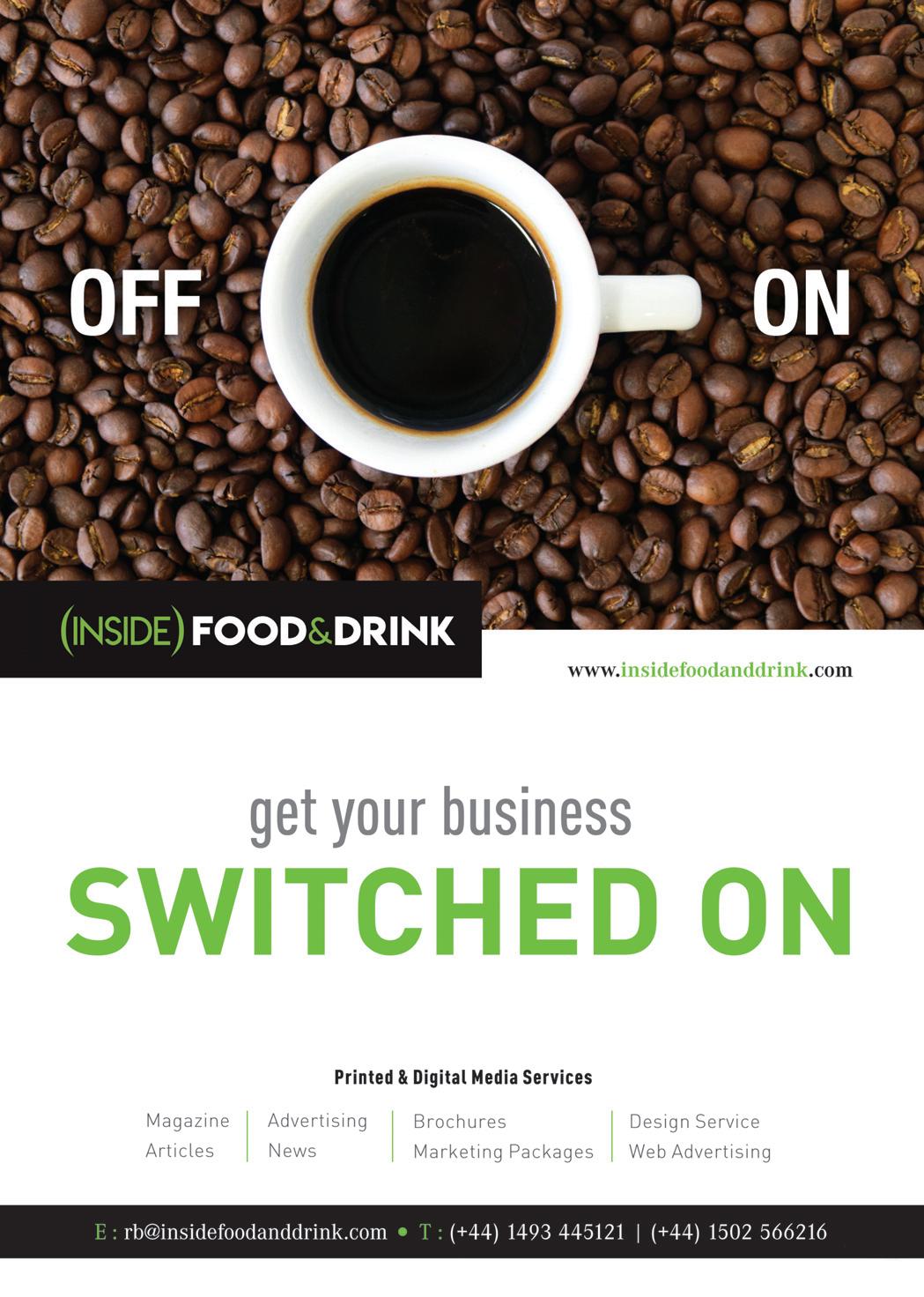

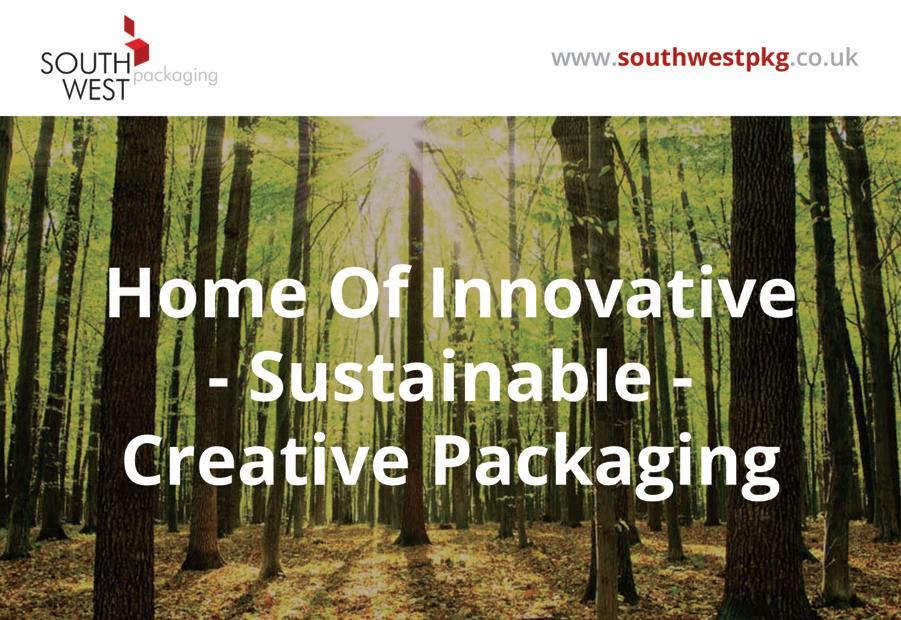
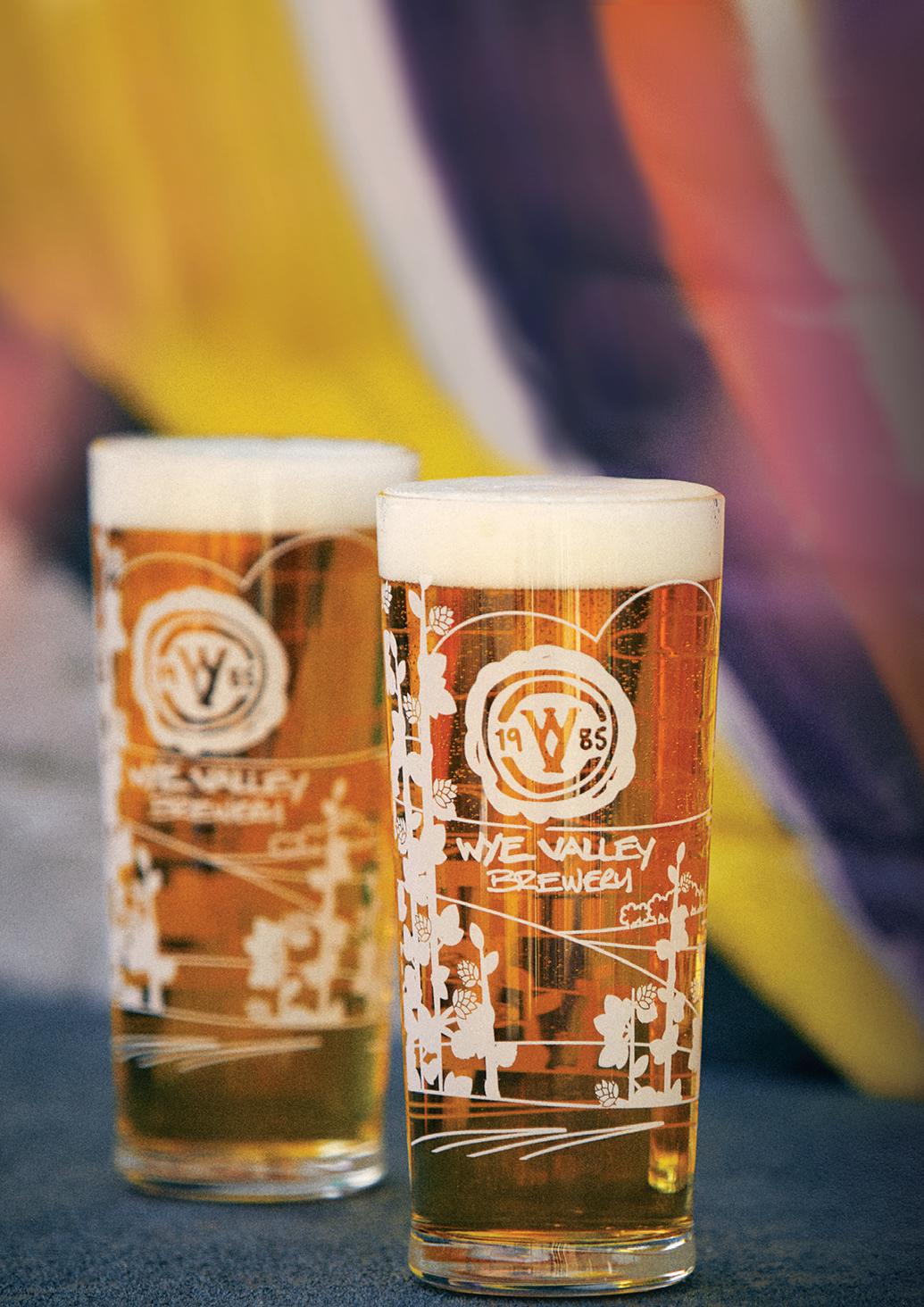
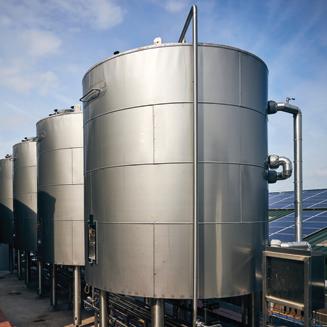
We are supported by a fantastic team of talented people who are passionate about what they do and what the business stands for
“ “
“Every project we approach is with a view to being as sustainable as possible,” said Head Brewer Gareth Bateman. The portfolio includes five core cask beers, three core kegged beers and seasonal favourites.
With the installation of a new brewhouse in 2013, the world’s first thermal fluid heating system for wort boiling was introduced, resulting in a 45% reduction in CO2 emissions. “Being green isn’t just about ticking boxes; it’s a commitment to brewing beers, caring for our community and looking after the land, so it remains beautiful for generations to come,” a sentiment that Wye Valley Brewery’s Managing Director Vernon Amor passionately believes in.
Further investments include moving from a centralised steam boiler to smaller individual heaters that could be locally installed near the cask-washing, wort and bottling areas. Installation of a 350kwh solar panel system, covering an area equivalent of six tennis courts, generates 41% of the brewery’s total electricity consumed annually.
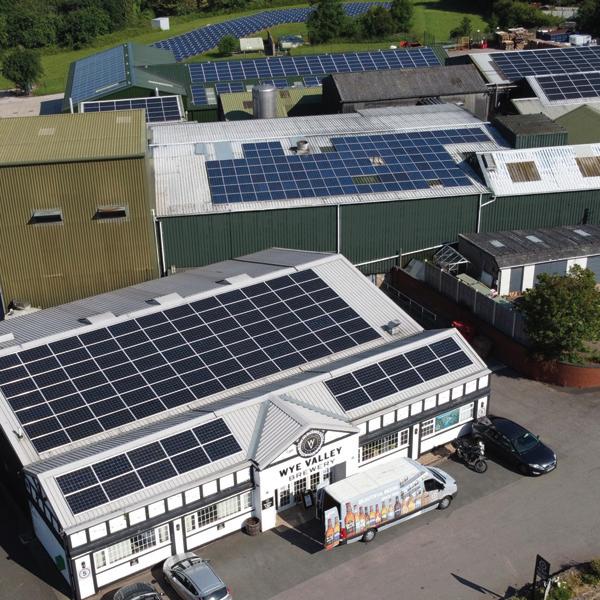
Steam created during the brewing process is recovered to heat water for cask washing and sterilising; water to packaged-beer ratio is below 4:1, while centralising cask racking, cold storage and distribution has reduced vehicle movements on-site by 80%.
It has replaced its glycol cooling system with a low GWP refrigerant R454B and added an air cooler. When ambient temperatures drop low enough, the brew team uses fans and a big radiator to cool the glycol rather than using power-hungry compressors on the chiller. “In the summer, if we generate an excess of solar energy, the chiller set point drops by 2 degrees to store the energy,” said Mr Bateman.
The company has also replaced bio-LPG forklift trucks with electric, changing its CO2 supply to a sustainable source – produced locally from anaerobic digestion plants –with plans for generated waste sludge to be sent for biogas production.
Over 60% of hops are sourced within ten miles of the brewery, with spent grain and hops shared with local farmers to use for animal feed and compost. Any excess yeast is offered to local farmers for pig feed.
Around 90% of its beer is sold in casks or kegs, which are then recycled. Wye Valley Brewery still uses some casks from when the brewery began in 1985.

Further investment has flowed in the last two years, with the installation of five new 80BBL conditioning tanks, each holding the equivalent of 23,000 pints; two 10BBL conditioning tanks and a new hot liquor tank.
This gives the brewery greater capacity, particularly for its plans for its award-winning lager, 1985, and other popular keg beers Fandango and Nightjar.
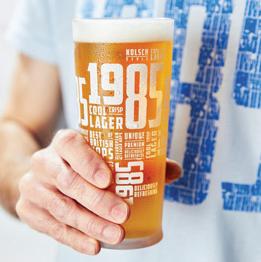
A new bottling, canning and packaging line is being installed, ready for commissioning in mid-2023. This will offer bigger retail opportunities. “While considered a large regional brewery, Wye Valley Brewery is highly agile and responds quickly to customer demands,” said Mr Bateman.
Ms Gadd added: “We are supported by a fantastic team of talented people who are passionate about what they do and what the business stands for. And we are immensely proud to be an official Living Wage Employer, as accredited by the Living Wage Foundation in recognition of our choice to pay our staff more than the National Minimum Wage.”
Wye Valley Brewery has recently completed a rebrand of its popular keg stout, the relaunched Nightjar. Its ambition is for Nightjar, a reference to the nocturnal bird that nests in the Wye Valley, to become the British keg stout brand of choice.
Nightjar is based on the original Dorothy Goodbody’s Wholesome Stout cask recipe dating back to 1985 when Mr Amor first began brewing. The lookback is as much a look forward to how Wye Valley Brewery stands out as a modern brewhouse for the ages. n
Installation of a 350kwh solar panel system, covering an area equivalent of six tennis courts, generates 41% of the brewery’s total electricity consumed annually
The Lakes Distillery is the focus of the whisky world, having won the World's Best Single Malt Whisky accolade. CEO Nigel Mills CBE related the Cumbrian distillery's ten-year journey, its expansion plans and a mission to make English whisky a globally recognised brand. Report by Andy Probert.


From a once-derelict Victorian farmstead in a UNESCO World Heritage site to the world's most exclusive bars, the ascent of The Lakes Distillery to the top has been nothing short of remarkable. This journey culminated in The Whiskymaker's Reserve No.4 winning the ‘World's Best Single Malt Whisky’ in 2022.

The distillery, set up on the shores of Bassenthwaite Lake in Cumbria, is one of England's largest whisky, gin and vodka creators. Alongside its spirits production, the brand also welcomes thousands of tourists to its visitor centre, shop and bistro.
While further expansion and global sales beckon, the journey has not been entirely serene. Planning and financial battles threatened the dream. But the distillery is now permanently looking up - and on a bold mission to establish English whisky in its own right.
The distillery's origins are founded on its visionaries' tenacity, ambition and luck: Paul Currie and Nigel Mills CBE. Mr Currie, son of a renowned whisky MD for Chivas-Seagrams and one part of a father and son team who founded Isle of Arran Distillers, spotted the potential of the Lake District as a unique location.
Mr Currie identified a 160-year-old derelict farmstead on the banks of the River Derwent – distilling the idea of the lure of a UNESCO World Heritage site, being close to water, stunning
landscape and an idyllic setting. The site was ideal for inspiring whisky-making.
Having won a two-year planning battle in 2011, Mr Currie's story piqued the interest of Mr Mills, a retail businessman and hotelier in his own right.
“I thought it was an interesting opportunity,” said Mr Mills, “as I had seen the wine industry change over 30 years, with traditional wine-makers of Spain and France being challenged by new countries. I believed the whisky industry was ripe for challenge, and English whisky could be a part of that trend.”
With both men at the helm, supported by Alan Rutherford, a former production director at Diageo responsible for their Scotch whisky distilleries, the distillery became a reality in 2014, thanks to £6m in private and government finance.
The distillery initially forged its reputation on quality gin, vodka, and blended whisky, with The One becoming the first blended whisky to be made from the finest aged whiskies from around the British Isles. It won numerous awards.
The first bottling of the inaugural Lakes Single Malt Whisky, Genesis, in 2018, was auctioned for £7,900, breaking two world records: the most expensive single malt sold from a new distillery and for



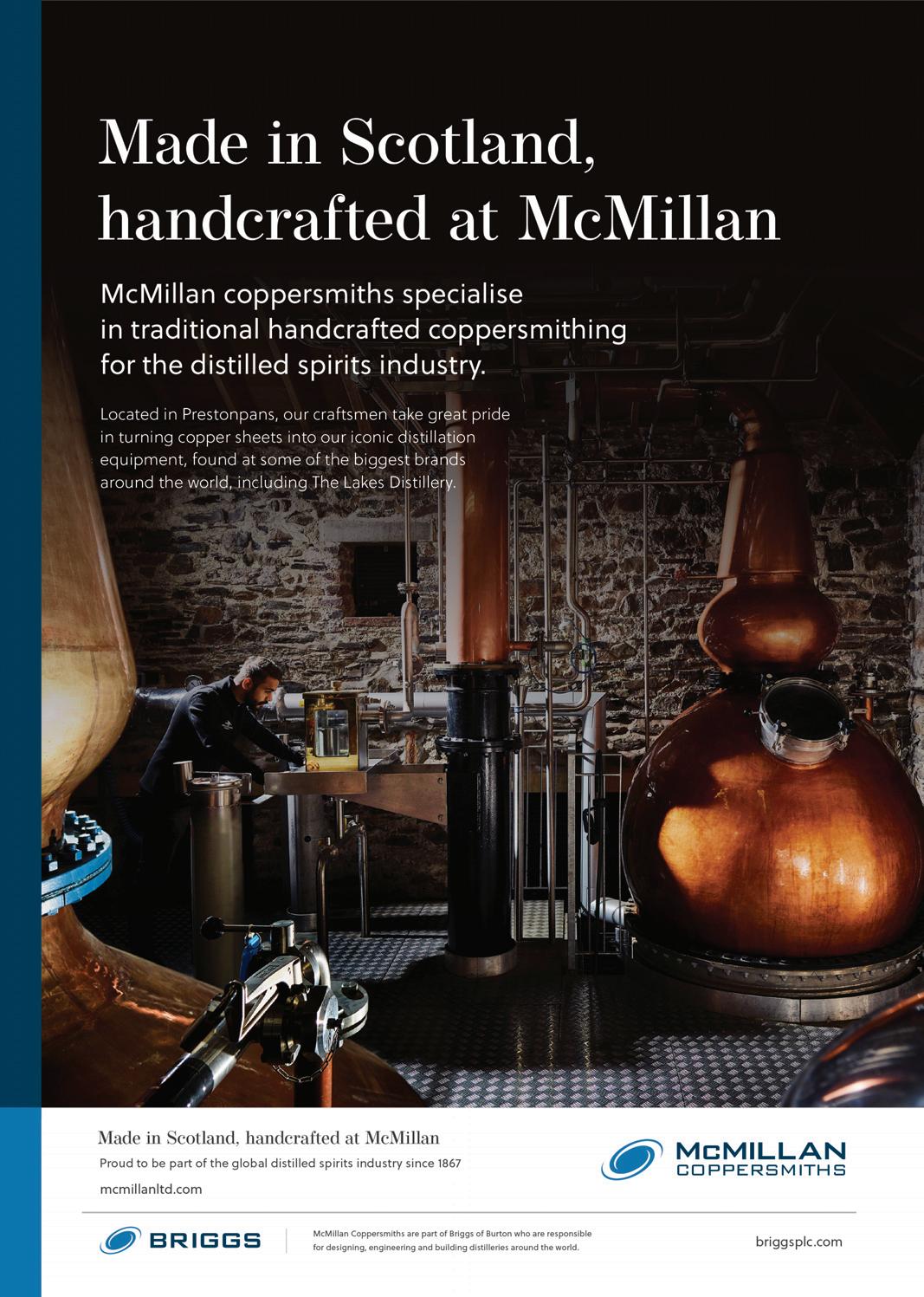
a bottle of English whisky sold at auction. The company then set about chasing the ambition of creating one of the world's leading single malt whisky brands. Inspired by their surroundings, the distillery adopted the Quatrefoil as an icon representing the company's core values of faith, hope, luck and love.
“We wanted to create something extra special from the whisky, the blend, the brand and the look,” Mr Mills said. “We wanted to present The Lakes in a way that embodies the business's culture, beliefs and aspirations.
“Whether it's our choice of barley, obsessive focus on cask selection and maturation, or passion for the art of blending, we want to share our story and for people to understand how important the focus on quality is at The Lakes.”
Aside from further whisky evolution with the aid of whiskymaker Dhavall Gandhi, the business was boosted in 2019 when The Lakes Vodka was named the ‘World's Best Vodka’.
The company launched its first widely-available single malt whisky, The Whiskymaker’s Reserve, in the same year and saw the 6,000 bottles sold out in a week.
Quickly gaining a reputation for quality and flavour creation, it also became clear that while The Lakes Distillery respects the traditions of whisky’s rich heritage, the company remains open to a world of other influences. In particular, the approach to whisky-making, and the award-winning Whiskymaker's Reserve series, takes inspiration from Cognac's cellar masters, where the distillery has taken the concept of élevage - a proactive involvement in whisky's maturation - to create intriguing layers of flavour profiles.
Mr Mills likened the whisky-making process to an artist setting out on a journey to create a masterpiece, comparing the different flavours used to design the whisky to the colours and hues used by an artist to accentuate their storytelling.

With a modern approach to the craft, it is maturation and blending that defines The Lakes Single Malt. Unlike other distilleries, rather than sealing the casks and simply waiting to blend the result, The Lakes Distillery regularly samples every cask, frequently effecting change to evolve an array of intriguing layers of flavour.
Whether changing a cask’s location or transferring the spirit between casks, it is only by knowing each cask intimately, how the flavours are evolving and how they can be blended to complement, enhance, deepen, broaden, or contrast, that The Lakes Distillery can create the desired depth and complexity.
This age-old art is called élevage. It is active involvement demanding patience and time. Hand-selecting the final casks, The Lakes Whisky is then married together for up to a year before bottling. It is this process that sets The Lakes apart. And it is the reason the company has been able to pursue a carefully targeted approach that sees The Lakes single malt whisky available on menus in highend bars and restaurants across the world.
In 2021, the company completed a renovation project to expand its whisky production from around 130,000 litres per annum to 375,000 litres. The project also enhanced its state-of-the-art whisky studio and blending lab and created a new whisky warehousing facility.
Additional funding has been secured enabling The Lakes to increase its single malt whisky production and export the brand to the USA, France and Japan as global demand for whisky continues to outstrip supply, with the market forecast to grow from $60bn to $108bn over the next decade.

A natural extension for the Cumbrian whisky-maker was the 2022 launch of the English Whisky Guild, of which The Lakes Distillery is a founding member. The Guild seeks to ensure English whisky becomes a category in its own right and has submitted a Geographical Indicator to DEFRA to legally define English whisky and ensure consistent standards among all distillers.
With its roots in a UNESCO World Heritage Site, The Lakes continues to adopt a sustainable approach to its operations. These include using a biomass boiler to heat the buildings, recycling water, using heat recovery and with a state-of-the-art plant, keeping its carbon footprint to a minimum.
“The Lakes is not only helping the local environment,” Mr Mills added, “but supporting the rural economy in many ways, such as having a visitor centre that attracts thousands of people annually. The aim is to excite people by having a quality brand that delivers. The business has firm foundations, and huge opportunities now await.” n
Löfbergs has been roasting coffee for more than 100 years, resulting in an expert understanding of what makes the best quality coffee. Head of Sustainability Kajsa-Lisa Ljudén, Head of Operations Development Madelene Breiling, UK Marketing Director Will Cole and UK Sales Director Alex Spruce discussed the company’s efforts towards protecting the future of the coffee industry and its implementation of sustainability, in a report by Imogen Ward.

The value chain is hugely important to Löfbergs. This family-centric company remains close to its roots, creating a warm and feel-good experience with every sip.
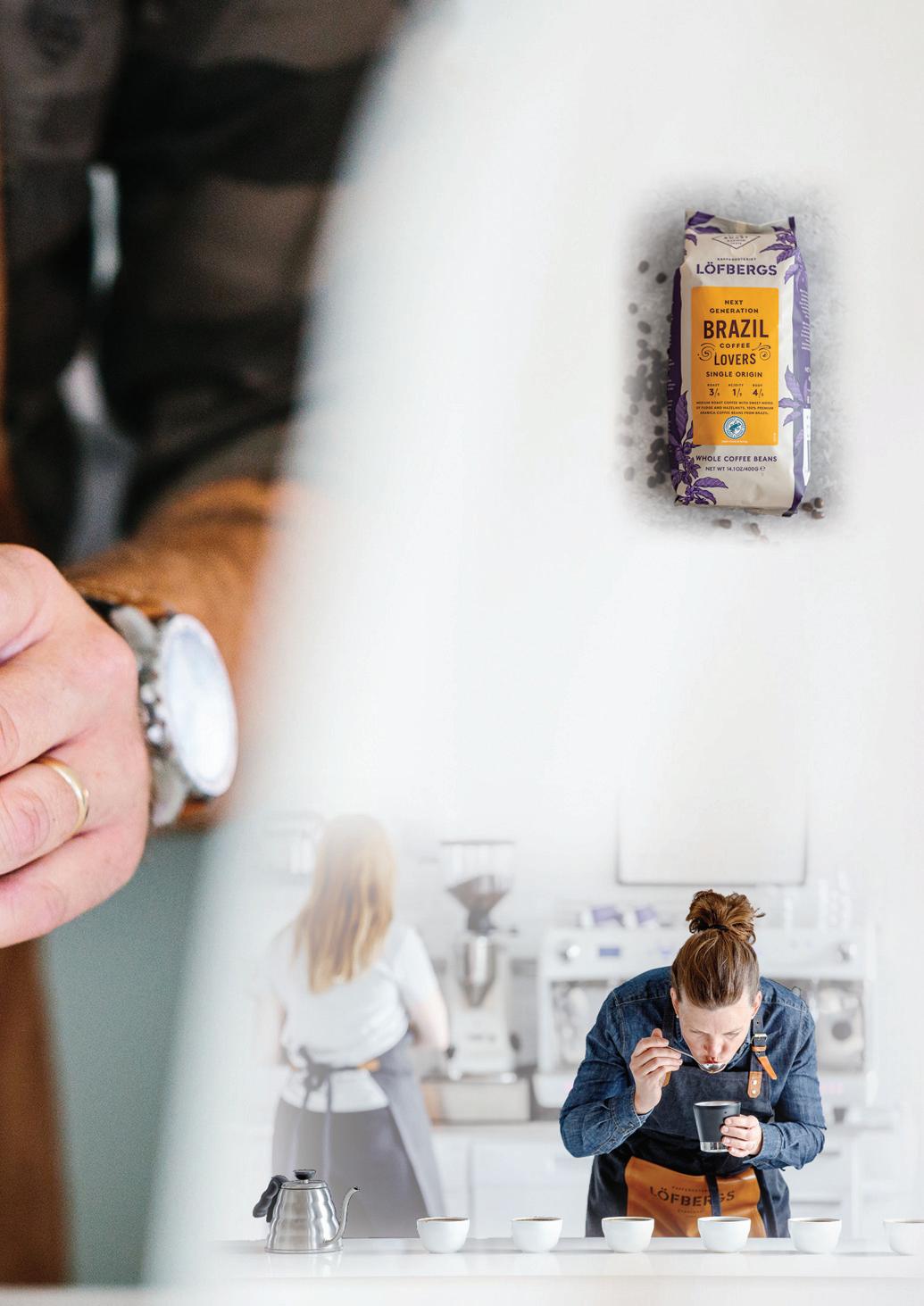
“We work with green coffee suppliers,” Head of Sustainability Kajsa-Lisa Ljudén said, “we firmly believe that the longer we work and build relations with the farmers, the better our knowledge will be, minimising any risks in the value chain significantly.”
With its recent expansion into the UK –and a strong presence in 10 core markets – Löfbergs continues to take the coffee industry by storm. Despite this impressive growth, the company has retained a loyal commitment to its community of farmers. The company’s dedicated research and development is helping continuously improve farmers’ welfare.
Last year, Löfbergs contributed 45 million SEK to the Fairtrade system through purchases of coffee. The company has helped over 112,000 small-scale coffee farmers through development projects since 2001, working with the ‘coffee&climate’ network and with International Coffee Partners. To these projects, Löfbergs has donated over 30 million SEK during the last 20 years.
After launching in Tesco, Löfbergs’ coffee has been a hit with UK consumers; Will Cole, UK Marketing Director, gave insight
as to why this is: “There’s several reasons why Löfbergs has done so well in the UK. Firstly, the quality is paramount; to be able to find a single origin coffee, at the price point we can offer is unheard of. Another key selling point is the generous packaging size. Our packs come in 450g bags, which is a much larger format than the standard 250g packs of our competitors.
“When you work out the cost per cup, it’s really reasonable. I’d say it’s one of the best value branded coffees you can buy. Finally, it’s also down to our brand. We’re a proud
Swedish company and that is echoed in our products.”
A standout performer in the eyes of the UK consumers is the Single Origin Brazil Ground Coffee. Full bodied with a medium roast, this product has Rainforest Alliance certification, ensuring the very best taste without sacrificing the welfare of those harvesting the beans. All of Löfbergs’ coffee is purchased directly from the country it is grown in, which is more unusual in the world of coffee.
“In Sweden we see similarities in customers’ interests; there are a lot of parallels in taste preferences,” Head of Operations Development Madelene Breiling said. “Our awareness of sustainability is also hugely important to our consumers as well. From the certifications we hold, to the coffee’s journey, including who the farmers are
and how we support them, we work hard on every element.”
As one of the Nordic Region’s largest family-run coffee business, Löfbergs sees its customers as a hugely important element of both its history and its vision for the future.

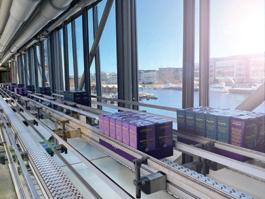
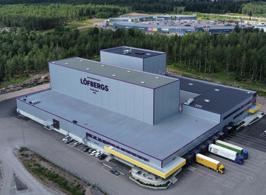
As part of this vision, Löfbergs is the first coffee manufacturer to partner with the Era of We, intent on improving the overall wellbeing of all coffee farmers. The Era of We is an interactive online platform that connects f armers directly to consumers and coffee
roasters, allowing them to market themselves effectively.
“This platform is highly transparent,” Ms Ljudén said, “and we strongly believe that it has the ability to create a more balanced value chain – giving the farmers more power.”
A new roastery was a welcome addition for Löfbergs in 2021. After several years of analysis and planning, the roastery – situated in the Swedish city of Karlstad – was completed. “I was practically living on the construction site during the pandemic because I was there so often,” Ms Breiling said. “This project was incredibly important to Löfbergs as it gave us the opportunity to really stretch our capacity to better serve our international presence. We also took this as an opportunity to further develop our products, especially regarding whole bean production. This facility enables us to produce an additional 10,000 tonnes of coffee per year.”
The new roastery was built with the highest construction specifications in mind, as a result the facility was awarded a silver environmental building certification. “The new facility was really a huge investment in energy efficient production,” Ms Ljudén said, “this has enabled us to progress our journey of sustainable improvement. We only roast with green resources, such as bio-LPG, and the facility was built with sustainability-driven specifications.
“Over the years, our company has successfully increased our capacity and


doubled production of coffee, without increasing energy usage. The new facility allows us to grow even further, in a sustainable way.”
An added bonus of this expansion is the ability to scale up. The company is incredibly flexible when it comes to consumer demand and has plans in place to further develop this new roastery as and when business requires it.
Löfbergs’ roots in sustainability can be traced all the way back to the ‘90s when the company endeavoured to remove aluminium packaging and entered the organic coffee market.
“Löfbergs did a lot of work early on to introduce sustainable packaging,” Ms Breiling said. “We partly left fossilbased plastics behind, and completely removed aluminium metallisation from our coffee packs. At Löfbergs, we strive for a circular packaging cycle, by using coffee packages that are made from renewable or recycled materials, and which after usage can be sorted, recycled and reprocessed into new materials.
“Also, in ’95 we were the first Swedish company to import organic coffee. We have worked with it for such a long time; organic coffee is in our genes.”

With its success in the UK market, Löfbergs hopes to further expand its brand into more countries and increase its customer base. The company is committed
to achieving this whilst maintaining its essential sustainable corporate philosophy.
“Our overall goal is to be a value adding partner,” Ms Ljudén concluded. “We have great tasting coffee that is excellent quality; we do a lot of work to aid sustainability, but we want to offer something more with our extensive coffee knowledge. To do that, we plan to enhance our customer-focused projects. We do not want to be seen as a mass producer of coffee; we want to continue making products that our customers love, because ultimately, our customers are our strength.”
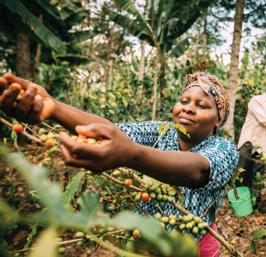
Beveland SA has almost 30 years’ experience distilling premium spirits and liqueurs. Marketing Manager Jordi Sahis described the current range and the latest projects at Beveland. A report by Phil Nicholls.

Spanish distiller Beveland SA is steadily building up its portfolio of brands available in the US market. Recent successful launches include spicy gin, rum and brandy, all re-imagined for North America.

“We adapted our packaging by creating new SKUs that match with the big consumption trends in the US,” explained Marketing Manager Jordi Sahis. “The creativity of these new versions matches our premium spirits perfectly; thanks to the added value the new branding generates.”
Beveland is part of the family-owned Masoliver Group established in the 1970s, a Spanish market-leader for luxury food and drinks. Beveland SA was formed in 1994 as a dedicated producer and exporter of liqueurs and spirits. In 2009 Beveland expanded production to the Dominican Republic where it began distilling rum. This passion for rum continued at Beveland with imports from Venezuela, Cuba, Fiji and Indonesia. Beveland expanded its portfolio into brandy in 2016 by becoming co-owners of Bodegas Suau, a traditional Majorcan winery that has been producing brandy since 1851.
Based in Catalonia in northeast Spain, Beveland exports over 50 brands of spirit and liqueur to more than 70 countries. The production facility has three bottling lines with a total capacity of 70,000 bottles a day. Up to three million litres can be stored in tanks on site, along with 300,000 litres being aged in casks.
The diverse output of Beveland is available in eight categories of spirit and liqueur. Jordi Sahis highlighted the success of
Beveland’s rum range: “Our success with the Relicario rum brand lies in our capabilities in the Dominican Republic cellar and the talent of the entire team. Authenticity, devotion to the requirements of high-quality rum and the creativity of our technical team are the main reasons why the Relicario brand gains more support every year.”
Beveland President Joel Masoliver Olivas explained in a previous interview with Inside Food & Drink magazine how the modern surge of popularity in craft gin originated locally: “It was mainly here in Spain that the gin boom really started. Spain has always had a significant consumption of gin more than vodka, and we have a lot of local producers.”
The centrepiece for Beveland’s popular gin range is the Jodhpur brand, available as London Dry Gin distilled with 13 botanicals most of them imported from India. This range is inspired by the city of Jodhpur, known as the Blue City, situate d in the state of Rajasthan in north-western India. As a nod to Jodhpur’s location on the famous Spice Route, Beveland also make Jodhpur Spicy gin created with a smooth warm taste thanks to the maceration of its Indian chilli and pepper content. Finally, there is the Jodhpur Mandore gin, blended with a maceration of Indian citrus fruits such as bitter orange, Buddha’s hand and calamansi.
“Jodhpur is growing thanks to remaining true to the essence of the brand,” explained Jordi Sahis. “The entire range is designed to showcase the spices, fruits and flowers of India, allowing the consumer to be transported by these aromas to wildest India.”
The Beveland whisky range includes four varieties of Glen Silver’s blended whisky imported from Scotland, with premium brands blended for eight and 12 years. Beveland has five brands of vodka, and the brandy range features five types of Suau Brandy aged up to 50 years. The extensive BVLand range of 32 different liqueurs are marketed in distinctive long-necked bottles to ease their use when bartenders mix cocktails for their signature cocktail creations. Other lines from Beveland include tequila and mezcal, several agave spirits and a range of speciality products including absinthe, schnapps and many more.
With such an extensive range of spirits and liqueurs available, Beveland is eager to expand into the US market. Jordi Sahis noted two brands leading Beveland’s push into the new market: “Our Jodhpur Spicy is the first spicy gin on the market, suitable for a very specific consumer who looks for new experiences. The Beveland Relicario Vermouth finish is also popular. Developed from the Relicario Superior, this rum is aged for another six months in Italian Mancino Vecchio Vermouth barrels to give it a unique aroma.”

Jordi Sahis conceded that the spirit and liqueurs segment is a very active market : “It is a very dynamic category with a lot of competition,” he said. “This forces Beveland to be faithful to our style and constantly seek perfection throughout the process.”

Joel Masoliver’s understanding of the market remains true today: “The spirits market is very competitive, with multinational players against whom it is quite difficult to compete. As a relatively small, family business, o ur strategy is to find gaps in the market, then make quality products that are different and drinks that are very special.”
Beveland is alive to the challenges of a competitive market and maintains a research and development laboratory to drive innovation, however: R&D is only one tool in Beveland’s commitment to adapting to the ever-changing market.
“Thanks to the advice of analysts from compa -
nies such as GlobalData, IWSR, Nielsen and Euromonitor,” explained Jordi Sahis, “we work hard to detect the opportunities in each market and adapt our portfolio to serve the consumer with a satisfying product.”
To evolve and grow in such a competitive market, Beveland relies upon a close and productive relationship with its suppliers.
“We prioritise a personalised service,” Jordi Sahis said, “To ensure that they understand our business model. The key to gaining loyalty within the supply chain is for everyone to feel that every project belongs to all the participants.”
According to Jordi Sahis, Beveland’s strong relationships with suppliers and clients depends upon: “Trust, respect and personalised treatment. The effort of each and every department of a supplier has an impact on the result of the product or service contracted.”
Joel Masoliver outlined the company’s on-going vision for future product development: “What we are focusing on is to establish a clear and distinctive story and motif; why a brand is created, why we are using key ingredients, which parts of the world we are in. We strive always to be the best, creating drinks of high quality that are very special in the market. To constantly improve is our mission.”
With a solid presence in the US market, Jordi Sahis is enthusiastic for the future prospects of Beveland: “Seeing brands grow as i f they were my own children gives me the greatest satisfaction.”
Diversified Foods is on an epic quest to bring its unique range of delicious, nutritious and convenient shelf-stable beverages to pantries across the United States. Selling under the company’s trademark Pantry FreshTM umbrella, Diversified Foods’ products promise to revolutionise supply chain sustainability while simultaneously making an impact on the health of consumers - especially children - throughout the country. Executive Vice President for Sales & Marketing, Eric Gafkjen, spoke with Richard Hagan about why Diversified Foods is a leader in Pantry Fresh products.

Founded in 1948, Diversified Foods began life as a bulk commodity trader in rice and other markets. A major turning point in the company’s trajectory arrived in the early 1980s, however, when Diversified Foods purchased, packed and sold its first load of UHT milk. The success of that venture set the company down a path that would lead to it becoming the leader and innovator in the shelf-stable UHT, or Pantry Fresh TM , dairy market.
Today, Diversified Foods specialises in supplying Pantry Fresh TM beverages, producing shelf-stable dairy and dairy alternative beverages across all channels. It delivers and markets these beverages throughout the United States and for certain export markets.
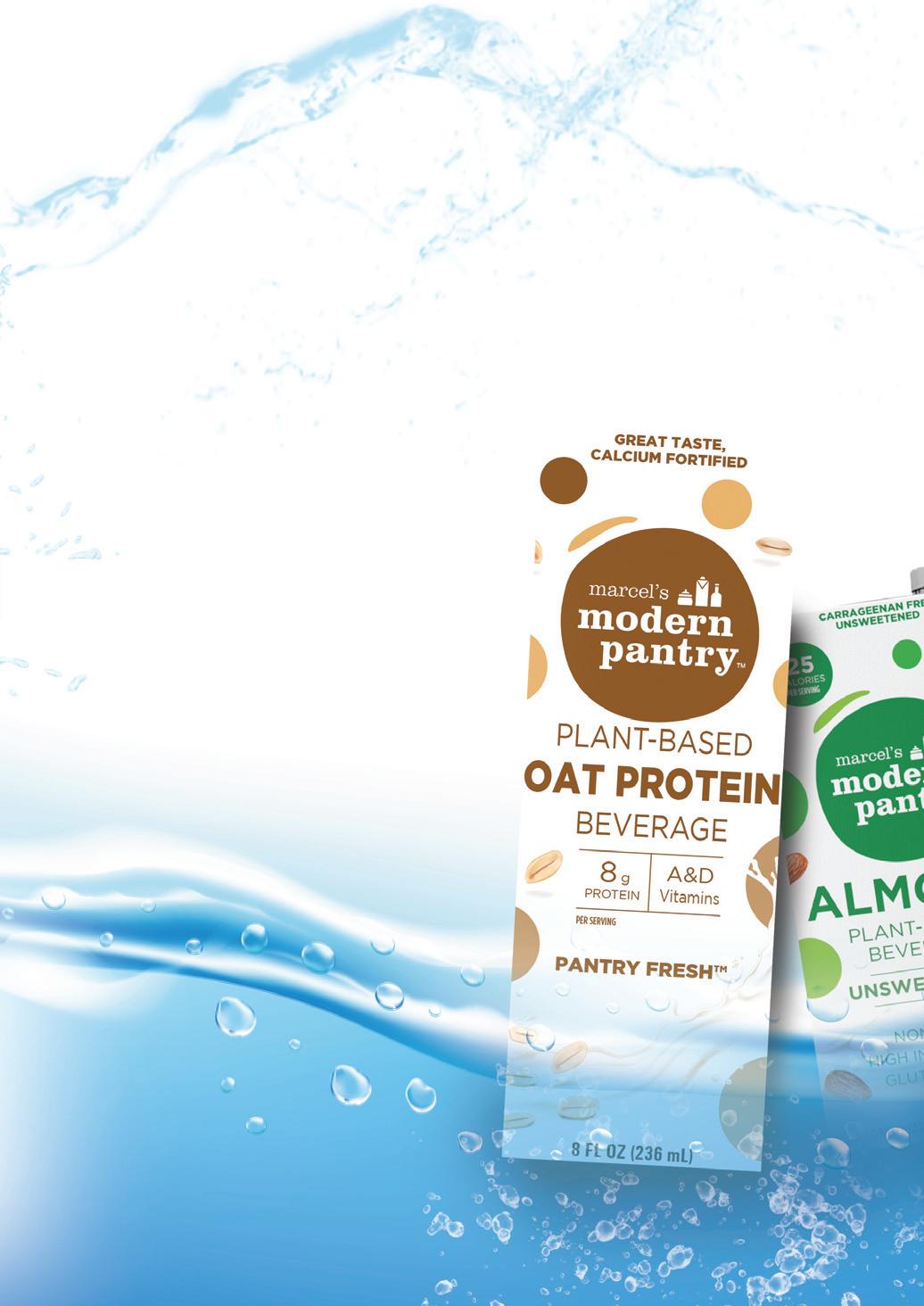
The term Pantry FreshTM is a unique one that Diversified Foods uses to describe its Ultra High Temperature (UHT) treated products. Otherwise known as shelf-stable or occasionally even ‘long-life’, Diversified Foods’ choice of the term Pantry Fresh TM is as strategic as it is interesting, according to Executive Vice President for Sales & Marketing, Eric Gafkjen: “In Europe, these products are very common and are known as ‘aseptic beverages’, but they’re not as common in the US. We don’t like the term ‘aseptic’ as it sounds too medical and sterile.
“Shelf-stable isn’t a bad term either but in the US, when consumers hear that
term, they automatically assume that preservatives are involved,” he continued. “US consumers are therefore generally sceptical of long shelf-life items, and they expect them to contain preservatives. Therefore, we trademarked the term ‘Pantry Fresh TM ’ and we use it as a replacement for shelf-stable labelling.”
The fact that shelf stability in Diversified Foods’ product portfolio is achieved without the need for preservatives is a particular selling point, as Mr Gafkjen pointed out: “There are many innovative products within the consumer-packaged goods industry, but most of the major shifts have involved preservatives being added to the process and that’s what provides the shelf stability in so many products. In contrast, all our products have zero preservatives added and are simply 100% Grade A milk.”
Importantly, Pantry FreshTM products, once produced, require zero refrigeration, both during transport and storage. This has substantial sustainability benefits throughout the value chain. Provided that the package is unopened, a Pantry Fresh TM product can safely move between a refrigerated
environment and ambient temperature storage and back again, with zero spoilage. This means that refrigerated containers and trucks are not required for the transportation of Diversified Foods’ products, saving untold amounts of emissions and vastly reducing energy usage. And since transport via refrigerated truck is more expensive, substantial transport costs are saved in the logistics chain.
Additionally, given that Pantry Fresh TM products easily outlast traditional dairy products, there is an enormous general reduction in waste, which is an issue that resonates with consumers.
Diversified Foods has an impressively diverse range of products that together ensure it continues to capture and retain vital market share. In general, the company offers a complete portfolio of both dairy and dairy alternative beverages and products, aimed at both retail consumers and business customers. Aside from its actual milk lines, it produces half-and-half, heavy whipping cream, almond milk, oat milk and protein shakes.
In 2022, Diversified Foods added a new brand to its portfolio, with the launch of its ‘Marcel’s Modern Pantry TM ’ brand of products. This series of products is the only complete portfolio of Pantry Fresh TM products available in the United States and therefore it’s an achievement of which
the Diversified Foods team is extremely proud. Marcel’s Modern Pantry includes a range of milk with all of the expected fat level varieties, as well as heavy whip cream, half-and-half, and a range of non-dairy products including oat, almond and protein drinks. The protein drinks contain an impressive 8 grams of protein, making them ideal for US school cafeteria programme nutritional guidelines.
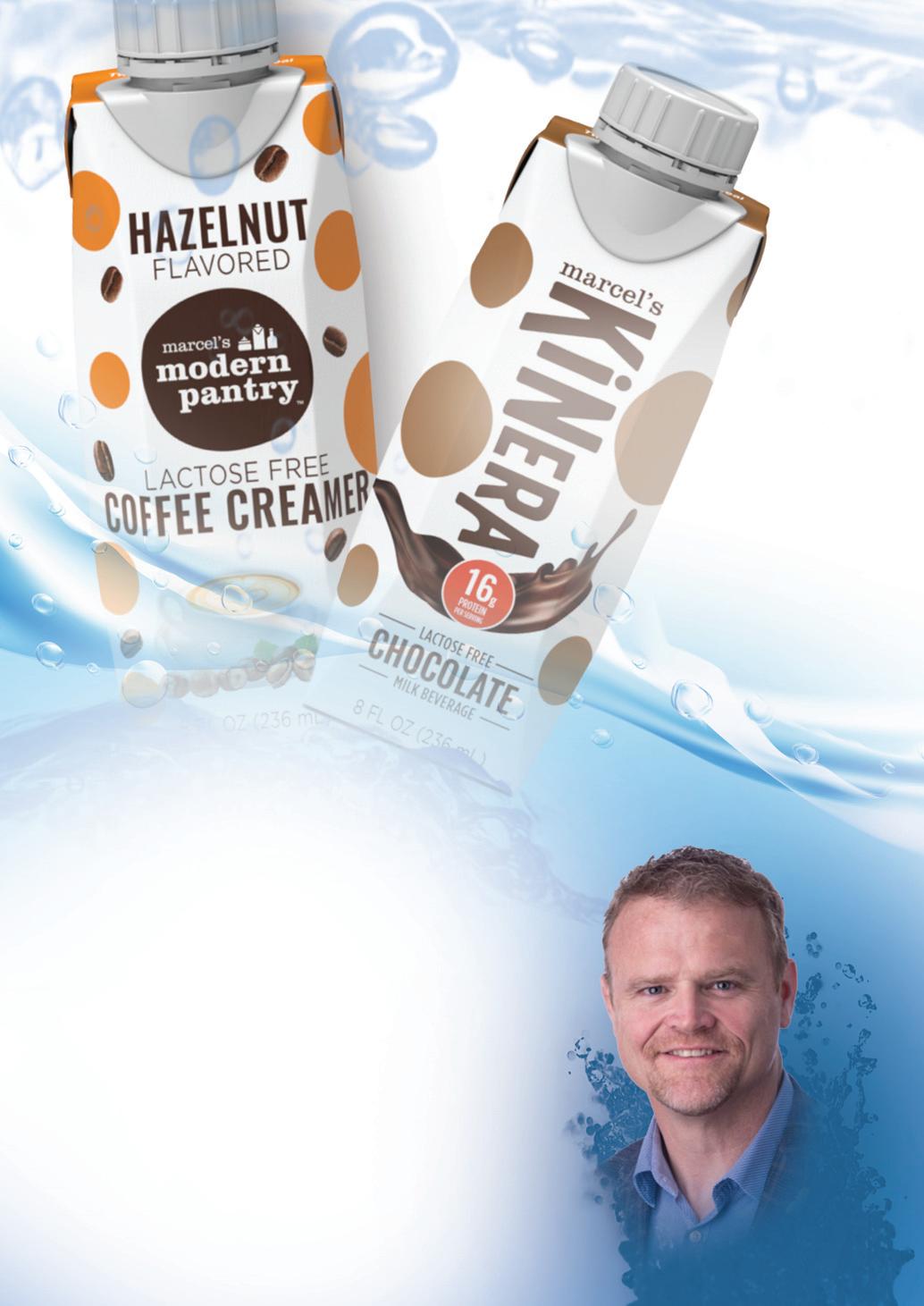 Eric Gafkjen Executive Vice President for Sales & Marketing
Eric Gafkjen Executive Vice President for Sales & Marketing
School lunch programmes continue to play a vital role in the US public education system. It’s also an important sales channel for Diversified Foods, which hopes to change public perceptions around nutrition while providing US school children with nutritious, delicious beverages that kids love.
“Prior government administrations shifted school lunch programmes in an effort to eliminate calories and deal with childhood obesity,” said Mr Gafkjen, “but through our market education journey, we’re pushing the need for healthy nutrition for kids, versus empty calories. Kids need healthy fats, including milk!
“We’re now seeing schools shift their dairy offerings to Pantry Fresh TM products with 1% and even 2% fat levels,” he continued. “The end goal of all dairy products should be to provide healthy
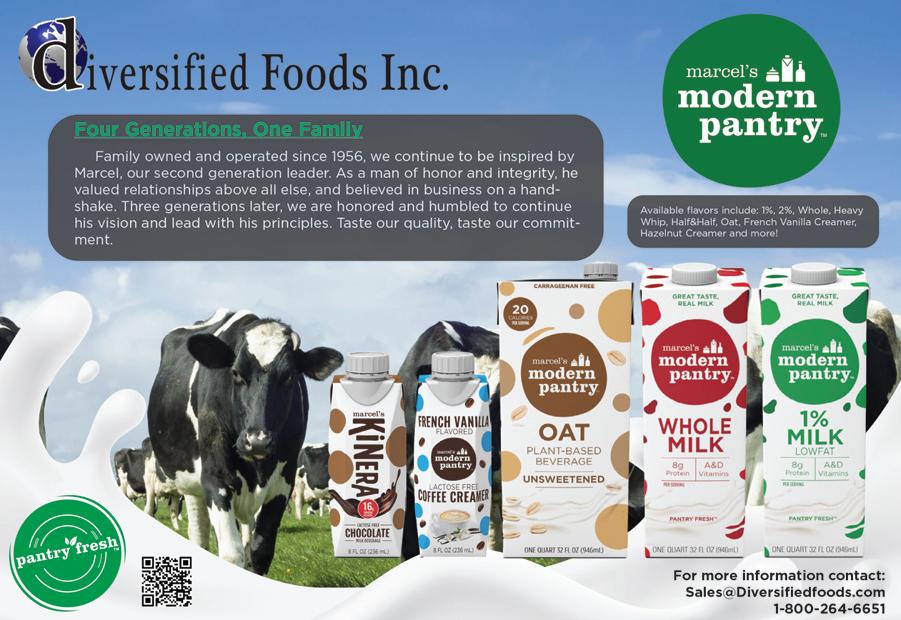
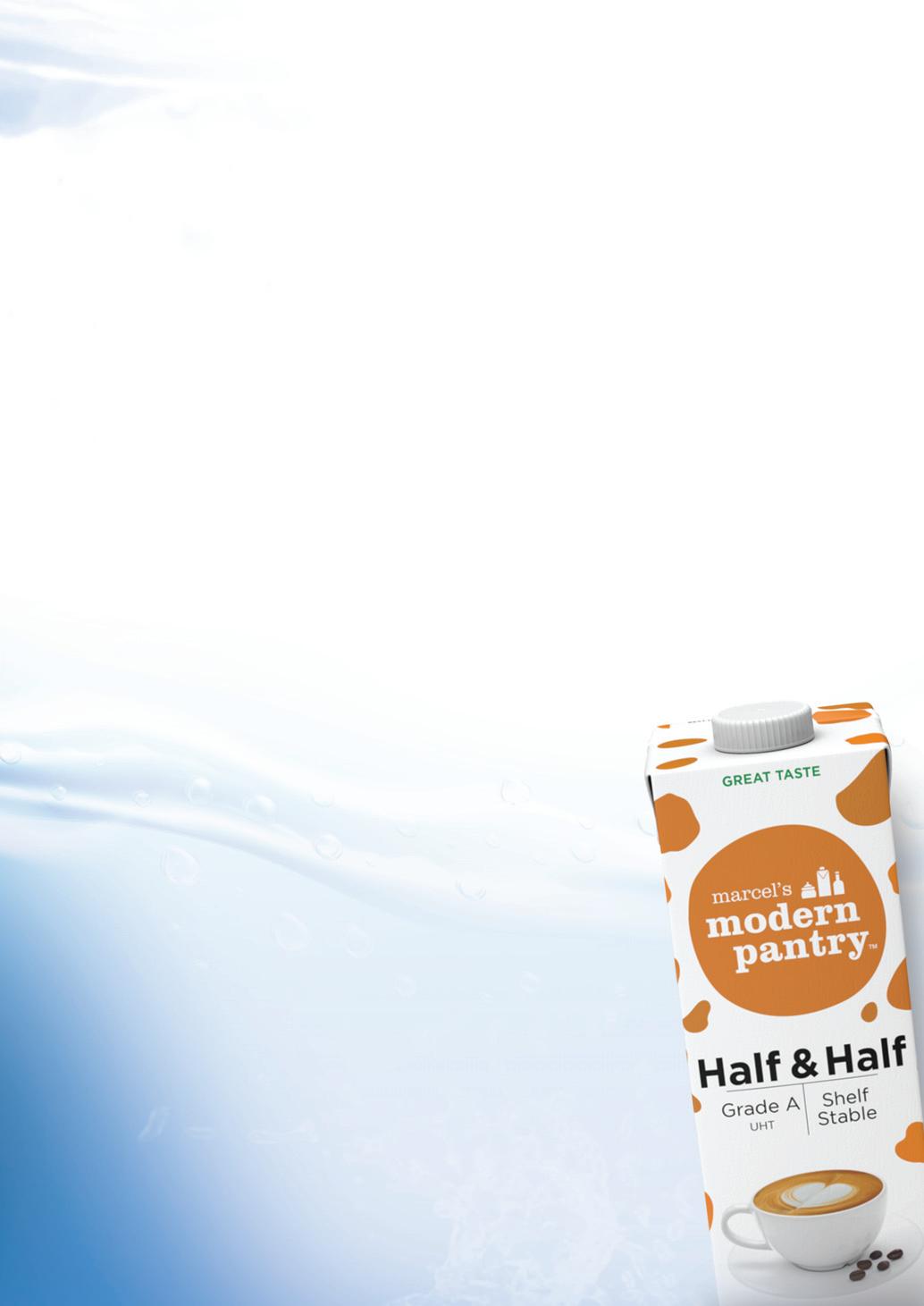
fats for kids, which milk provides, along with healthy, nutritionally complete meals. Within this effort, we’re also launching an 8-gram oat-based protein beverage for those consumers who are allergic to dairy. We’ve found that once a school district shifts to Pantry Fresh TM and they realise the benefits, they don’t leave. They become consumers for life!”
In closing, Mr Gafkjen reiterated the fact that Diversified Foods looks forward to continuing to educate US consumers on the benefits of buying Pantry Fresh TM products, all the while reducing carbon emissions and reducing overall complexity throughout the supply chain. “Every day is a new opportunity to be a solution,” he proudly exclaimed. “This alone is what drives each employee here. We’re excited about the company’s mission and its vision, and executing it each day is what drives every one of us.”

Diageo is responsible for a world-leading package of over 200 premium brands of drinks. Alongside managing the steady growth of this portfolio, Diageo is pushing forward with sustainable packaging options and a broad ESG programme. Report by Phil Nicholls.
The Diageo Sustainable Solutions programme asked innovators for ideas to achieve sustainable growth. Launched in 2020, the programme has launched three different rounds of creative challenges.
Of particular note, the second round focused upon sustainable packaging technologies. The process began in November 2021 and has now reached the pilot stage. Ideas under consideration include the use of sustainable containers, increased refilling or returning of bottles and updated packaging for shipping.
Diageo was formed in 1997 as a merger between Grand Metropolitan and Guinness. However, the brands within the Diageo portfolio stretch back a lot longer, with some reaching down into the 17th Century.
At the turn of the millennium, Diageo consolidated its assets with a focus on premium drinks. As the company progressed through the new century, it steadily expanded its range of brands with additions such as Captain Morgan, United Spirits Limited and Chase Distillery. In 2022, Diageo moved its global headquarters to Great Marlborough Street in London, within the heart of Soho.
Diageo currently has over 200 brands within the premium drinks sector, with sales in more than 180 countries. The company operates 132 production sites and employs around 28,000 people globally. 2022 brought a 21% growth in new sales to £15.4 billion, delivering an operating profit of £4.4 billion.

“Diageo has, again, delivered strong performance, despite the challenges that all consumer goods categories have faced this year,” said Chairman Javier Ferrán in a statement summarising the company’s 2022 annual report. “We continue to invest for the future to sustain the momentum in our brands and deliver a positive impact on society.”
The extensive Diageo portfolio features two of the top four international spirits brands by retail sales value: Johnnie Walker and Smirnoff. The Johnnie Walker range of blended Scotch Whisky has pushed boundaries for 200 years. Available varieties include Black Label, Red Label and Gold Label. Diageo’s most popular blend is the Johnnie Walker Blue Label, hand-selected from rare Scotch Whiskies with a remarkable depth of flavour. Only one in 10,000 casks makes the cut.
Smirnoff holds the position of the world's number one vodka. Established in 1864, Smirnoff is created through a unique process involving three distillations and ten separate stages of filtration. The brand is also offered in flavours such as Raspberry Crush or Mango & Passionfruit Twist, plus a range of seltzers and ready-todrink cocktails.
The extensive Diageo portfolio also holds iconic brands such as Guinness, the world-leading stout, established in 1759. This classic black beer continues to innovate with the launch of the alcohol-free Guinness 0.0% and Guinness Cold Brew Coffee Beer. Another iconic line is Baileys, the world’s first cream liqueur created in 1974 and now a much-loved spirit across 160 countries.

Other highlights of Diageo’s package of 200 premium drinks include Tanqueray, the world's number one premium gin, Captain Morgan, a spirit made with the finest Caribbean rums, and Gordon’s, the world’s number one international gin.
As part of Diageo’s drive to ‘deliver a positive impact on society’, the company is running the Sustainable Solutions programme. The Cohort 2 challenges from Diageo focused on the development of sustainable packaging technology for its extensive portfolio of drinks. The pilot stage of this challenge draws together an exciting selection of schemes.

One such project addresses the challenge of glass bottles, which are energy intensive to manufacture, move and recycle. To solve this problem, Diageo is exploring the use of renewable content alternatives and the possibility of innovative metal container formats. The goal is to find a low-carbon solution with minimal associated waste.
A second strand of Cohort 2 investigates a circular business model for reuse and refill archetypes, with an emphasis on consumer-focussed sales. This concept requires both containers adapted to a number of reuse/refill cycles, plus an innovative scheme to engage customers and ensure their participation.
Additional challenges being addressed in Cohort 2 concern the implementation of decoration techniques on glass bottles which do not hinder the sustainability credentials of the glass. Diageo is also exploring solutions to optimise glass bottles and other container formats with the associated packaging for shipping. The standard 6- and 12-pack formats were designed for bulk palletised loads, but alternate packaging options could reduce waste.
Further evidence of Diageo’s commitment to sustainable busi ness was the recent announcement of a hydrogen-powered furnace together with Encirc to change the face of UK glass

Diageo’s pioneering grain-to-glass Sustainability Targets for 2030 compel the company to:

• Become sustainable by design
• Preserve water for life
• Accelerate to a low carbon world
manufacturing industry. This partnership aims to create the world’s first net zero glass bottles at scale by 2030. Encirc will build a new furnace at its Elton plant, Cheshire, that will use an energy mix of green electricity and low carbon hydrogen. It is expected that carbon capture technology will deal with the remaining emissions by 2030.
“We are really excited to be a part of this world leading announcement,” said Ewan Andrew, President, Global Supply & Procurement and Chief Sustainability Officer at Diageo. “This forms part of our commitment to halve our Scope 3 carbon emissions by 2030. We look forward to a world where people can enjoy their favourite drinks from zero carbon glass bottles.”
The use of the zero-carbon furnace will contribute towards Diageo’s commitments in its ESG action plan Society 2030: Spirit of Progress to reduce emissions across its supply chain by 2030. Under this 10-year ESG action plan, Diageo is working towards creating a more inclusive and sustainable world.
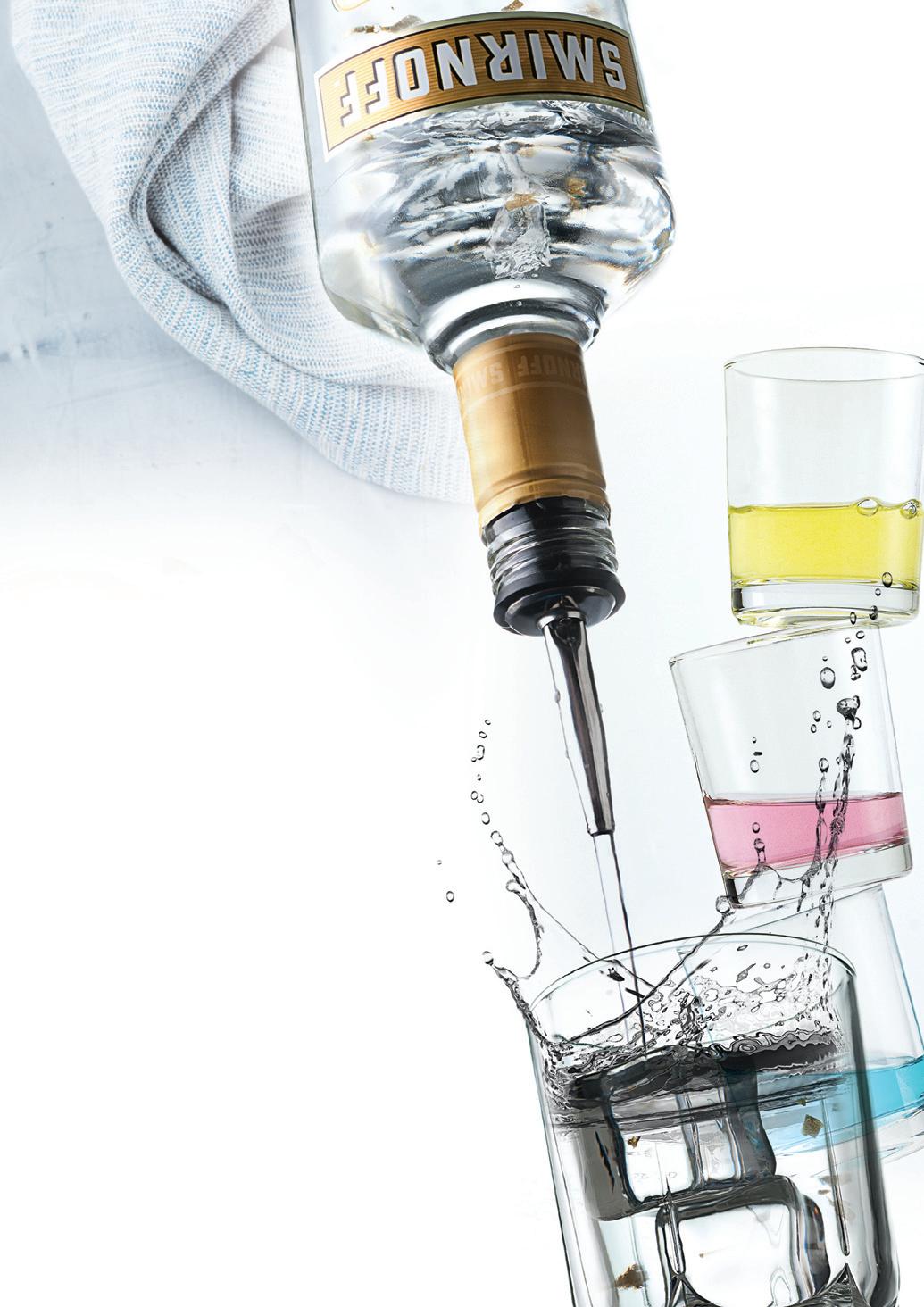
The multi-strand ESG plan includes projects to promote a positive drinking culture and champion inclusion and diversity at every level of the business. Society 2030 also features Diageo’s pioneering grain-to-glass sustainability work with three major goals.
Alongside these assorted environmental projects, growth continues. At the start of 2023, Diageo reached an agreement to acquire Don Papa Rum, a super-premium, dark rum from the Philippines. The initial consideration was €260 million, with a second possible consideration of up to €177.5 million through to 2028 subject to per formance, reflecting Don Papa Rum’s current growth potential.
Diageo remains committed to its position as a global leader in the premium drinks sector, leadership in terms of both portfolio size and driving the sustainable agenda within the industry.
“Our people are engaged and proud of Diageo,” concluded Mr Ferrán in the company’s 2022 annual report. “We continue to invest for the future to sustain the momentum in our brands and deliver a positive impact on society. We have consistently shown resilience in the face of volatility in recent years and proven our ability to emerge stronger in these circumstances.” n

from crop to consumption
qupaq intertan rademaker
macintyre chocolate systems tp food group – north america

QUPAQ is the leading global provider of tray denesting and handling solutions for food producers. Developing market-leading technology, the company helps customers reduce manual tray handling with automated solutions, ‘safely, simply and profitably.’ Hannah Barnett learnt more about what this means from CEO Kim Weidemann.
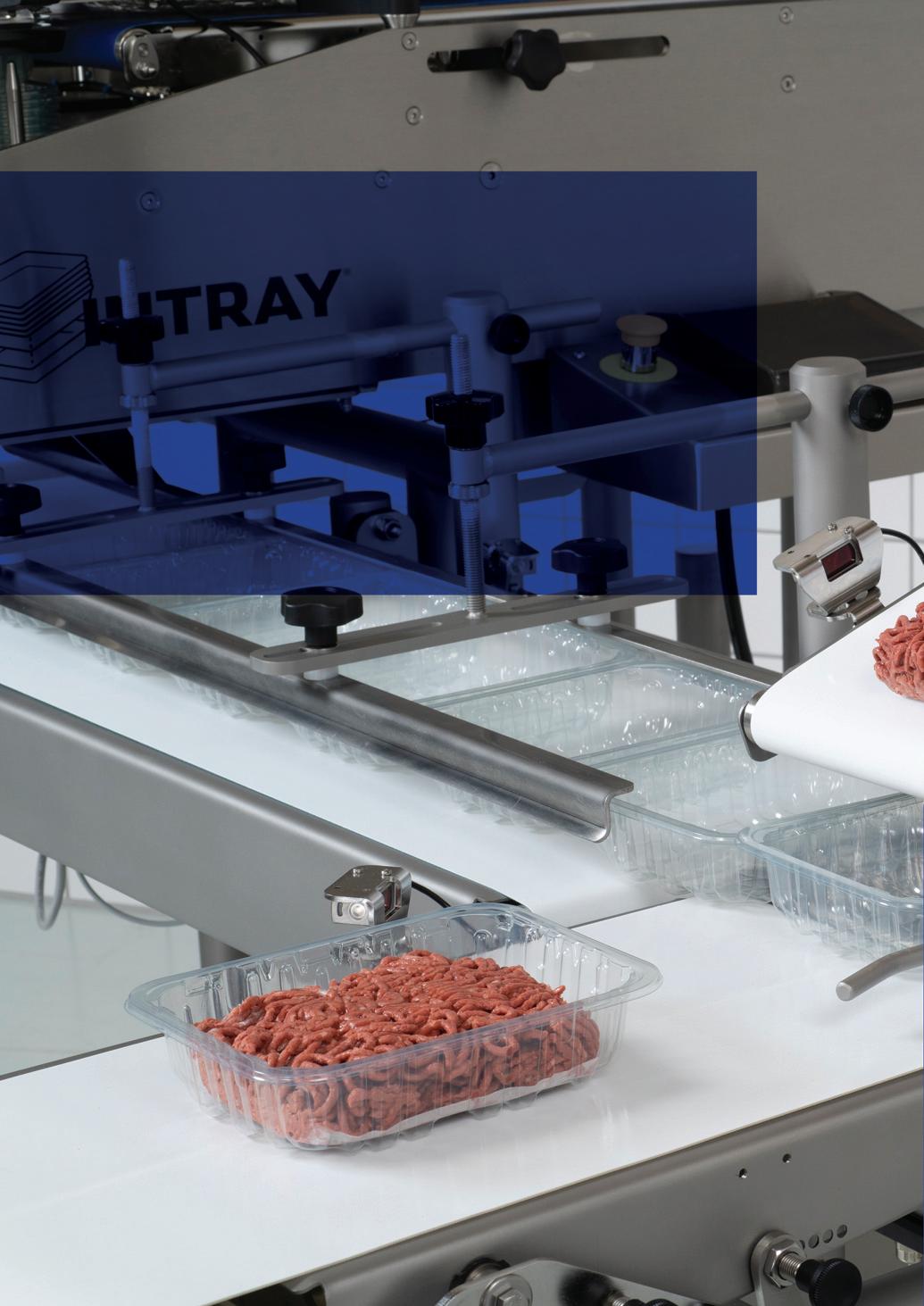
Tray denesting is the process of separating trays that are stacked together, then placed on a conveyor for individual loading. In manufacturing operations that load products in trays, filling rates can only be increased as quickly as trays can be separated and placed under the loading device.
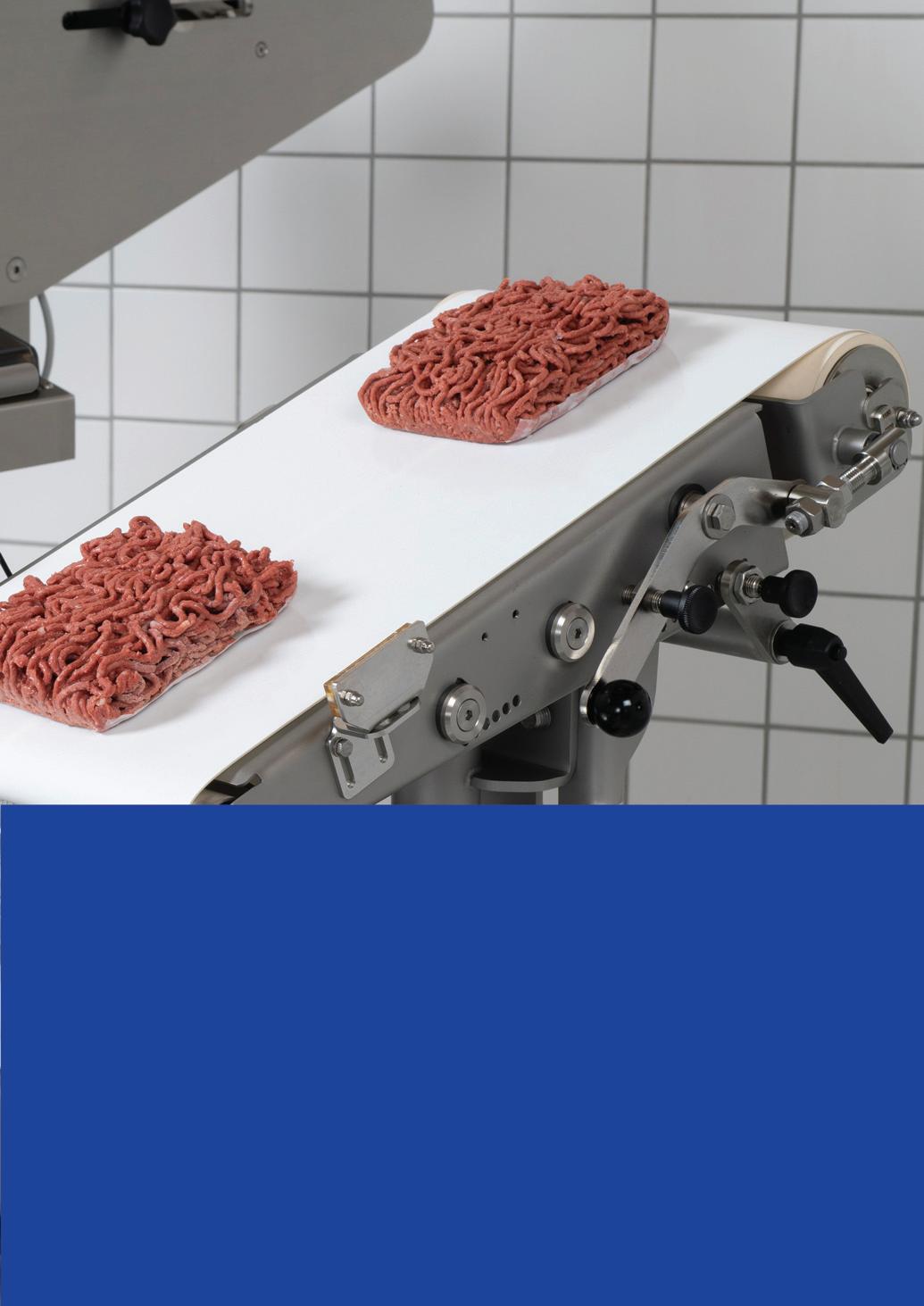
QUPAQ, in its current form, is relatively new, having changed name from Intech in April 2022. This was to reflect the 2021 merger of Intech and the denesting division of seafood processing company Carsoe. QUPAQ seeks to combine the best of both, with a product portfolio that includes the leader in electrical denesting equipment, INTRAY, and the leader in pneumatic denesting equipment, ANYTRAY. The company developed and pioneered both denesting technologies and will continue to do so.
QUPAQ CEO Kim Weidemann explained the rationale behind the merger: “We wanted to create a bigger player with lots of growth potential. And to go beyond denesting and
expand into the whole packaging operation. Once you have loaded food products in the container or tray, you could make it into a full logistical operation, packing the filled
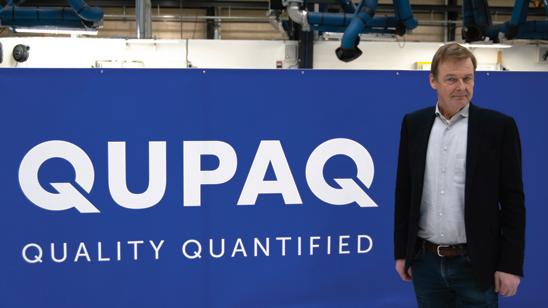
and sealed trays in boxes ready for shipment. That's basically the logic of it. Combining the two divisions gave us a broader product programme and new possibilities, because we took the best from both worlds and brought them together.”
Annually, QUPAQ currently denests and handles over ten billion trays for food packing across more than 50 markets. The company sells its automation systems to food producers, integrators and re-sellers worldwide. Its product portfolio comprises the world’s largest modular range of denesters, conveyors and related equipment for efficient tray handling.
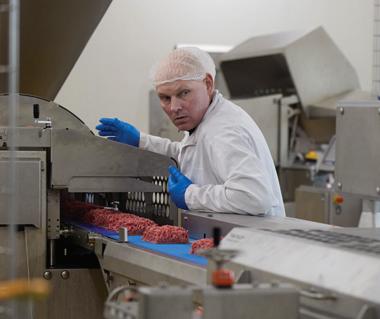
End customers includes the biggest manufacturers in the world: Nestlé, Tyson Foods, Mondel e - z, Tönnies, Cargill, Hilcona, Bonduelle, Martinez, Hubers and many more.
Headquartered in Brønderslev, Denmark, QUPAQ employs around 100 people. “In 2021, we opened a sales office in Germany,” said Mr Weidemann, “and we are currently working on establishing premises in the US to further open that market and have boots on the ground. We have a lot of outsourced processes in the neighbourhood, and we are thereby quite agile in our production set up.”
According to Mr Weidemann, QUPAQ is a company with a global reach: “We are stretching our market globally and are right now supplying machines in Australia and Argentina. I think you will find most of our products on all continents. We also have a good number of partners selling our machines. They are mainly in Europe, but we have the ambition to further expand our partner network to the rest of the world.
“We're working with a lot of integrators who are buying our machines to be a part of their production lines. We work both as a white label supplier, but also as a branded product.”
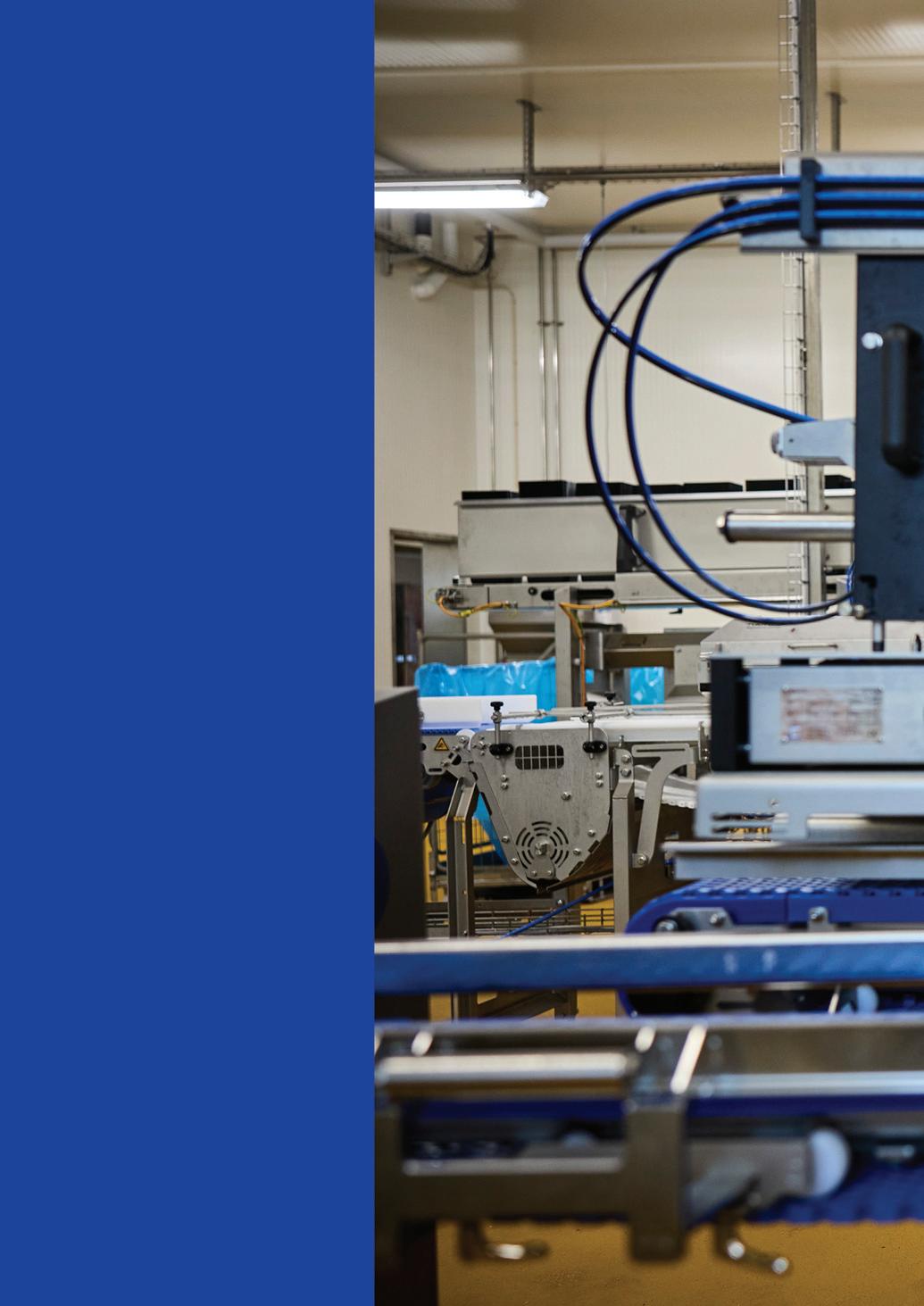
Perhaps the most significant result of the merger is the range and quality of denesting possibilities now on offer. As Mr Weidemann put it: “We are flexible, and now we can offer both a pneumatic and a servo solution.”
One of QUPAQ’s flagship products, the INTRAY Step Loader, is designed to automatically denest trays and gently load various product types directly, with the possibility

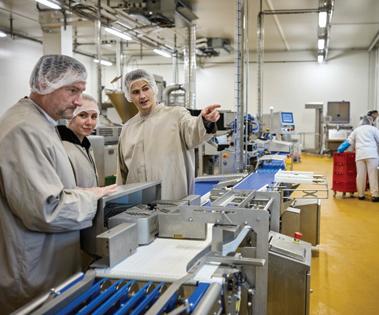
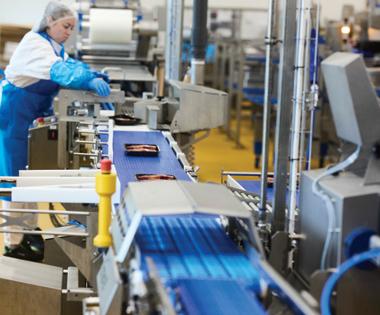
2.5 million
More than 2.5 million portions of minced meat are packed every day on QUPAQ production lines.
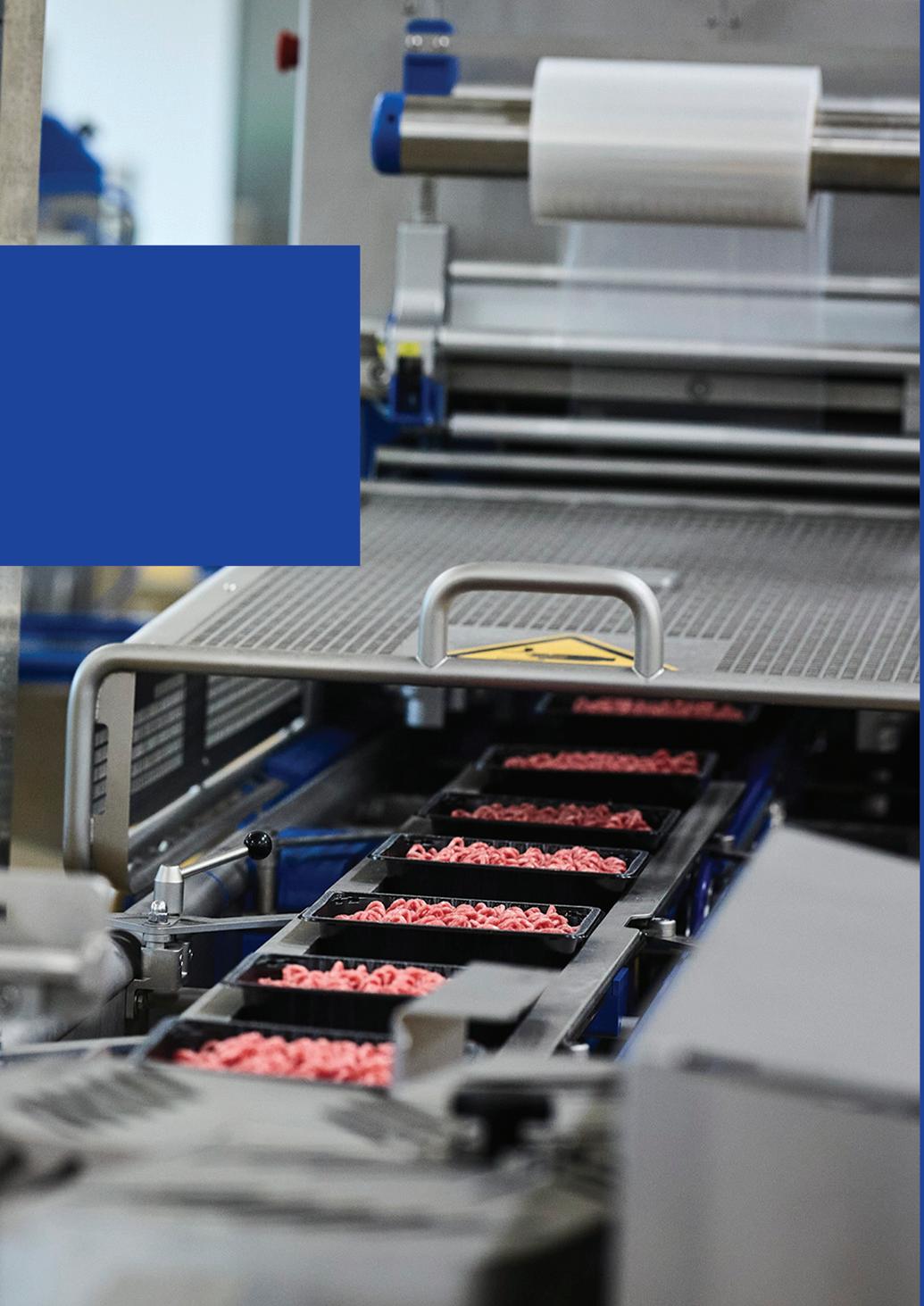
of several individual loads in the same tray. This enables the slicer to load cheese and salami into the same tray.” The Step Loader offers an in-line compact solution to handle high capacities at high speeds, due to an innovative tray handling design.
The other significant machine is the ANYTRAY pneumatic denester. It is designed for production flows of up to 120 trays per minute, the go-to choice for food producers who want the full advantages of packing automation.
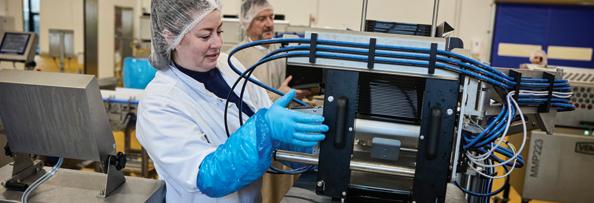
“We have fast changeover times when shifting to other tray sizes,” Mr Weidemann explained, “and we have very good run times on the machines. They are quite steady in their performance; they don't demand a lot of maintenance or spare parts. They are simple and quite easy to operate, to maintain and to wash down. So, both in operation and hygiene we are excelling.”
There has no doubt been a lot of exciting activity happening at QUPAQ in the last few years. But has the company been impacted by disruptions in the global supply chain?
“There's been some turbulence,” Mr Weidemann reflected, “mostly on
the electrical side, where the supply chain is long, and we depend on supplies from large electronic companies. But we haven't been hard hit. I think it looks like things are easing up and I don't think that will be a major challenge going forward.”
The company is not standing still. Like any successful business, it is constantly looking for ways to adapt, evolve and innovate.
“We’re still discovering new ideas,” said Mr Weidemann. “Like ‘how we can better assist our clients with their ease of operation?’ We are looking into what the next generation of denesters will deliver. And then, ‘what about the next generation of loading systems? What do they look like?’ Then I think we will do improvements on the sales-tools we give to our partners, to ease their inter -
action with us as a company. To make things smoother.”

QUPAQ have delivered several customtailored solutions including elevators, where the trays are loaded into the buffer from a different floor, high-speed solutions with 320 products loaded per minute and several unique handling solutions. All based on off-the-shelf technology customised for specific applications.
As the CEO pointed out, since the merger, QUPAQ is a still new company. But the results seem to be paying dividends. “Succeeding in this and monitoring the progress from day-today, week-to-week, month-to-month, is very fulfilling,” Mr Weidemann concluded. “We have seen steady improvement of the company processes. It is quite cool to watch and to be a part of.” n

Intertan is a family-run business, ingrained with four generations of innovating leaders – each leaving a memorable mark on the business. With its 100-year anniversary on the horizon, the company has lots of exciting investments in the works. Business Development Supervisor Olga Fountoukidou discussed this and the company’s dedication to sustainability, in conversation with Imogen Ward.
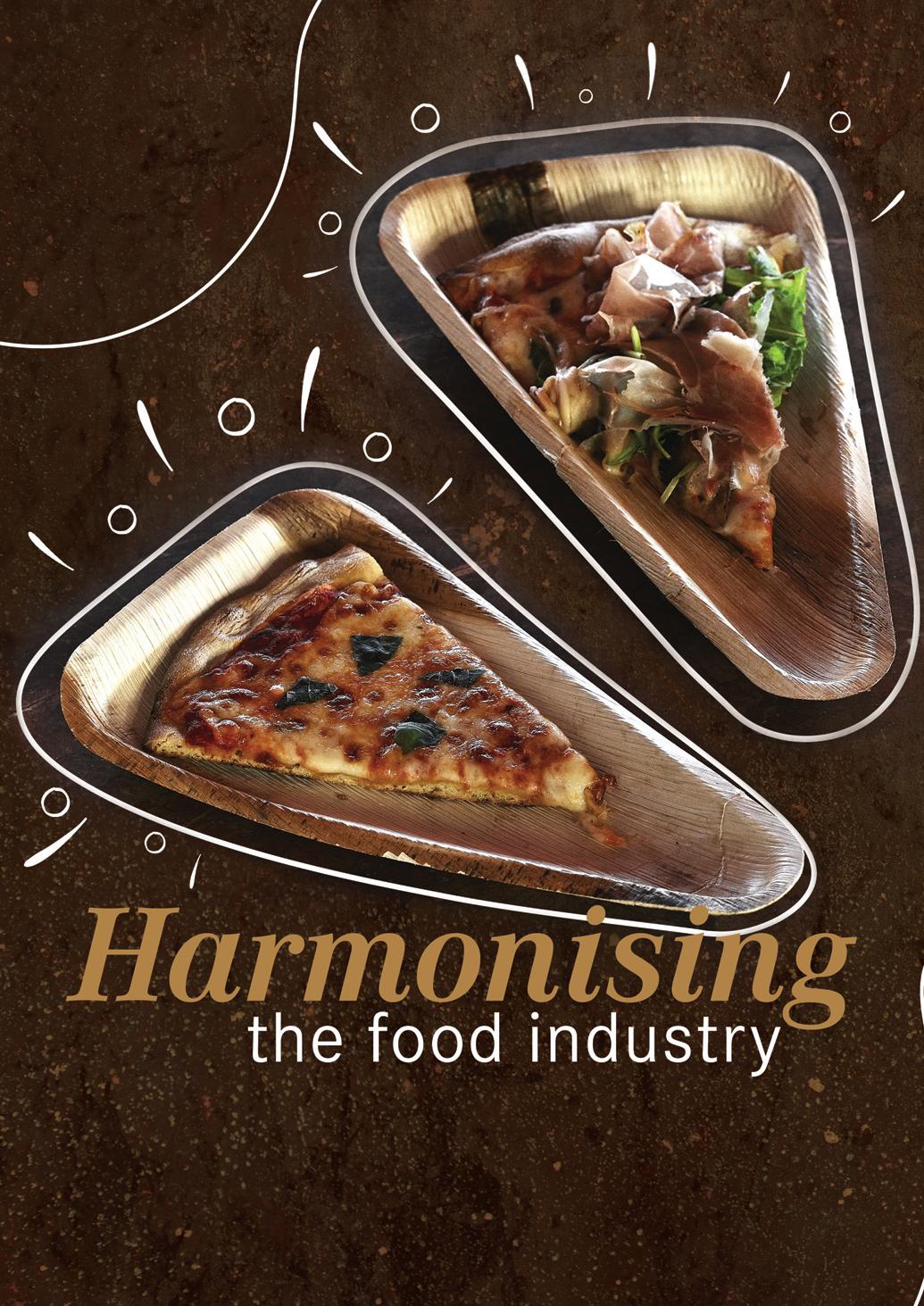
Over the years, Intertan has had several huge milestones shape the company into what it is today. As a wholesome, family-run business with strong moral values, Intertan is well-established within the food and drink industry. It has worked tirelessly to maintain its quality-driven reputation: Implementing a highly advanced quality control department, all its products are brought to the market offering the best food packaging solutions at the most competitive prices.
Maintaining a long-lasting partnership with Nestlé, Intertan is the exclusive representative of Nestlé products across central Greece. This relationship, spanning 50 years, highlights Intertan’s prestigious presence and reliability within the industry. Its entrance into the disposable food packaging market in 2010 led to new achievements for Intertan. The company made the bold decision to dedicate its resources to the development of eco-friendly, biodegradable products. This ensured that its disposable products do not add to global landfill issues.
This compelling change occurred in 2015, bringing Tessera Bio Products to life. Aptly branded Tessera – which, when translated to English, means four – the name represents the four elements of matter, signifying a perfect balance, harmonised with nature.
Company owner Anastasios Taniskidis understood the importance of producing sustainable products; from this knowledge, Tessera was born. As an innovative company, Intertan leads the way for the rest of the market – becoming a positive influence in the food and drink industry.
“Mr Taniskidis really believed that this would be an important step for our company,” Business Development Supervisor Olga Fountoukidou said. “Now, of course – seven years on from Tessera’s beginning – the industry has completely adapted. Legislation is completely different, and the consciousness of consumers is more focused on environmental impacts.

“Intertan is a flagship, not only for us, but for the whole of Europe. We have always known the steps we take are very innovative and provide important solutions to the industry. That’s why we dedicate so much of our resources into research & development and our quality control departments.”
With an ingenious array of biodegradable components the Tessera range incorporates palm leaves from Areca trees, bamboo, and birch wood; all of which are farmed from responsibly managed plantations.
The company also utilises sugarcane in the production of packaging lids and biodegradable containers. The use of sugarcane is great in the food industry due to its high water and fat resistance, making it the perfect partner for on-the-go meals.
Fully utilising its natural surroundings, the company has also developed a unique line of disposable cups. These paper products are internally lined with a water-based emulsion coating, making it entirely waterproof without the need for any harmful plastics. The cups are completely compostable and will biodegrade after
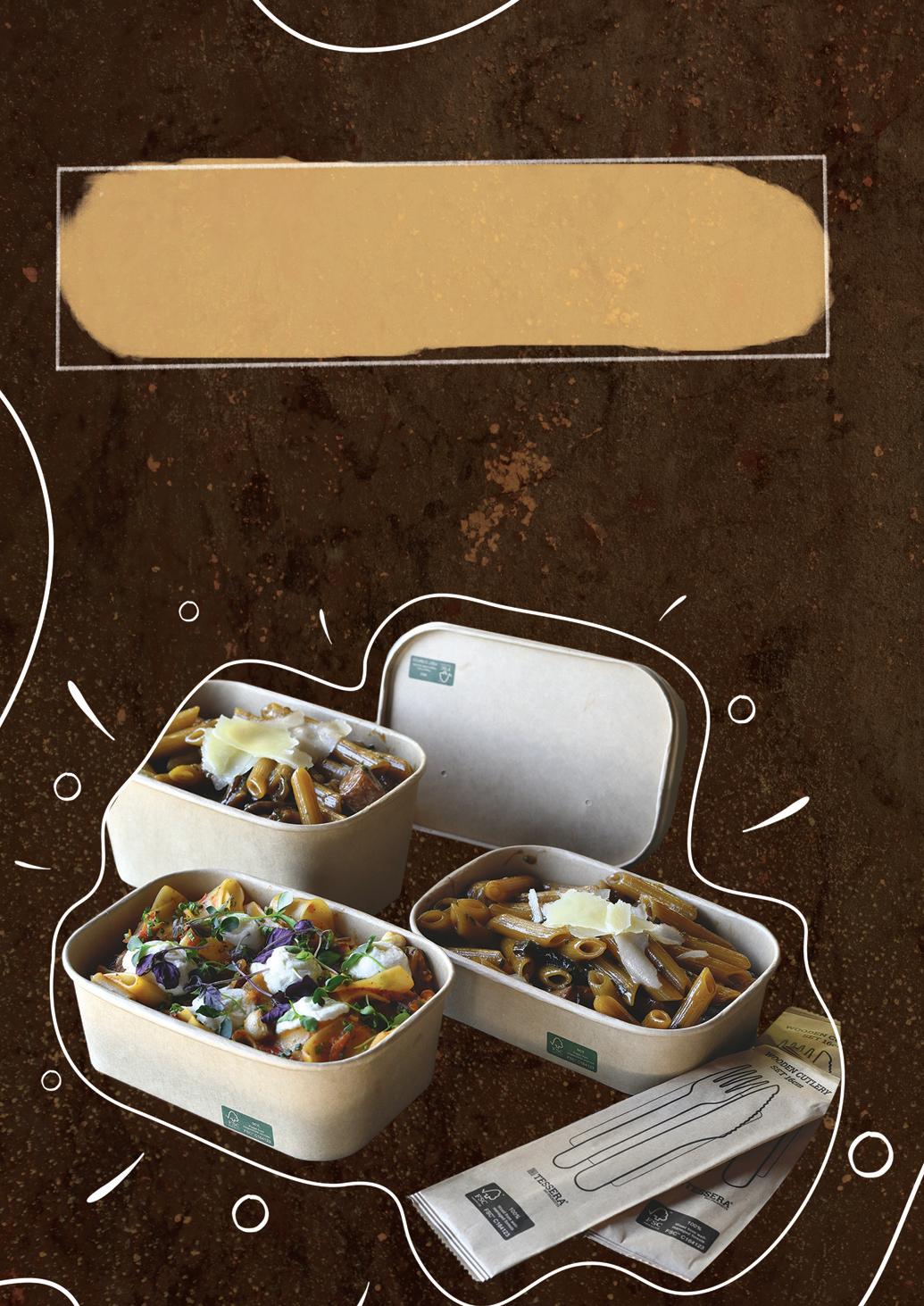
“With an ingenious array of biodegradable components the Tessera range incorporates palm leaves from Areca trees, bamboo, and birch wood; all of which are farmed from responsibly managed plantations”
75 days in dry conditions; this process occurs even quicker in a wet environment – boasting a speedy 52-day cycle before it can be used to help fertilise soil.
Intertan is always thinking of its environmental impact, and the ways it helps sustain the planet. The company’s R&D department is focused on researching the latest innovations to accomplish this. Intertan also chooses producers who are fully certified and have extensive quality management surrounding them.
By incorporating clean energy into its production processes, Intertan successfully utilises solar panels – minimising its nonrenewable energy usage – and is always searching for the greenest ways to travel. This green philosophy is also being translated to the employees’ personal lives too, with them following Intertan’s admirable example.
The company is consistently assessing the impact of its products; in doing so it has realised the importance of the packaging’s life cycle, Ms Fountoukidou explained: “We are always researching into how we can complete the life cycle of our products.

“By this I refer to our ability to create a continuous production cycle, recycling used products to create new ones. Whether this means investing into collection and recycling or furthering our efforts in composting; we really want to ensure our products leave no waste behind.”
Committed to educating consumers on the importance of being sustainable, Intertan ensures that its knowledge is passed on to both adults and children. Ambassadors from the company regularly visit local schools to give talks on the environment. Intertan wants to highlight the importance of maintaining ecosystems, endeavouring for a positive effect on people’s perspectives.
The employees at Intertan are just as passionate as the company, fully dedicated to reaching Mr Taniskidis’ goals. “Food packaging is something that can get ignored in our everyday lives,” Ms Fountoukidou said. “We do not pay much attention to it, but it surrounds us; from the morning cup of coffee to the takeaway container that holds our dinner.
“Being able to produce food packaging that can make a difference is such a big deal, we have a real impact on the environment and more than that, we have the ability to incite change in the industry too.”
Outside of its important work towards a more sustainable future, Intertan is establishing the company’s vision for growth. Intertan has added an impressive 500,000 square metres to its name, located in Central Greece. The new facility will be a state-of-the-art logistics centre that specialises in food packaging.
This building is a promising investment; Intertan is hoping this centre will become one of the biggest commercial hubs in Europe . It’s position as a bonded warehouse will also aid this desire for expansion, enabling it to easily import products.
The company is keen to further its reach within the food market: Intertan is also planning to open a warehouse in the UK – this investment will have a hugely positive impact on the local economy. In doing so, it will create more job opportunities, resulting in a boost for the eco-friendly food sector.
Another important investment will see Intertan entering the healthcare sector. Medical PPE is a vital resource for those working within the healthcare industry; by producing masks and medical grade gloves, the company ensures safety within the hospital environment. This fantastic enterprise further highlights Intertan’s commitment to its customers and the community more widely.
In reference to customer loyalty, Intertan has ensured the completion of all contracts through its personal and attentive approach despite the current global supply issues. “One of the core philosophies that Mr Taniskidis has passed to all of us at Intertan,”Ms Fountoukidou concluded, “is to never underestimate the power of personal contact. That is why we regularly travel; we want to build those relationships as much as possible.
“That philosophy is so vital to the business, and it is why I can proudly say that we have over 70 strategic partners and suppliers. Having previously worked in the purchasing department, I have a lot of experience with developing these relationships. I know first-hand how vital they are to the success of Intertan.” n


Rademaker develops and provides solutions for the food processing industry, specifically the bakery sector. The company’s expertise manifests itself in highquality automation, engineering, hygiene and performance of its delivered machinery. Joris Mulders (Sales Director UK, Ireland, South Africa, Australia & New Zealand) let Hannah Barnett in on the secrets of the company’s success.

According to Joris Mulders a lot is changing in the bakery machinery business. With ever increasing labour costs comes higher demand for automated machinery. Covid played a part too.
“ The pandemic was a catalyst for even more automation,” he said. “I think the vulnerability of the whole industry became apparent because people were getting sick and had to go into lockdown. Availability of workforce resulted in problems for production capacity. In addition, a shortage of labour arose in many countries. The outcome of these situations is a higher demand for automation.”
Founded in 1977, Rademaker was one of the first companies to specialise in the development and supply of innovative solutions for the bakery industry. These days, annual turnover exceeds €100 million and the company is one of the front-runners in its field.
Rademaker is recognised for working at the cutting-edge and manufacturing high-end equipment. Besides that, there is a global presence which provides a service that goes well beyond the delivery and installation of bakery production lines. “We are

known for our innovations and are capable of creating customer-specific solutions,” Mr Mulders explained. “We discuss with customers about how we can transform their traditions into an efficient production solution to suit their needs.”
The company headquarters is located in Culemborg, the Netherlands, but Rademaker has sales offices worldwide including Germany, the UK, the USA, France and China. With more than 570 employees, the Dutch headquarters has approximately 400 personnel. There is also a production facility in Slovakia which employs an additional 160 workers.
There are two dedicated technology centres, where clinical trials are conducted: one in the Netherlands and the other in China. “The Dutch facility is run by a group of 16 highly experienced technologists and master bakers,” said Mr Mulders.
The Radini production system is one of the company’s most recent developments. It offers the possibility to partly or fully automated production. This means automated functions can be combined with manual process steps such as dough supply, fat application,
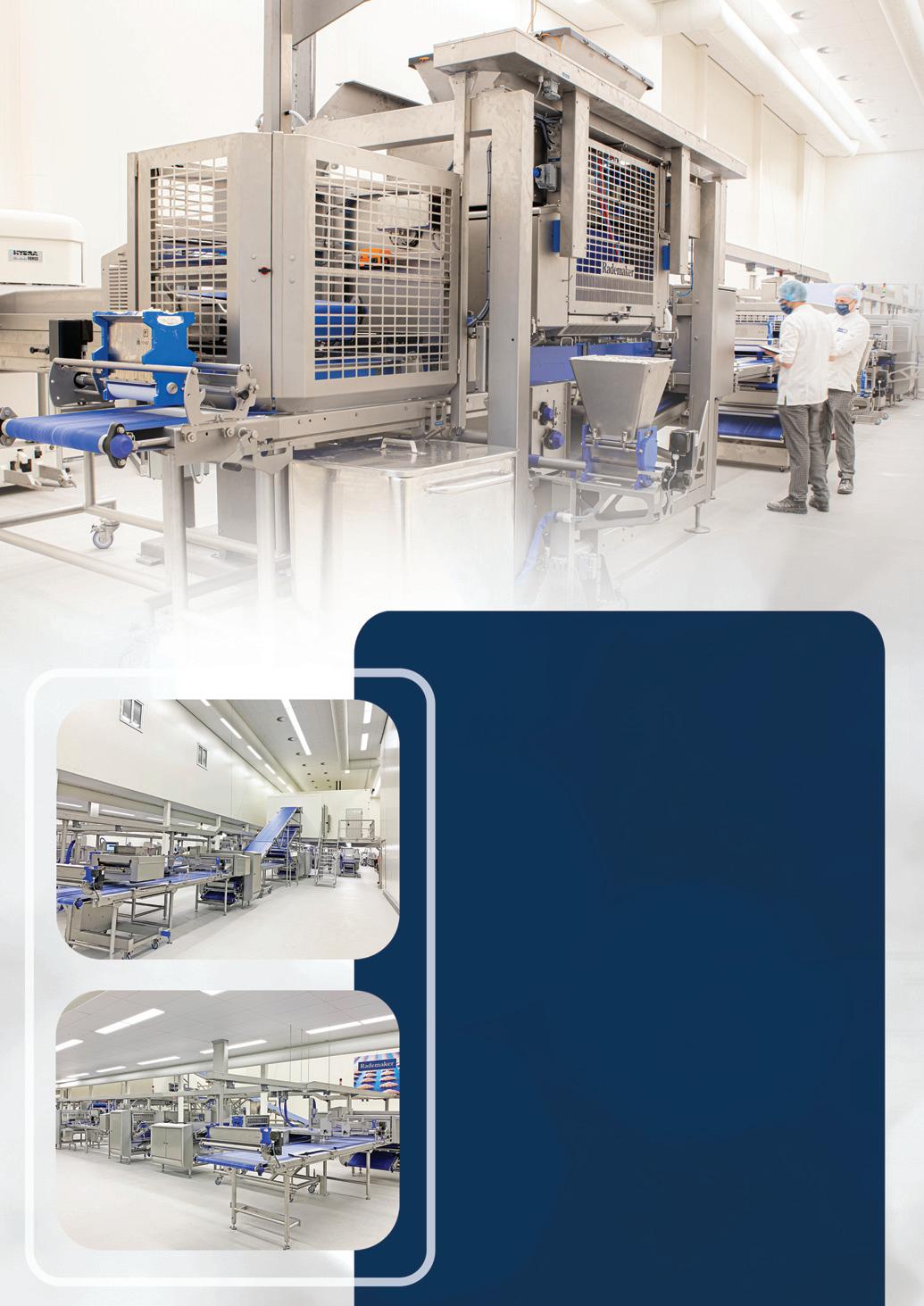

offline resting and cooling, as well as additional shaping steps for specialty products.
“Radini is a new product portfolio that we designed and developed five years ago,” said Mr Mulders. “It provides a solution for bakeries that need equipment with a capacity between 400 and 1,000 kilogrammes per hour.”

In comparison, Rademaker’s high-capacity customers, some of which the company has been working with since 1977, require production lines that can reach up to 10,000 kilogrammes per hour. The Radini meets the growing demand in the market for smaller scale production, because besides the labour shortages, companies also want to produce more efficiently.
“They have a lot of manual labour in those semi-automated bakeries,” Mr Mulders explained. “And that is expensive. It's not that they are going to fire people by introducing automation, but they want to dedicate them to specific products. The Radini offers a more efficient manner of production, that lowers costs and improves margins overall. Radini production systems have an operator friendly HMI and are designed according to the latest hygiene levels.”
Another exciting piece of equipment is the Rademaker Wax Double Chunker Sheeting System (DSS).
Due to the increase of raw material prices, bakers are returning to traditional methods. This means high-quality, healthy breads with great taste, soft internal crumb and crispy crust. It requires dough with a high-water percentage and a long pre-fermentation time.
Mr Mulders explained how Rademaker anticipated this development: “We keep an eye on trend cycles alongside our international sales offices, so we have a very good feeling of what is upcoming and what is declining. We still see a big trend for artisanal bread, which means long pre-proves and high-water content.
“The Wax DSS pre-sheeter is specially designed for bread lines which process dough with a high-water percentage. It has a better weight accuracy and higher water content compared to its predecessor. The Wax DSS also has a very light dough handling. The dough needs to be handled as gently as possible to make sure that the quality is optimal, just as a customer expects.”
In 2017, Rademaker and The Women's Bakery, based in Rwanda, joined forces. The intention of the partnership was to improve process and product quality at local bakeries, established by The Women’s Bakery.
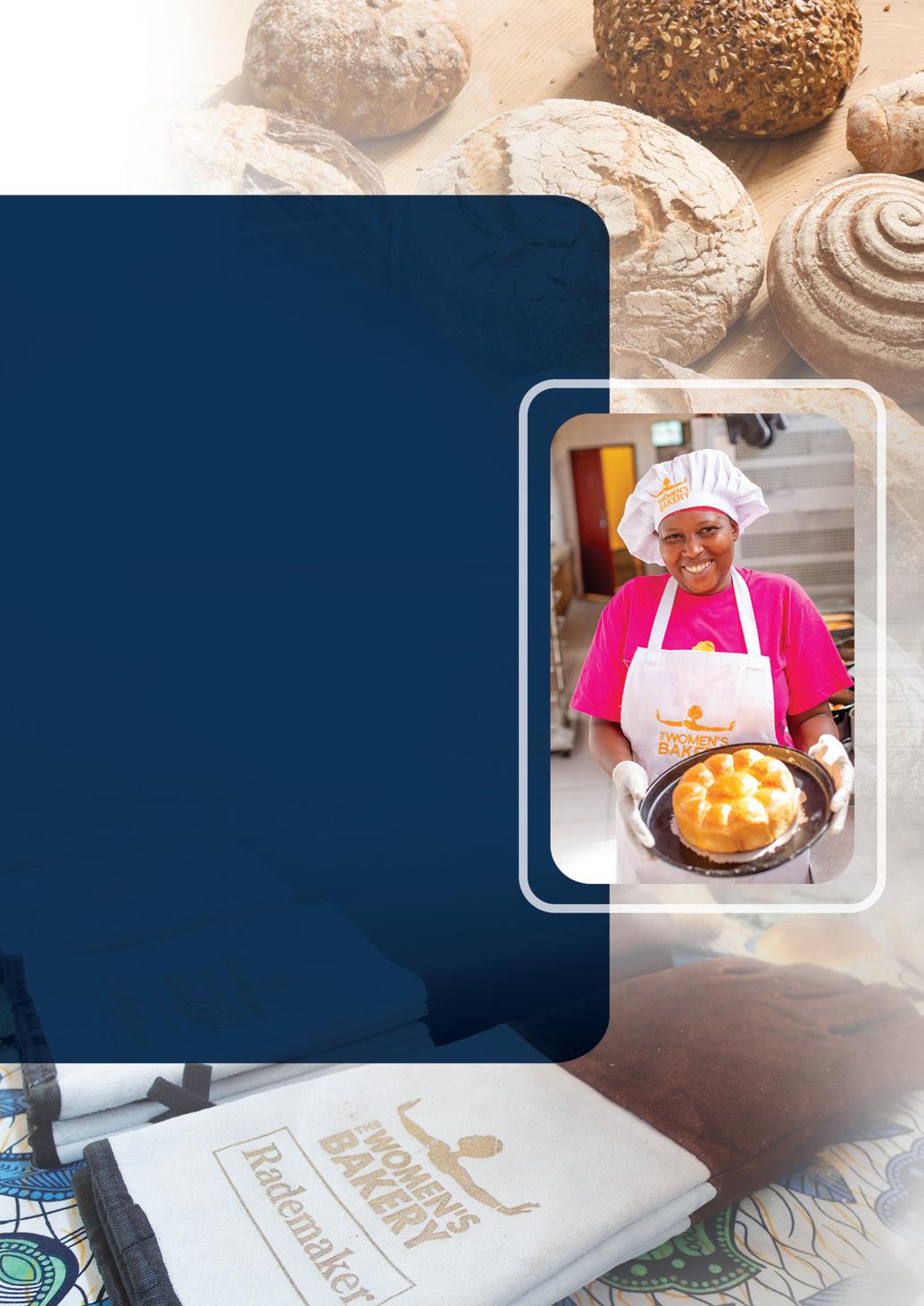
“This is a unique collaboration, which allows us to reach some ambitious goals,” explained Mr Mulders, “like to provide nutrition-rich and affordable food for the most vulnerable in society. And this is also the backbone of our mission and vision. We want to make sure that we are helping the whole world access affordable food and the means to produce it.”
Under the scheme, bakeries are built in the areas that need them, to be staffed by women from the community. Demand meet s supply on a local scale, with all ingredients sourced nearby. The bread produced is crafted to be highly nutritious and affordable, with bakery skills taught to locals.
Rademaker assisted practically and financially in this endeavour. “Several colleagues have made an on-site visit,” said Mr Mulders, “and we've sent a couple of technologists out to train the women about the equipment and how to operate that sort of bakery. It’s not an industrial bakery, these are four artisan craft bakeries. We have proudly been part of the project for over five years, and by the looks of it, we're going to keep doing it for a long time.”
Rademaker is a company focused on both how it runs and where it’s going. As Mr Mulders put it: “we are a no-nonsense organisation, and we operate transparently.” He is certain that one of the things the company is best known for is customer service.
But it has ambitions to continue to grow further, with expansion ongoing at Rademaker’s HQ in Culemborg. The company has been modifying its facilities heavily since Covid afforded the opportunity with an overhauling of the sales offices and a heavy investment into the production area. Mr Mulders revealed it is intended to be completed by Q3 of 2023.
Rademaker is a highly competent and flourishing business, but for Mr Mulders it is more than a job. It is in his genes: “I come from a genuine bakery family,” he concluded. “My parents had a craft bakery which was also located here, in Culemborg. So, from a young age, I was present in my dad’s bakery learning and, of course, eating. I am educated as a master baker as well.
“For me, the three pillars of the business, bakery, sales and the technical side, combined with the international aspect of Rademaker, are all really exciting. And of course, it helps knowing the bakery background. It’s so valuable to understand exactly what the customer’s needs are.” n

MacIntyre Chocolate Systems is a worldwide supplier of chocolate manufacturing and processing equipment. Based in Scotland, it is part of the wider Probat Group. Offering solutions for the small-, medium- and large-scale processing of pure chocolates, compounds, truffles and creme fillings, MacIntyre is the go-to business for chocolate manufacturing and has been since 1974. Its place in the market is defined by traditional engineering excellence alongside a constant striving for improvement. Managing Director Joseph Gorman, George Johnston Internal Sales Manager and Linda Mather, Area Sales Manager for Europe, divulged the secrets of MacIntyre’s success to Hannah Barnett.

There is plenty to offer the chocolatemaker at MacIntyre Chocolate Systems, located in Arbroath, West Scotland. The company manufacturers pumps, filters, storage tanks, cocoa butter and liquor melters, product rework systems, ancillary equipment, and an artisan line for fine chocolate making.
With an eye on market trends, MacIntyre is also undertaking trials for the manufacturing methods of vegan chocolate, protein chocolate, dairy-free chocolate and sugarfree chocolate.
Its current headcount is 48 employees and MacIntyre Chocolate Systems has a long history stretching back to 1832, when it operated in a different form as Low and Duff, Monifieth. In 1974 it became Low and Duff (Developments) Ltd., and in 2017, MacIntyre Chocolate Systems Ltd. was established. In this way it is a hybrid of new and old; both pioneering and rooted in tradition. Joseph Gorman, Managing Director, painted a picture of a bustling, innovative
operation: “We’re an engineering and manufacturing company. We have our own f ull turnkey facility here for fabrication and welding, CNC machinery, electrical and mechanical assembly. Alongside that is engineering, technical, mechanical, electrical and electronic design. Also, we have our own lab. We’re able to develop products, recipes, tests, trials for NPD.”

The innovation may begin at its Scottish site, but Mr Gorman went on to explain just how prolific the company is overseas and how this is significant in its vision for the future.
“We have a group strategy that we work towards,” he said. “A 2025 strategy. And that's really about growth and market share and being a global supplier. We export 99% of our business and are in 106 countries. We have a large global footprint, so to try and manage that can be challenging.”
Additionally, the twists and turns of the market have proved unpredictable for MacIntyre as Mr Gorman explained: “Even after Brexit, we saw a sales increase in Europe when all the indicators were telling you it was going to be different. And at the same time, sales in Southeast Asia dropped significantly during the pandemic, purely because of the situation in that region of the world. So when we saw growth, we also saw decline. But what we're seeing now is grass shoots coming back from Southeast Asia, and we’re seeing these economies coming back and starting to invest again.
“Although price pressures have been an issue, that's been an issue for this entire supply chain as a whole. But we've had solid development over the past two years, with Siemens as a major supplier for hardware and software development. And that has been fantastic.”
Mr Gorman was keen to stress that as well as global corporations like Siemens,
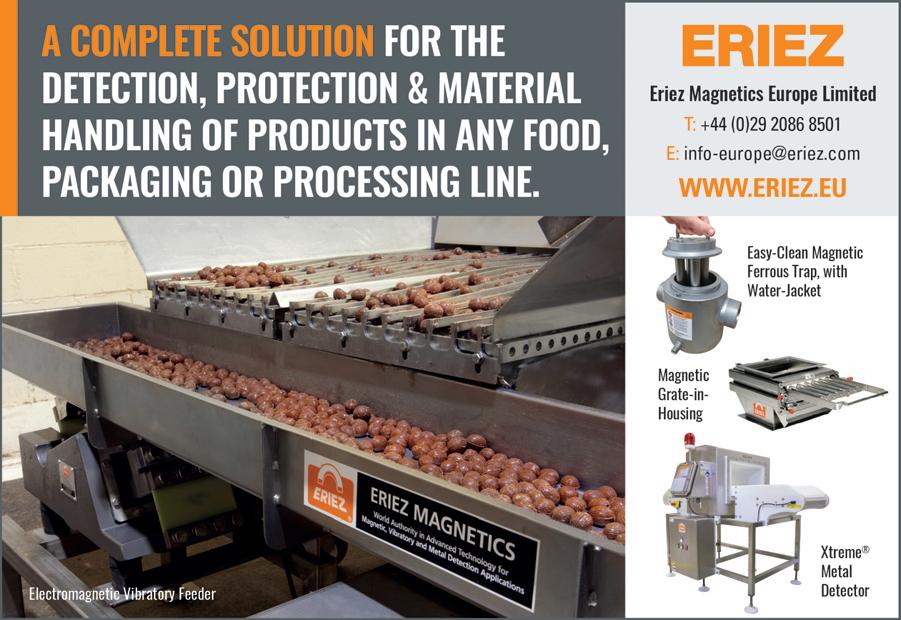


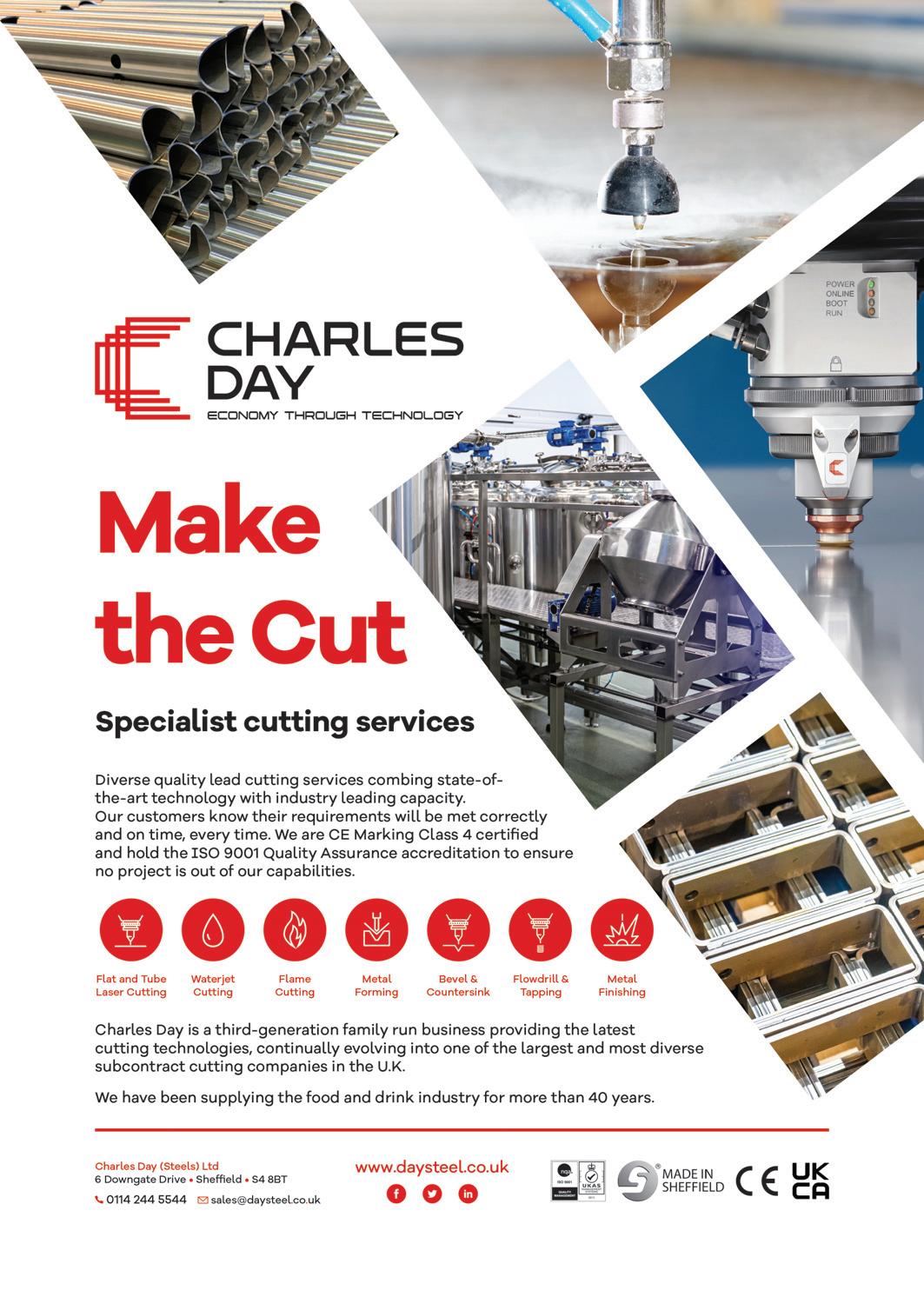
the company uses a local supply chain based on the West coast of Scotland, because ‘supporting a local economy is part of what we do.’ MacIntyre is a significant global player and firmly committed to supporting local firms.
The company’s flagship product, the MacIntyre Refiner/Conche, was developed in 1926. A conche is a machine used during
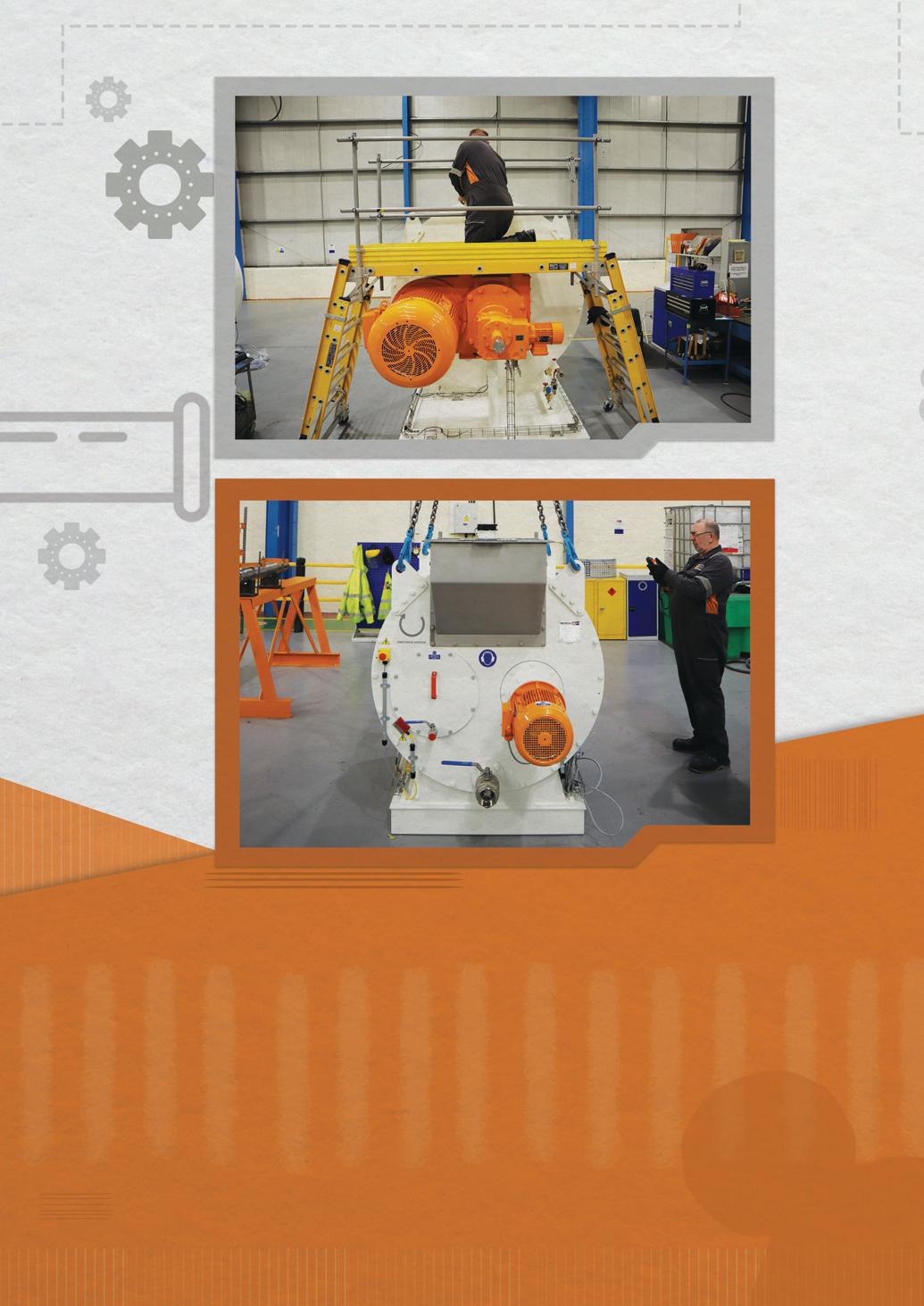
the manufacture of chocolate which evenly mixes the chocolate mass.
“We’re the OEM, we are the original design,” Mr Gorman stressed. “The Refiner/Conche is our design: we own it. So, we are very distinct, and we are known globally as the market leader for the Refiner/Conche.”
The company’s work with the conche continues to successfully blend classic design and cutting-edge innovation.
This is something Linda Mather, the Area Sales Manager for Europe, expanded on: “We have always been using the same tried and trusted technology. This machine’s been in the market, producing high-quality chocolates, compounds, spreads and so on, for decades. But using an integral part of the machine, we’ve now improved it through design, and brought it in line with industry 4.0.”
“The refiner conche is our design: we own it. So, we are very distinct, and we are known globally as the market leader for the refiner conche”
Part of what makes the machine so successful is its simple design and handling; ‘almost plug and play’, as Mr Gorman said. But it is a clever, useful piece of kit too. It has a universal system that performs several functions in one machine.
“The MacIntyre Refiner/Conche is just one unit, with one geared motor and one heat setting,” Ms Mather said. “If you use a different type of technology to make your product, then you’ve got several machines and much more energy consumption. In times when we’re all conscious about energy consumption, the MacIntyre is a perfect solution. That’s including manufacturing rework. It will take product that hasn't passed the QA and bring that back into a mass.
So, there’s no waste, which is ideal for larger companies that have a lot of rework to handle.”
MacIntyre is not a company to get stuck on the success of one outstanding product. It is always striving to improve, develop and keep innovating, while also maintaining its core strengths.
As Mr Gorman said: “2022 saw us invest approximately £1.1 million into the business. That was for new CNC machines. It was a significant investment.

“We are at the point where our machines are fully compatible with Industry 4.0, which is great. Industry 4.0 is really about data acquisition and data technology and that whole linkage and communication between
machines and systems. Our machine is compatible with that, and what we’re looking at next is AI, that ‘Lights out factory of the future’ idea where our machine can be used without an operator. Currently you can set the machine on automatic, but now we’re looking for the machine to basically run on its own.”
Succinctly summarising the synergy and diversity that makes the company tick, Mr Gorman reflected on the satisfaction he derives from his work: “We have a large footprint here in the UK, from big OEMs but also some fantastic independent chocolatiers. MacIntyre has been on the journey with these businesses. And there’s satisfaction to see their business grow. It’s really good. So, there are many different types of satisfaction when working at MacIntyre.”
The TP Food Group is a European designer and manufacturer of bespoke food processing equipment with a new US arm: TP Food Group - North America Inc (TP-Inc). President of TP-Inc, Nicola Menardo discussed the company’s product line and plans for growth, in conversation with Phil Nicholls.
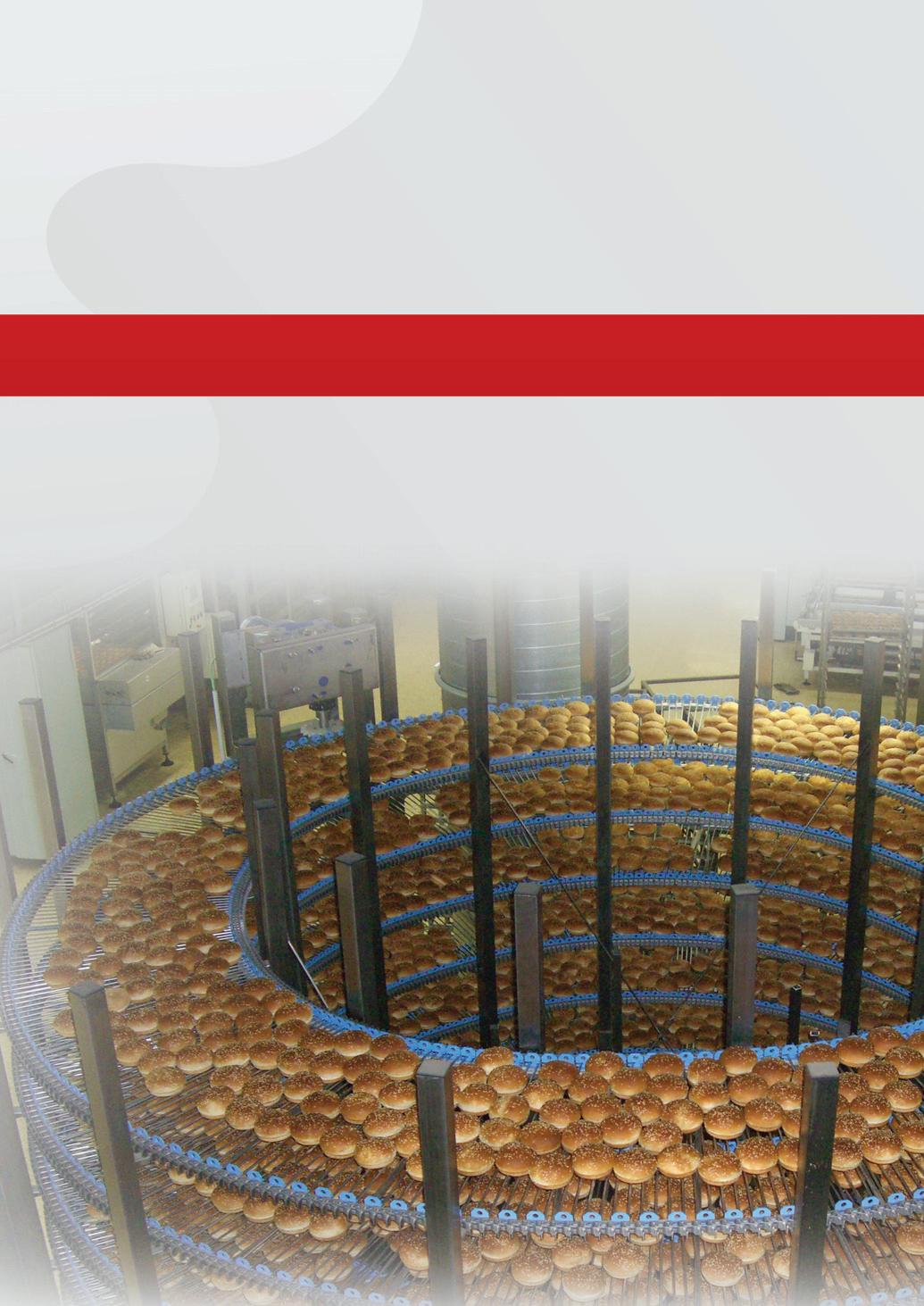
With thousands of food processing systems sold and hundreds of customers in five continents, there is no wonder the TP Food Group achieved a 2021 revenue exceeding €100 million with room for further growth.
The products in the group’s portfolio are designed and manufactured in Europe to meet the needs of artisan bakers and the requirements of a wide array of industrial food processors.
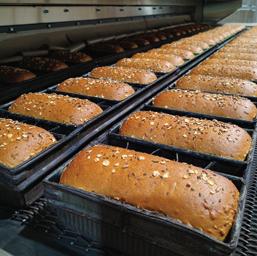
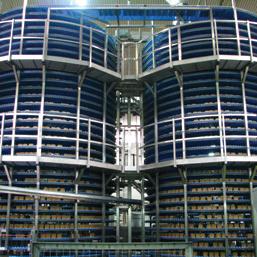
In North America, a pervasive low-temperature food supply chain together with increasing demand for automation and flexibility, create a natural interest for the products in TP Food Group’s industrial portfolio. In this region, over the last ten years, the TP Food Group has sold more than 120 industrial food processing solutions in various food segments – from single cooling spiral systems for cheese to complete industrial bakery lines.
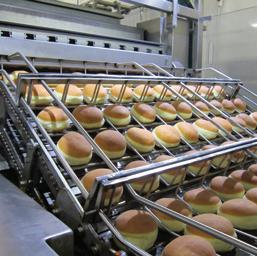
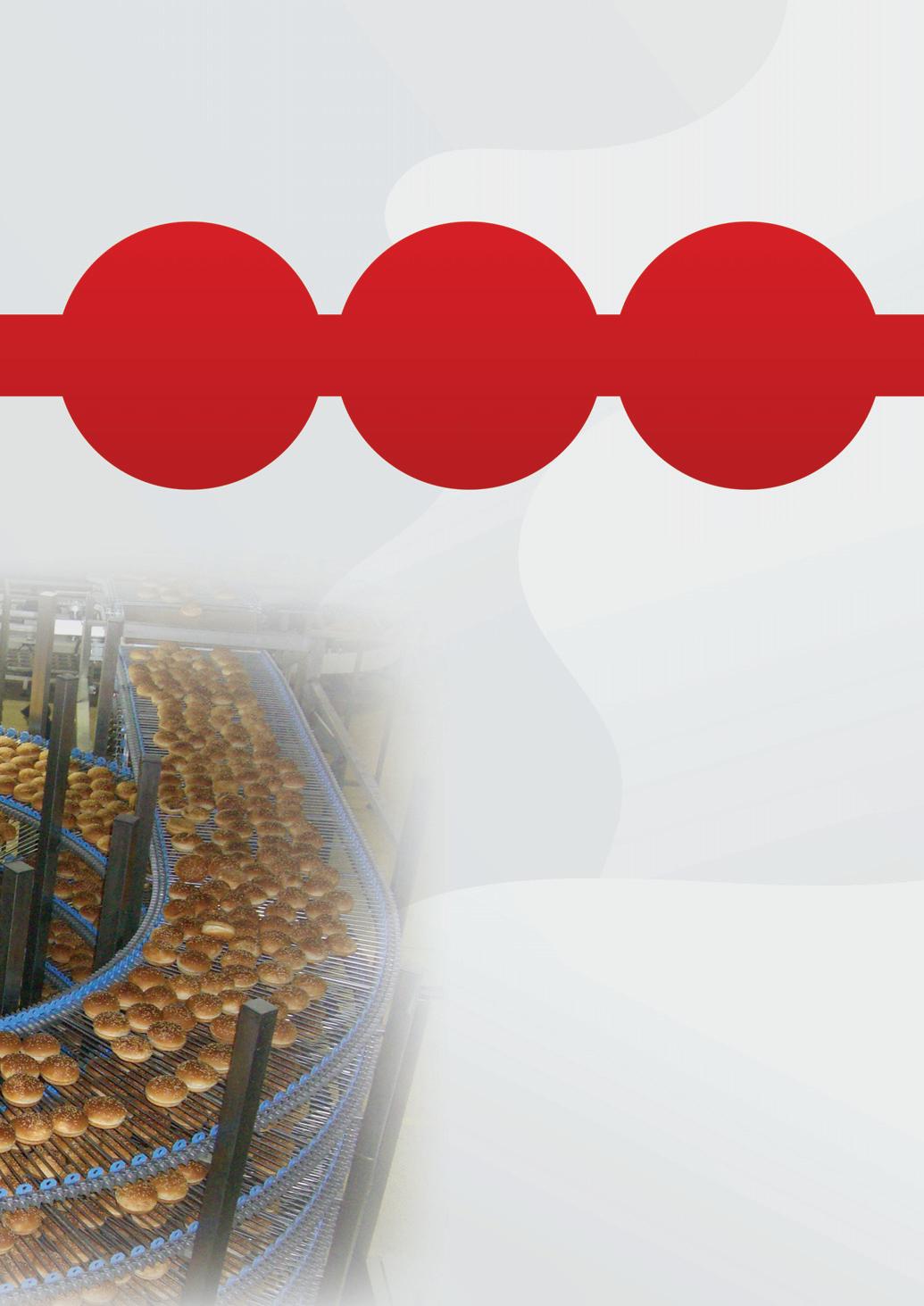
Despite the good market share achieved so far, meeting a market demand which is not experiencing setbacks requires being closer to the customer base. This is the reason behind creating TP-Inc and hiring local managers in sales and customer support roles: showing prospects that the TP Food Group is committed from the first conversations to aftersales support.
TP-Inc serves industrial food processing companies and brings to the table three iconic brands of the TP Food Group: Gostol, Tecnofryer and Tecnopool.
Gostol is a perfect brand for industrial bakers looking for high rates of production, efficiency and process repeatability. Tecnofryer brings innovation to the industrial fryers’ sector, thanks to a series of design features meant to streamline operations. Tecnopool is known for tailor-made designs of spiral systems available in multiple configurations.
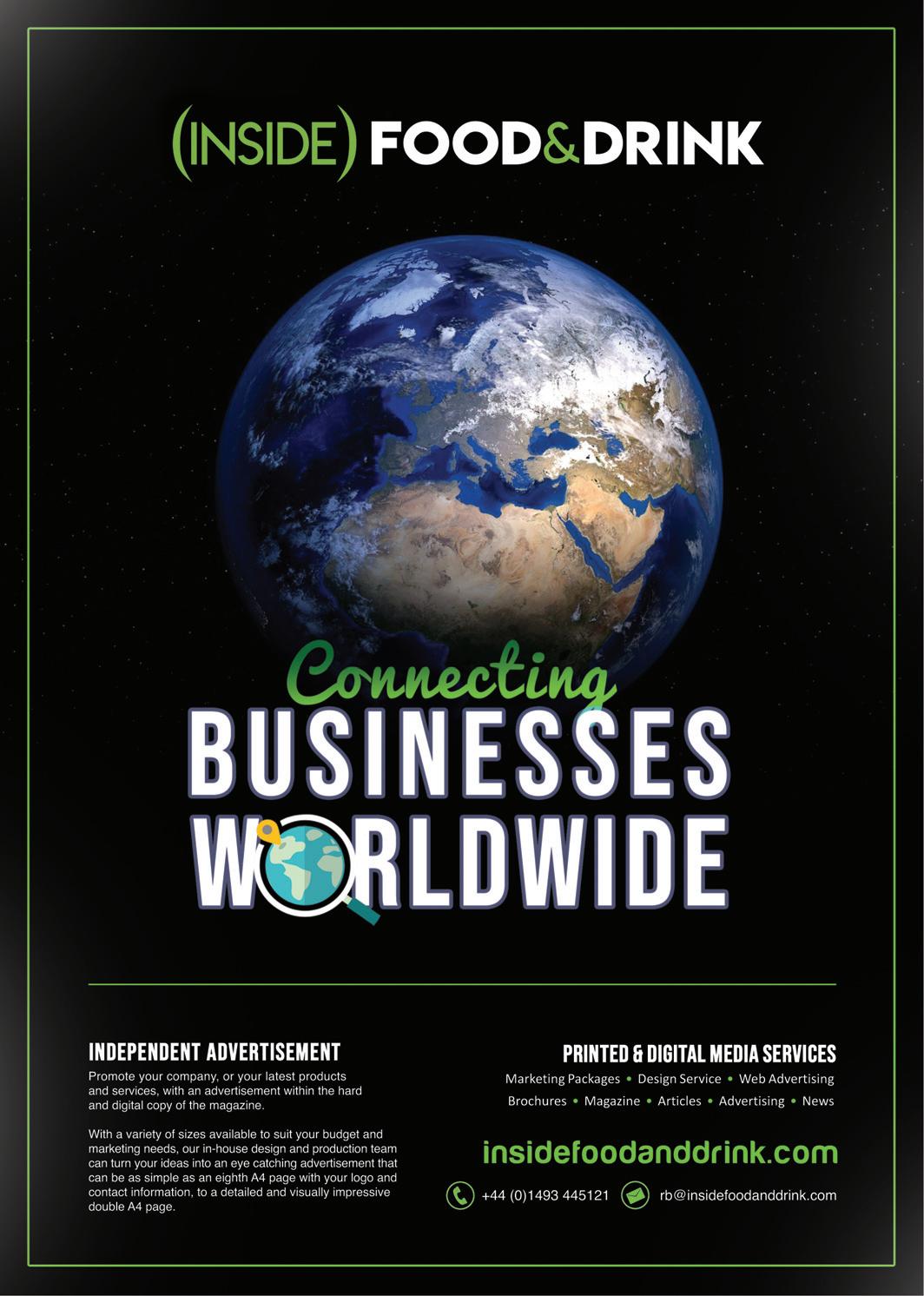
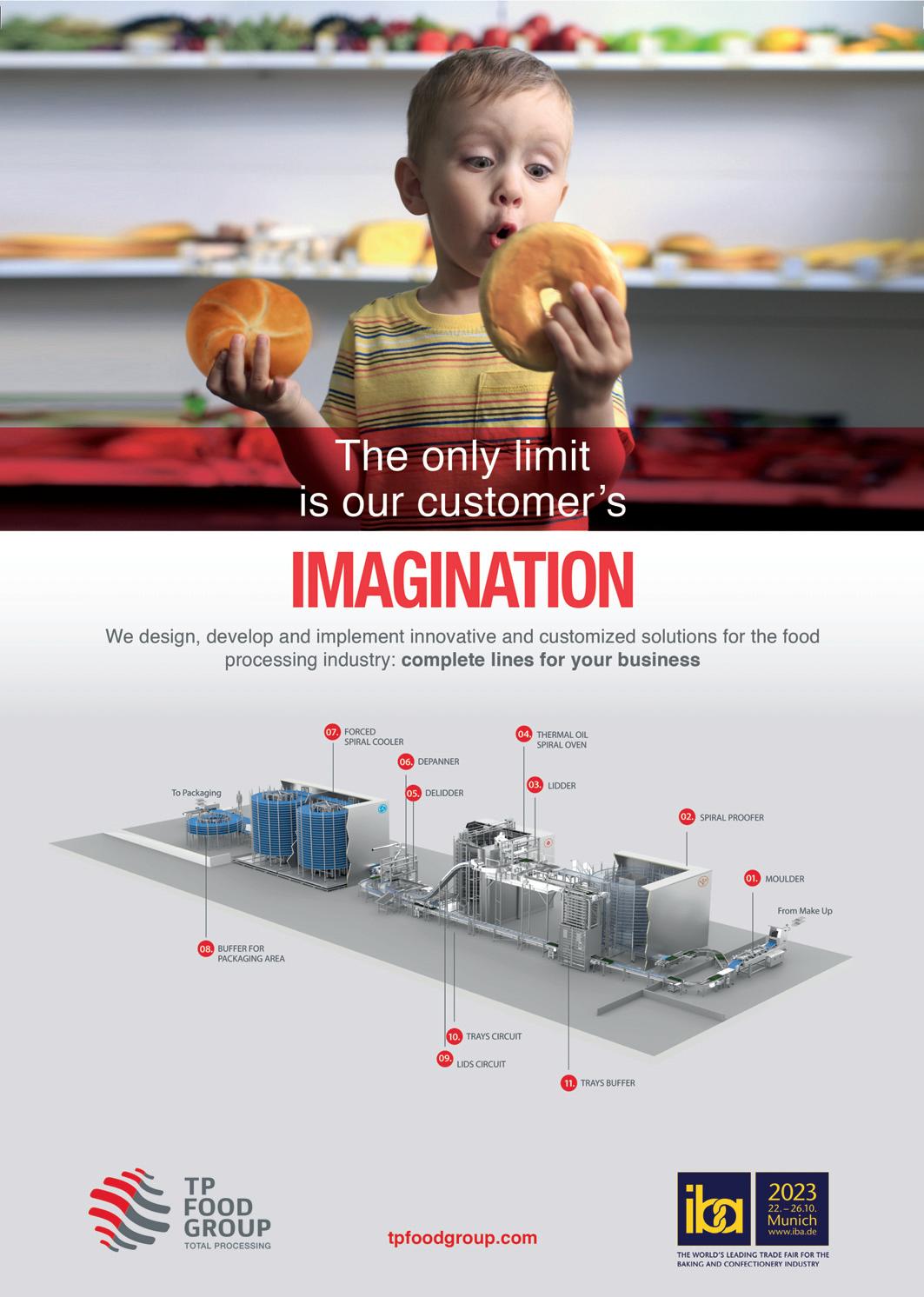
Thanks to a product portfolio that covers various thermal treatments (i.e., freezing, cooling, proofing, pasteurising, frying and baking) in a wide temperature range (from -40°C to +300°C), TPInc can help customers across the food industry, including those specialising in bakery, pastry, pasta, dairy and so many more.
“In North America, our spiral freezing and cooling systems are in high demand for bakery, proteins and prepared meals, among other segments,” said President of TP-Inc Nicola Menardo, “The success of our systems results from the layout flexibility that we offer. We are also experiencing a surging demand for our diathermic spiral ovens: this innovative oven yields product quality, reduction of waste and production flexibility, all on a limited floorspace.”

TP-Inc’s spiral oven has recently been chosen by a top US food processing company, proving that spiral ovens indeed have market potential in this part of the world.
Talking about oven technology, besides spiral ovens TP-Inc can also offer its customers the extremely well tested and reliable Gostol’s cyclothermic and diathermic oil ovens. These will soon be complemented by a new cyclothermic oven design which brings advantages in terms of maintenance and energy savings.
The Tecnofryer brand is generating interest as well. “Our fryers can integrate unusual design elements such as a moving frying pan” Mr. Menardo said “which shortens and simplifies cleaning and maintenance. We believe this concept adds value to industrial operations, especially in the long run.”
According to Mr Menardo, it is the flexibility of designs that distinguishes the industrial solutions of the TP Food Group from its competitors: “Customisation is indeed in our DNA. We develop solutions by listening to what customers ask and tailoring our design like no competitor, in our knowledge, does. TP-Inc will never have a ‘product list’. Every new project starts from scratch: we only
rely on an immense database of experience and an engineering department driven by innovation.”
TP-Inc’s range can integrate with a vast selection of machinery, placed either upstream or downstream, in the frame of complete production lines. The company understands industrial food processes, and actively ensures the smooth integration of its machines with those of third parties. Plus, more than 50 years’ experience in industrial bakery processes makes the TP Food Group, and thus, TP-Inc, a credible supplier of industrial bakery solutions.
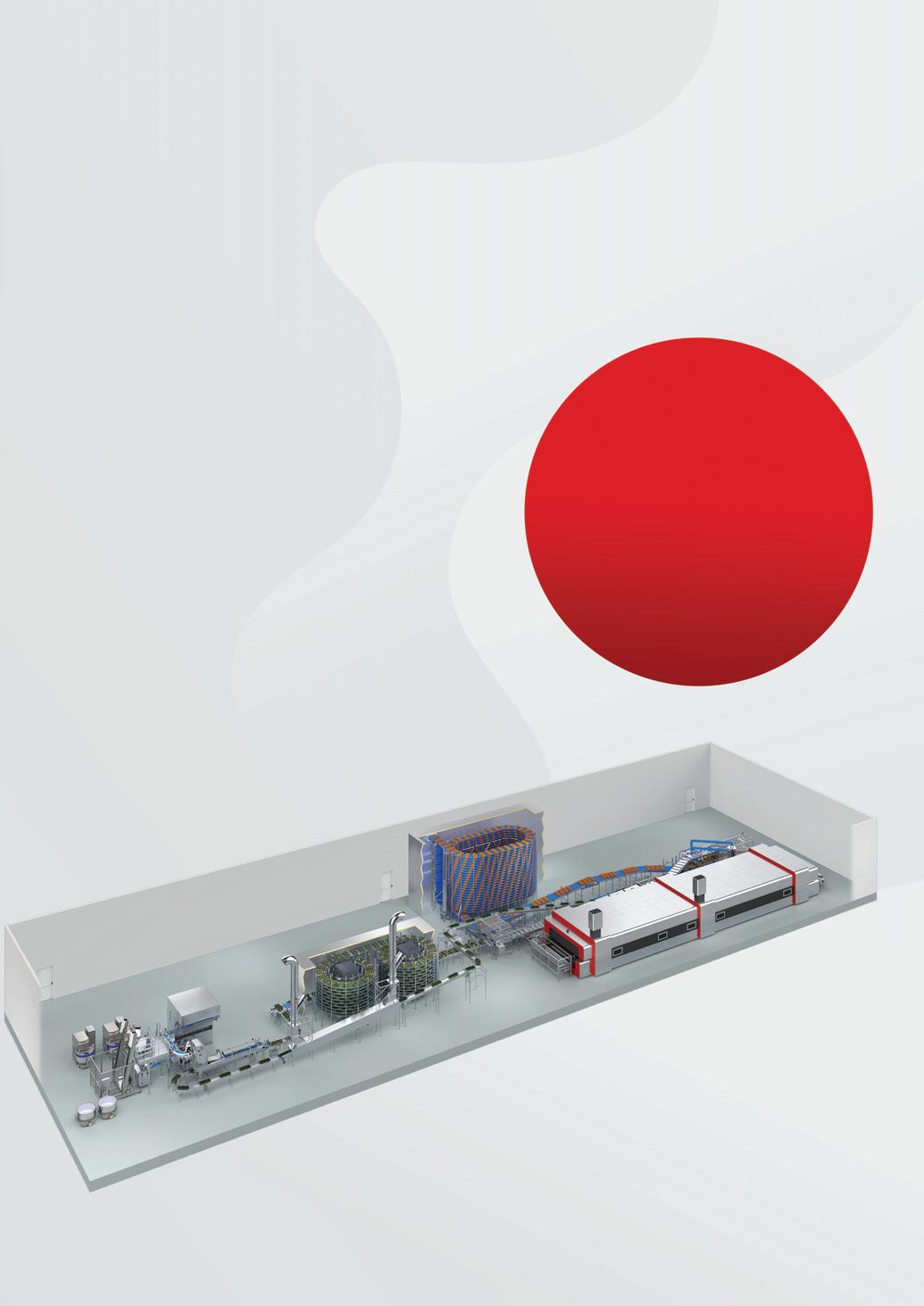
For instance, TP-Inc can provide North American customers with the latest TP Food Group designs. This includes proposing tested solutions for applications as diverse as artisan bread and gluten-free bakeries, where Tecnopool, Gostol and third parties’ equipment are part of a single and seamless solution.
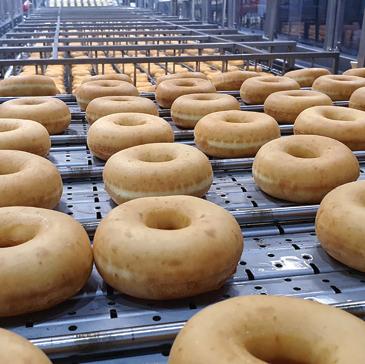
TP-Inc believes aftersales support will help intercepting growth and ensure its great technical solutions can fully deliver their potential. Specifically, North American users of the Tecnopool, Gostol and Tecnofryer solutions can already benefit from a US-based customer support department that can offer, among other things, monitoring services and timely onsite support to solve any issue which might impact productivity.
Mr Menardo is excited to play his part: “Knowing that we can help the food processing industry improve their systems and lower emissions, while getting food delivered to hungry customers, is something to be proud of.
“TP Food Group North America will always blend in-house and third parties’ technologies to deliver customised solutions that can reach so many customers and in so many applications,” he concluded. “There is no way of saying ‘I know it all’. A thirst for knowledge, and willingness to see something new are two of the things that motivate me every day.” n

from crop to consumption

colavita jk food lifefood rgk sensacions gastronomy and emotions
mission foods
With a history stretching back to 1938, Colavita SpA has become synonymous around the world with the label Made in Italy. Owner and Marketing Director Carla Colavita shared the story of a growing company always looking for new possibilities, but with deep roots in the Italian culture and tradition. A report by Phil Nicholls.
Extra virgin olive oil is the lifeblood of Colavita SpA; a central part of the company’s ongoing mission to spread the Italian culinary heritage. Hand-in-hand with this mission is Colavita’s quest to share the message of healthy living.
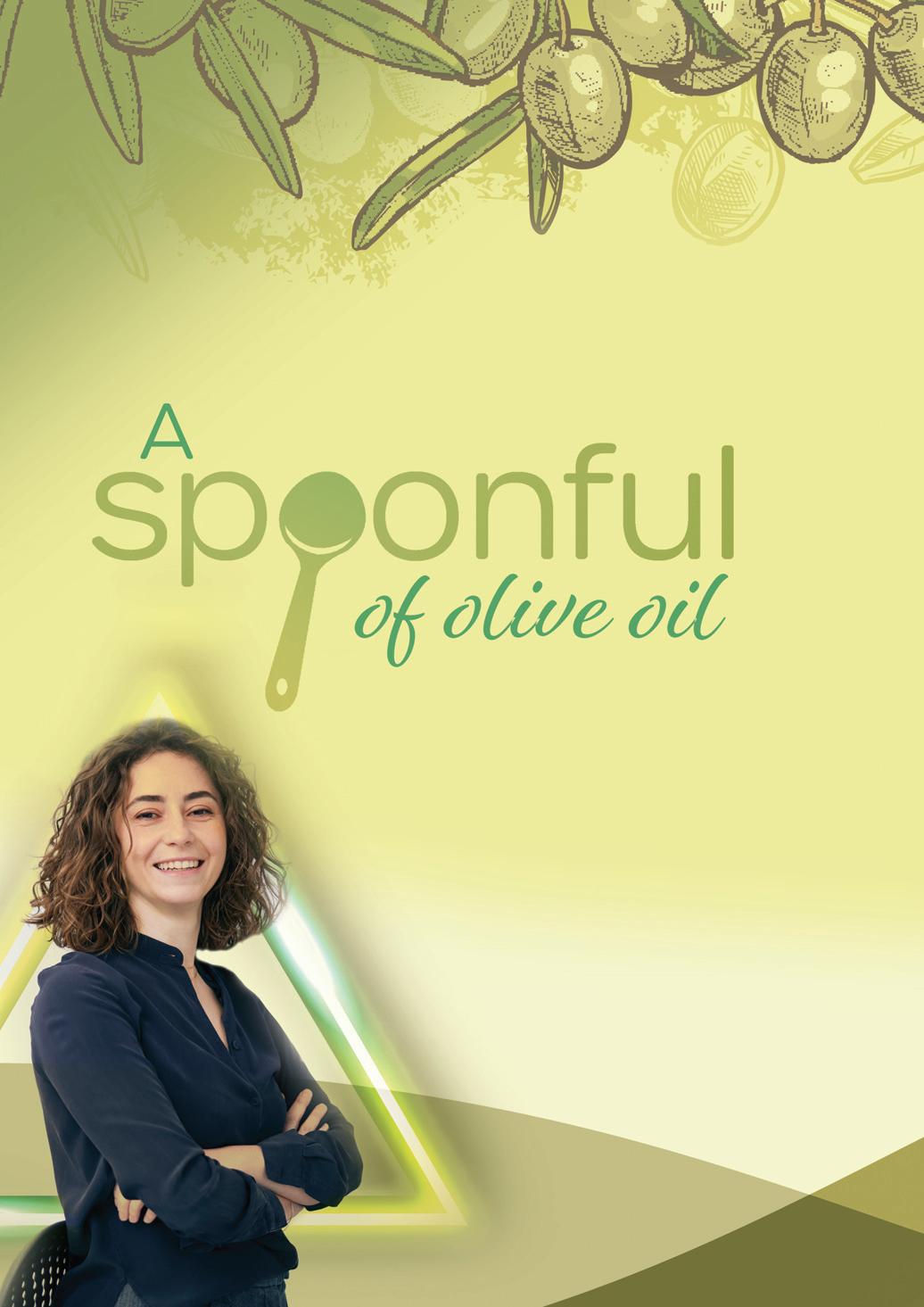
“A big part of Colavita’s communication is to promote a healthy lifestyle,” explained Owner and Marketing Director Carla Colavita. “Today, many people know the numerous health benefits of including at least a spoon of extra virgin olive oil in their everyday diet; because of its high content of monounsaturated oleic acid. Olive oil can prevent cardiovascular diseases and various body inflammations. Thanks to its high level of antioxidants, olive oil is a natural detoxi fying supplement.”
The story of Colavita began in 1938 in the small village of Sant'Elia a Pianisi within the region of Molise in central Italy. Here, Giovanni and Felice Colavita founded a small company for the pressing of olives. By the early 1960s, Oleifici Colavita ranked among the top ten oil refineries in Italy. In 1977, the Colavita brothers, Enrico and Leonardo, began bottling the extra virgin olive oil with the family brand name and selling it overseas.
Today, family-owned Colavita is one of the leading exporters of extra virgin olive oil to countries such as the USA, Canada, Australia and Japan. The company operates two facilities in Italy, one in Molise and a second in Pomezia, Rome (the international headquarters of the group). Alongside these Italian locations, the
Colavita family proudly operates out of the USA headquarters in Edison, NJ, with an additional facility at Dixon, CA. These four facilities provide Colavita with a total production capacity of 350 tonnes per day. In 2021, this generated a revenue of €152m.
“Colavita’s most popular product is the Premium Selection Extra Virgin Olive Oil,” said Ms Colavita. “It is a best seller around the world, embodying the origin, the history and the main image of our company. This is the product that made Colavita great and recognisable in many countries.”
Alongside the impressive range of oils, Colavita supplies a broad range of items delivering Italian and Mediterranean foods to the world. The line of vinegars includes balsamic and a selection of wine vinegars. The offering of Italian speciality preserves includes artichokes, sun-dried tomatoes, peppers, pesto and pâtés. The broader range of Mediterranean foods features cous cous, chickpeas and a selection of beans.
“Olive oil is a very competitive industry,” explained Ms Colavita, “with an increasing number of players. What sets us apart from our competitors is the history, the popularity, the strength and the trust in the Colavita brand that benefits its consumers in many countries around the world.

“Then the uniqueness of the Colavita brand concept of tasting fantastic and looking stylish, makes it the best everyday choice, being good value for money against the other mass markets brands.”
Just as Colavita believes in the health benefits of olive oil, so is the company committed to encouraging an active lifestyle in the community. Sport is of fundamental importance as the basis for a healthy lifestyle, which is why Colavita supports various sports and athletes.
This includes Italian number one tennis player Martina Trevisan and leading Italian padel player Giorgia Marchetti.
The company is also involved in community sponsorship, as Ms Colavita outlined: “The Colavita Cycling Clubs are amateur racing and recreational programmes that comprise the largest competitive cycling organisation active in the US. There are more than 10 regional club teams, with over 600 members in at least 20 states across the country.”
Colavita’s broad community support extends to more than just sport. “We inaugurated the Colavita Center for Italian food and wine in May 2001,” explained Ms Colavita. “It is an Italian cooking school located within the Culinary Institute of America in Hyde Park, NY, one of the oldest and most authoritative cooking institutes in the world.
“This is the first faculty of Italian cuisine offering aspiring chefs the opportunity to study the dishes and learn how to use genuine products of the true, centuries-old Italian tradition.”
Finally, there is the Colavita Cares programme, with a primary mission to help charitable foundations raise funds for the benefit of children, individuals and families affected by economic hardship, physical disability, emotional suffering, natural disasters, social discrimination and more. Solidarity remains a fundamental value at the company. For years, Colavita has engaged in the social sector, alongside associations and foundations, working for the well-being of the individual and the community.
Colavita delivers a complete health package, from product to community involvement. Alongside this portfolio of schemes promoting a healthy lifestyle, it is easy to forget the sheer enthusiasm at the company for the many virtues of olive oil.
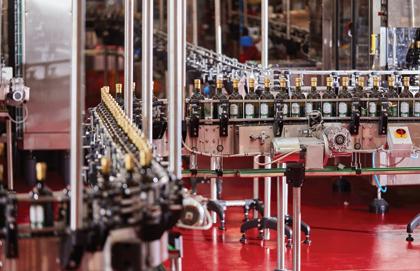
“Few people know that olive oil is a very versatile cooking ingredient,” explained Ms Colavita, “perfect for many different recipes,

The distinctive Colavita range of olive oils includes:
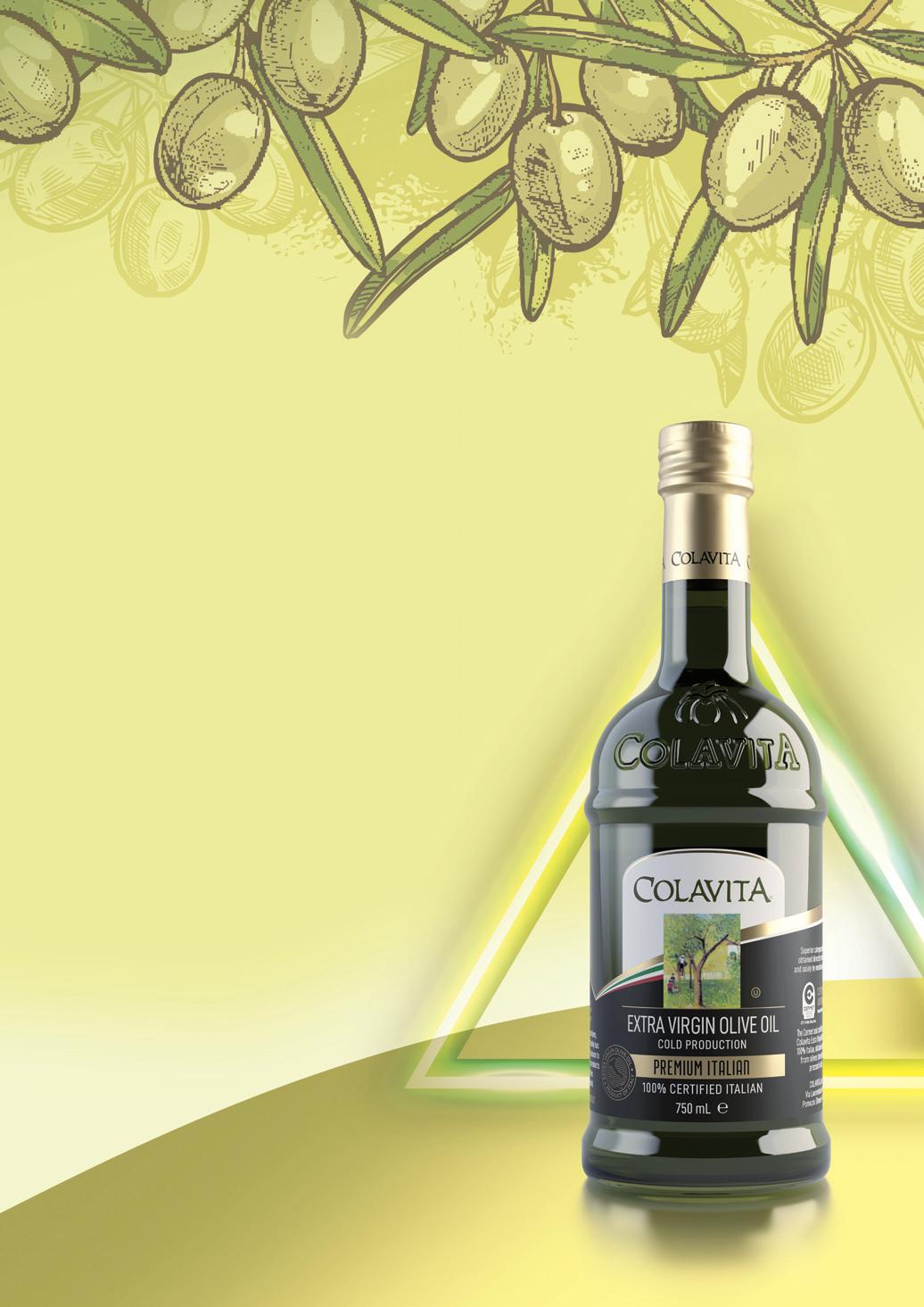
• Extra Virgin • Organic Extra Virgin
•Unfiltered Extra Virgin
Regional varieties:
• Italian • Greek • Portuguese • Spanish
Specialist oils:
• Pepper • Lemon • Garlic • Basil • Truffle
not only Mediterranean but from all over the world. To that aim, we like teaching consumers about different ways of using olive oil, as a creative and healthy choice for cooking.”
The health of a business also relies upon a close relationship with suppliers and partners, according to Ms Colavita: “Our relationships with clients are first based on mutual trust and cooperation, beyond the friendship of course! We work together every day to better identify the best strategy to increase and consolidate our brand presence in the relevant markets. Our success is their success and vice versa!”
Colavita’s love of community also extends to sustainable development. Its three largest factories are powered by solar panels, with the fourth buying only renewable energy. The company also signed an agreement with Nativa Srl SB to constantly monitor the impact of the business.
“In the last year, we redesigned our Timeless bottle,” Ms Colavita said, “using a sustainable R-PET (recycled PET) that lowers the CO2 footprint values associated with production, increasing our environmental sustainability.”
As with so many production companies, Colavita endures recent cost increases for raw materials, packaging, energy and logistics. The company’s adoption of solar panels has lessened the impact of rising energy prices, but the other factors remain a challenge.
Colavita is focused on sustaining its brand reputation, supplemented with additional investment in production and sustainability. The latter will be aided by the partnership with Nativa.
“Managing a family business is an honour for me, but also a great responsibility,” concluded Ms Colavita. “My family worked hard and made great sacrifices - but above all, they put their heart into a company that was totally integrated into family life.
“The crucial part of what I inherited was the established relationships with employees, customers and the community. I feel grateful, and I hope to manage the company with the same passion, consistency and professionalism that has always distinguished our family business.” n
JK Food, a Czech family company specialising in the production of dehydrated foods, own instant and gluten-free instant pasta, spices, spice mixes, dried vegetables, dried mushrooms and ready meals in the form of a cup on the retail market, recently expanded its offering with a new range developed in response to current trends requiring the highest quality and natural, sustainably sourced raw materials. Romana Moares reports.

JKFood, founded in the mid-1990s by Jaroslav Kostera out of his passion for different tastes and spices, enjoys a solid market position in its native Czech Republic, and has a robust sales network throughout Europe. Today, the company’s core business is the development, production and sale of dehydrated products for the catering sector and the food industry.
“We make everything ourselves,” said Mr Kostera. “From the actual production of pasta, the development of taste, and the production of flavouring mixtures – all from high-quality and controlled ingredients. The final dish in a cup, in the form of a dehydrated snack, can be quickly prepared by pouring boiling water, simply stirring and waiting a few minutes before the dish is ready.”
Mr Kostera, who remains the company’s owner to this day, explains that over the last five years, there has been an increased focus on strengthening JK Food’s market position, specifically in the catering sector, as well as on production of dehydrated products such as soups, sauces and bouillons.
“JK Food is renowned as a long-term, reliable business partner to the food sector, supplying high-quality products developed in-
house. Our customer base includes a number of food processing companies such as producers of meat, bakery and dairy products, as well as schools, nurseries, hospitals, retirement homes, restaurants and other meal-providing establishments.”
In 2017, the company implemented a major investment into a new office and production hall to boost product capacity, and the following year capacity was further enhanced by a new, fully auto mated mixing centre and packaging line.
The automated mixing centre is planned to be further expanded by the end of 2022, which will increase production capacity up to 10,000 tonnes per year. With another recent investment in a new cup packaging line with a capacity of 1.5 million units per month, the company is set to launch European-wide expansion.
The solid reputation built over three decades, combined with the dynamic, proactive thinking of a young, forward-looking team is a smart recipe for products now set to conquer the retail segment.
Speaking about what distinguishes JK Food from similar operators, Mr Kostera said: “Our key competitive advantage is comprehensive customer service, from product development to its delivery. We are
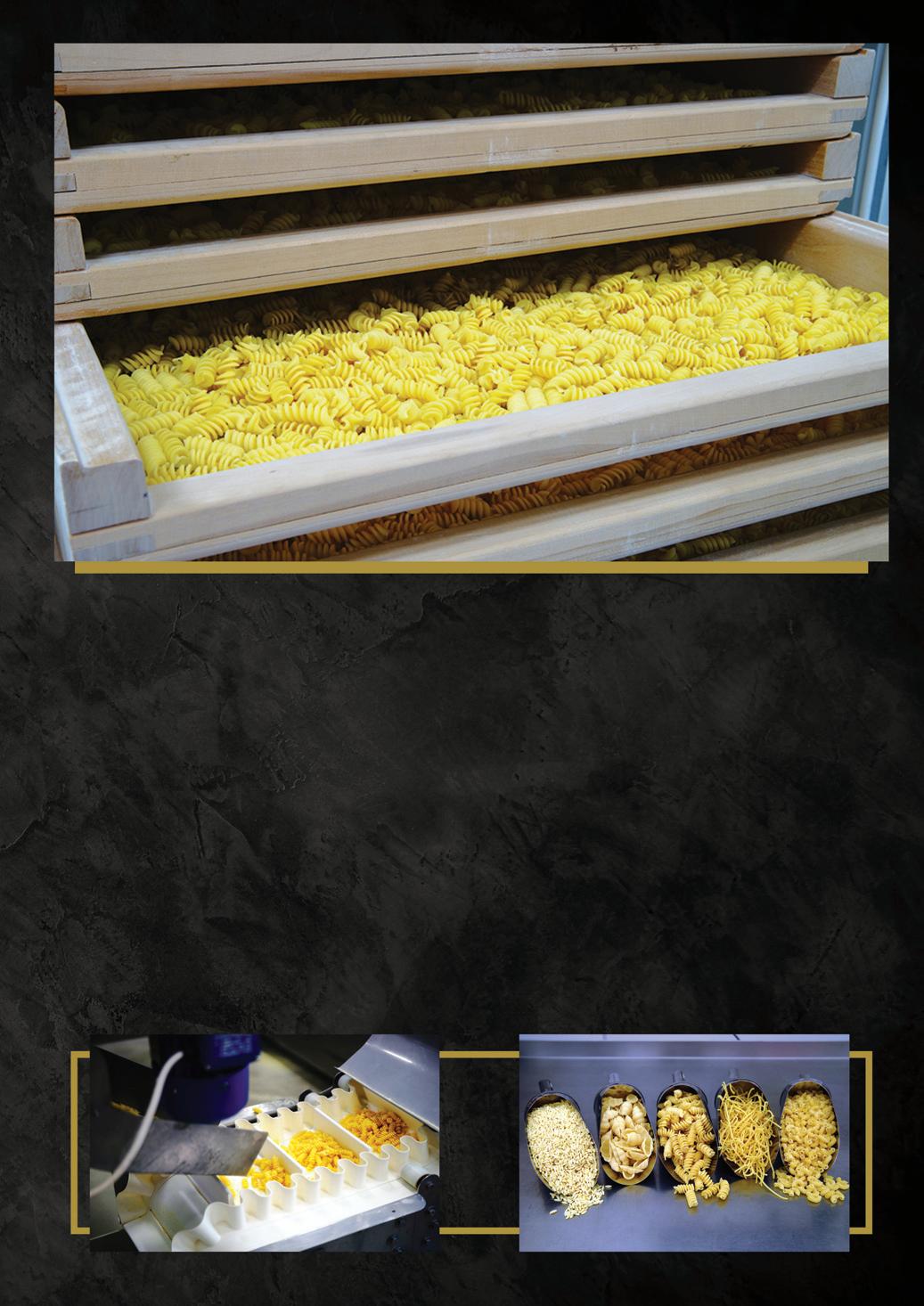
flexible and creative – and these are not empty words. We analyse customer feedback very quickly and apply the findings in a modified product. And last but not least, our strength is our great team of people – a team that is motivated, committed and driven.”
All JK Food’s products are manufactured according to the company’s own recipes and in collaboration with its customers’ requirements.
“The high quality of the products is the result of a thorough selection o f all raw materials, their careful processing and consistent quality control throughout the production process,” said Mr Kostera. “As a rule, we involve our customers in the development of new products.
“Naturally, we actively follow market developments. The focus is on basic, natural, sustainably-sourced raw materials, while eliminating artificial aromas, chemicals and preservatives and emphasising the health aspect.”
As the company also supplies a wide network of nurseries and school canteens, it has assumed an important role in promoting and developing healthy eating habits starting with the youngest generation.
JK Food’s portfolio currently consists of over 1,500 products, fully developed and produced in-house, made using some 2,400 raw materials. This internal capability and expertise is a significant business strength, and a factor that drives innovation.

Two years ago, the company launched a pioneering product –a novel instant gluten-free pasta range.
“There are many gluten-free pasta products on the market, but none that can be turned into instant consumption,” stated Mr Kostera. “We are the only producer in Europe offering this combination.”
The company has major plans with this unique product range, revealed Mr Kostera. For instance, a major promotional campaign targeted at the retail sector will soon be launched.
“To place our gluten-free instant pasta range in the form of dehydrated meals on European markets is our major goal and our biggest challenge at the moment,” he confirmed.
Gluten-free instant pasta is just one of many successful outcomes of the company’s product development team. With increased focus on higher added value, the company recently
introduced another new product using its own raw materials – an instant pasta range sold in a cup. This dehydrated meal is transformed for immediate consumption by adding nothing else but hot water. For this range, the company created a new trademark –CHU (Taste) – under which the instant cup food products are sold, ready to enter the retail channel.
JK Food’s portfolio fully reflects healthy eating trends, with Mr Kostera affirming that the company is not only striving to meet customers’ requirements but also to present them with new trends, highlighting healthy living aspects.
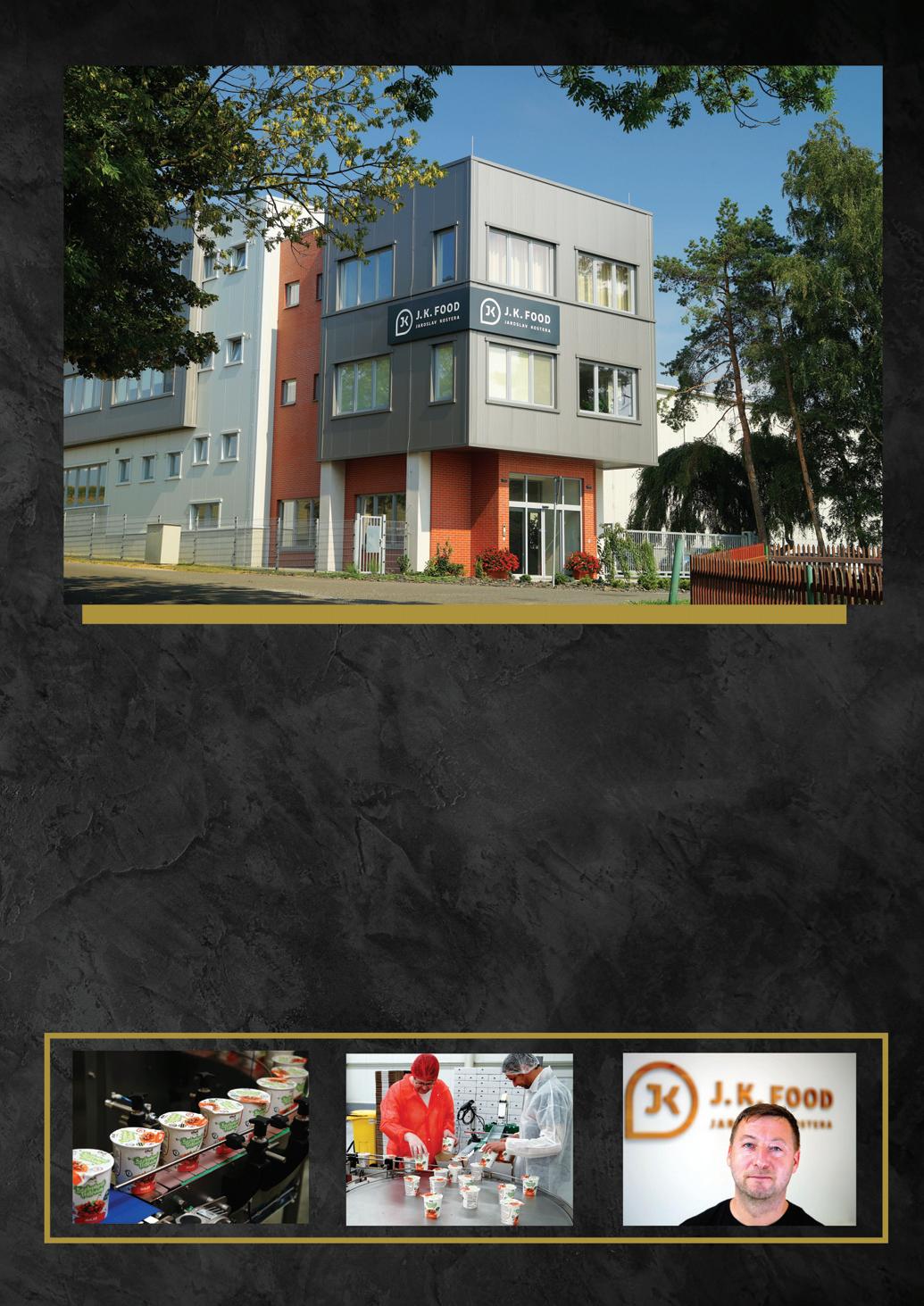
“We are aware that specifically the young, progressively thinking population takes sustainability and nature’s principles very seriously.
We also try to reflect preferences of various consumer groups requiring vegan, organic, Demeter certified, allergenfree, GMO-free, gluten-free as well as reduced salt and sugar meal options.”
It goes without saying that suppliers play a major role in these efforts, and the company applies very strict criteria when selecting its suppliers.
“Building a healthy, long-term business relationship is an absolute key to sustaining high quality levels,” underlined Mr Kostera. “Some of our suppliers have been working with us for over 20 years, but at the same time, we are constantly looking for new suppliers – a good supplier mix is an important success factor.”
Offering natural, sustainably-sourced products remains the company’s vision for the future: a key goal at present is to place the latest range in the retail segment, supported by investment in product development, sales and marketing, as well as in increased production capacity.
Mr Kostera concluded: “The retail sector is our target – not only in Europe but further afield also. Earlier this year, JK Food exhibited at the Food World Exhibition in Dubai, as we believe our range is most suited to that multi-cultural, fast-paced, young market. The potential for healthy food is increasing everywhere and JK Food is extremely well placed to make the most of that potential.” n

ASa student during the early 2000s, Managing Director Tereza Havrlandova developed a passion for healthy eating and especially for raw food. But whenever snack cravings hit her, there was a problem. “There was no good, raw snack food available,” she recalled. As an enthusiast of great raw food, she set out on a journey to change that.
Following a period of market research and investigation, she opened her first production facility in 2007, employing two staff members. “From that moment on, we experienced fast growth,” said Ms Havrlandova, “and by 2015 we achieved €8 million in turnover from our 3,000sqm facility with 140 staff members.”
Today, Lifefood’s factory features four main production lines, of which one is solely focused on producing date bars, while another makes dehydrated products on a line that features 28 industrial dehydrators. The third one is the company’s choco -
late goods line, and the fourth manufactures Lifefood’s new non-date-based bars, including oat-based and protein-based bars.
Lifefood’s product range offers a comprehensive selection of raw food snacks, including bars, crackers, breakfast items, chocolates, savoury snacks, sweets, superfoods, nuts, seeds and dried fruit. It also manufactures bespoke products for private labels.
But it is its bars - and especially date bars - that Lifefood is best known for.
“Our bars have always been our best-selling products, making up around 70% of our sales,” Ms Havrlandova confirmed. “That’s why we are so focused on growing and evolving that side of our business because even though the bar category in most countries is very crowded, it still has significant growth potential.”
Lifefood’s bars are unique for their highquality ingredients and overall purity, according to Ms Havrlandova: “Many producers target low product pricing, but then they use bad-quality ingredients to achieve


In the highly competitive snack business, Lifefood, based in the Czech Republic, offers a refreshingly healthy alternative for consumers seeking products that are genuinely good for them, prepared by a company as enthusiastic about good health as they are. Managing Director Tereza Havrlandova met up with Richard Hagan to discuss the importance of eating raw food, speciality date bars and why good health is about more than just what you eat.Managing Director Tereza Havrlandova
that, such as using nut waste or flour instead of whole nuts. This necessarily affects the taste of the product. There’s a long list of poor-quality ingredients in some of the competition’s bars. Our highgrade ingredients make for the best tasting product and that makes them unique.”
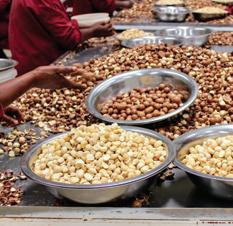
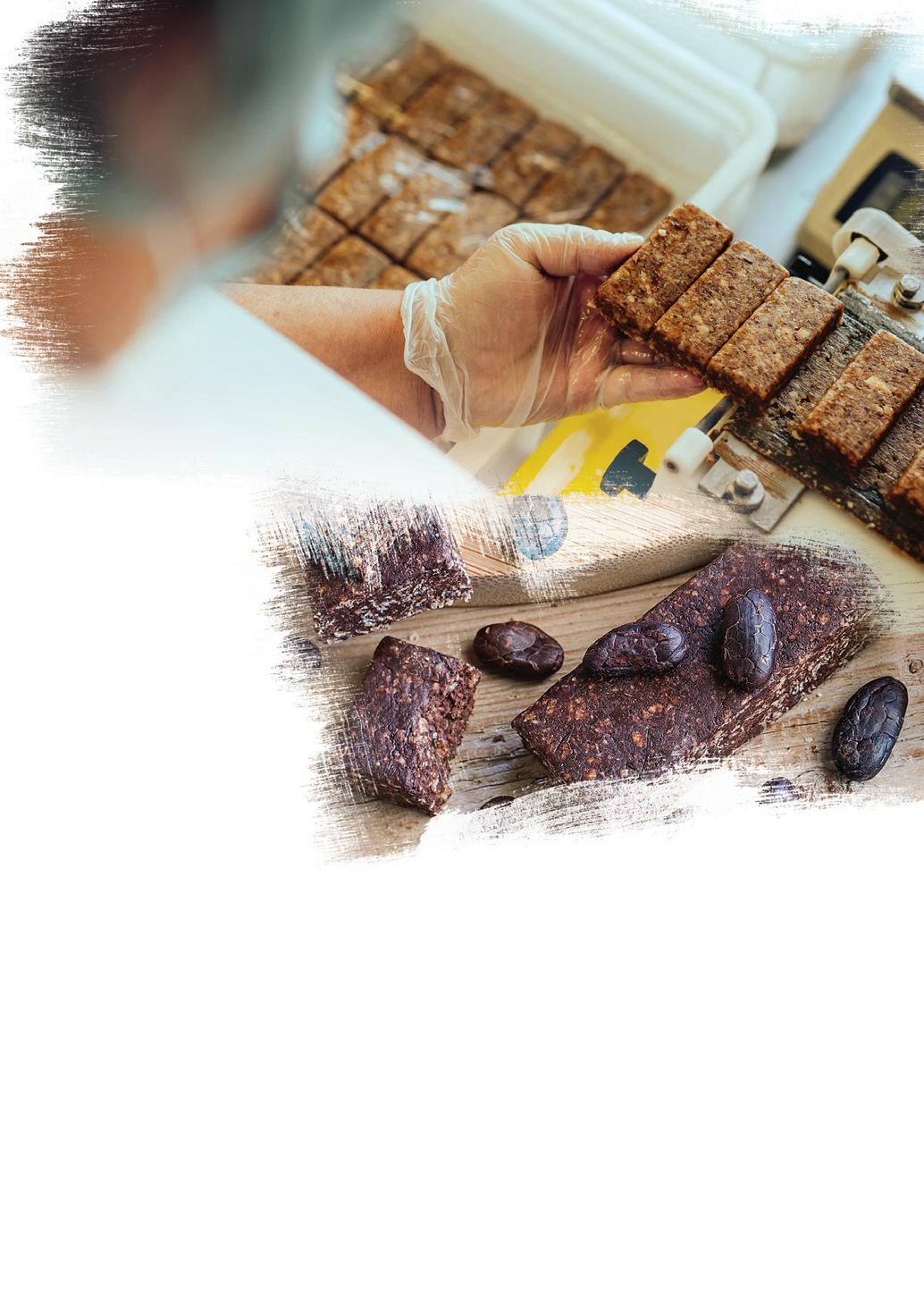
The company’s new oat bars are the latest addition to Lifefood’s flourishing health bar production business. Lifefood’s oat bars are not the first to market, but they are unique for their health credentials.
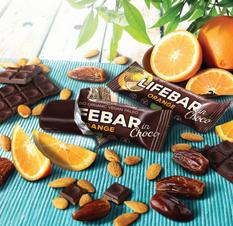
“There are so many unhealthy bars on the market,” Ms Havrlandova said, “with several containing ingredients like sugars, palm oil, and artificial flavours or fragrances. Ours are extremely healthy, nutritious and 100% organic. We manufacture them without any added sugar or palm oil. They’re very pure and clean.”
Following an initial soft launch of its oat bars, Lifefood has rapidly scaled up the production to meet rising demand: “When we began making them in 2019, it was a very manual process,” said Ms Havrlandova. “We’re now switching to high-capacity machine production on a dedicated oat bar production line.”

The success of Lifefood’s products is driven by its steadfast commitment to using only pure raw ingredients. “Within
the raw foods category, we’re unique for offering a genuinely raw product,” she added. “Our product with its super highquality sets us apart in a busy market.”
Social and environmental responsibility is extremely important to Lifefood’s operations. With a focus on what it calls ‘responsible entrepreneurship’, the company’s procurement policy emphasises support for the often third-world communities that provide the delicious, nutritious ingredients for which its products are known. Consequently, Lifefood requires that its vendors must be actively involved in social responsibility programmes that directly benefit the communities supplying the ingredients for Lifefood recipes. These programmes include projects to develop freshwater infrastructure in rural areas, and others that

create jobs through the development of company facilities in those areas.
All of Lifefood’s suppliers have to be organic certified in order to do business with the company. And to further validate the credentials of its supplier network, Lifefood also occasionally physically inspects its vendor infrastructure on-site.
Organic certification with a true focus on organic produce is also a non-negotiable for Lifefood’s supplier network. “We only buy from suppliers whose core business is organic; we wouldn’t buy from a conventional manufacturer with one or two organic items in their portfolio,” Ms Havrlandova said. “And we certainly prefer to work with organic suppliers who have social responsibility programmes in place to support the local communities, and who ensure that we are only purchasing at sustainable levels.”
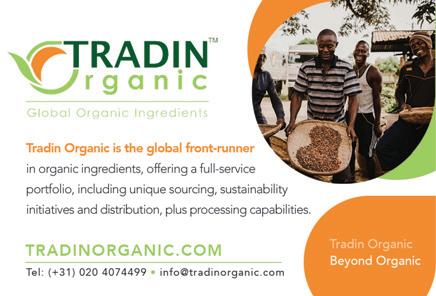
According to Lifefood, good health and wellbeing are not just about great nutrition and high-quality products loaded with the best
ingredients. It is also about spiritual health. “Spirituality in general is important for me personally,” Ms Havrlandova explained, “and for a lot of our staff.
“Our company has been a magnet for people living alternative lifestyles and we’re happy about that because making food isn’t just about mixing two ingredients together and shaping it: It’s also about creating a certain good energy that we want to deliver to the consumer. We believe that for consumers for whom spirituality is important, our approach resonates with them.”
Since its inception, Lifefood has charted a course based on the company’s convictions, and nutritional philosophies. It is proudly a trendsetter rather than a follower, as Ms Havrlandova explained: “We are not focused on identifying and following trends in the marketplace.
Of course, we’re aware of certain market movements but in general, we are careful about how we respond to market demands. So many of these trends are really just fads that don’t last, and many are also based on nonsensical nutritional claims.
“Ever since we opened, we’ve been focused on creating trends, especially in the raw food category with our raw bars. We were the first in Europe to produce these bars and we created the date-based bar category. We’ve always pursued our own objectives based on our philosophies and so far, we’ve found success with that approach.
“I love having the opportunity to develop new products and then introduce them at shows where people have a chance to taste them,” she concluded. “Seeing people’s reactions and how they marvel at our products is so exciting. It’s a constant reminder that we’re doing something amazing.” n

Re - zeknes G al¸as Kombinats (RGK) is a full-cycle meat processing company that has risen to the top of its sector in Latvia and is now cracking the European market. Andy Probert caught up with Arturs Žuravl ¸ovs, Head of the Structural Unit (Meat Processing) on RGK’s future ambitions and influence on the vegan front.



Twenty years ago, R ez eknes Ga l ¸ as Kombin ats (RGK) was a fresh-to-the-market start-up meat company, employing 25 people and producing 20 different meat products for local retail.
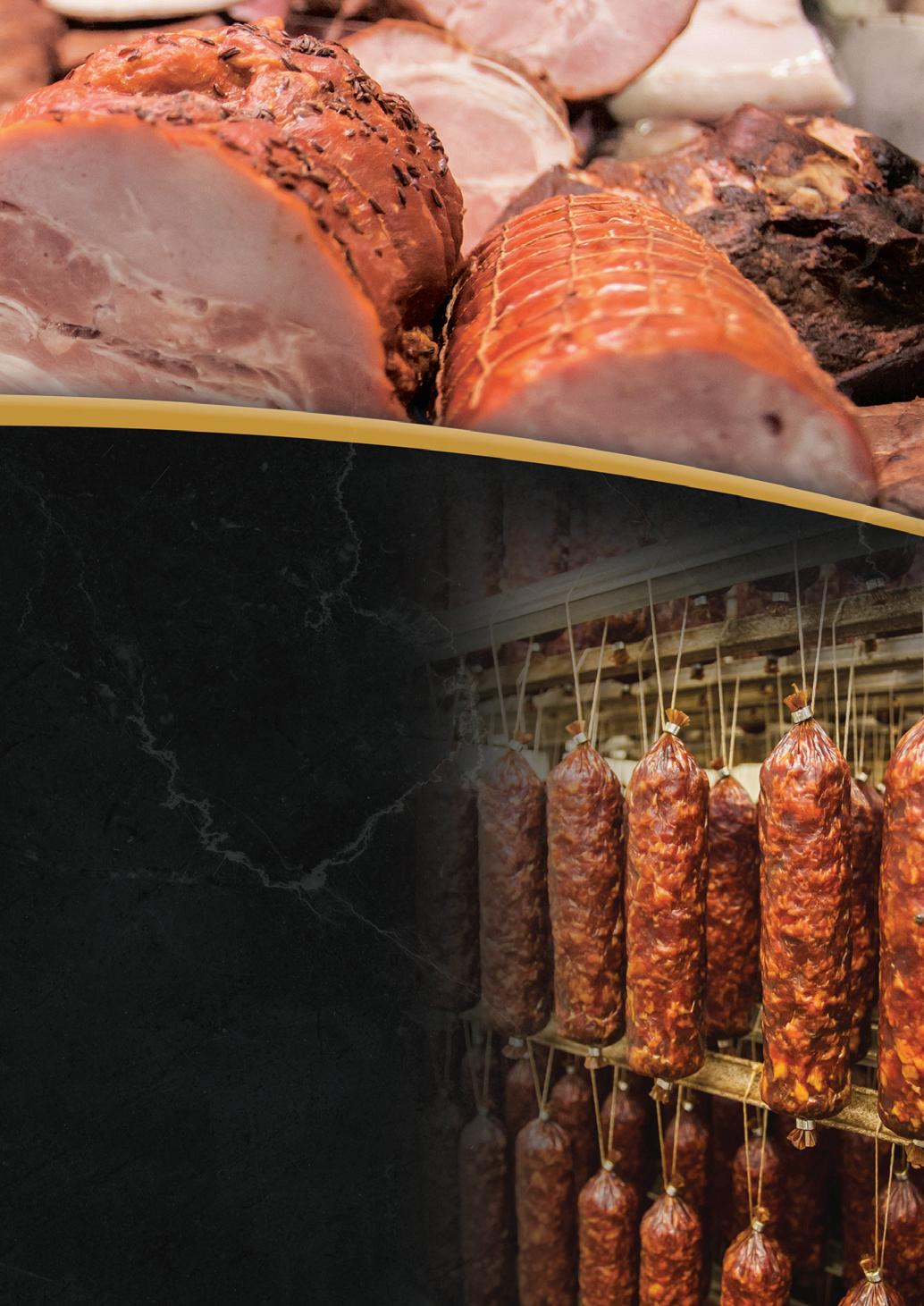
Today, the award-winning company has cemented its position as the number- one retail meat product supplier in Latvia. It has four factories across the country, employs more than 700 people, and complements its exhaustive portfolio with 300 different products in 13 groupings.
“The main reason for Re - zeknes claiming the top position is through our commitment to high-quality products, being a reliable partner, staying ahead of emerging trends, and adjusting rapidly to market changes,” said Arturs Žuravl¸ovs, Head of RGK’s Structural Unit (Meat Processing).
Whether its pork, ham, beef, and chicken, or dried, tinned, chilled, frozen and fresh, RGK covers every angle in the retail sector. At the heart of the operation is full control of the cycle from slaughter to warehousing , transport and logistics.
While average business growth has risen to 10%, dominating RGK’s drive is the export market potential. Now claiming a touch over 50% of its turnover, the company ships quality fresh and frozen semi-finished products, such as burgers, meatballs, kebabs, and vegan lines, to retail clients in Estonia, Russia, Lithuania, Scandinavia, and the UK.
He added: “Latvia is a country of only two million people, so export is incredibly important to us and is growing rapidly. We have opened new markets in the last two years, and we specifically tailor our products to each country. Different tastes and different regulations demand different approaches, but RGK is highly adaptable.”
A new vegan range has fuelled customers’ curiosity, and Mr Žurav l ¸ovs acknowledged RGK was delighted at the highly positive feedback on the ground from vegans, vegetarians, lovers of healthy food and flexitarians.
The basic ingredient of the vegan product line is pea protein. Ground peas from Latvian farms are used for their extraction as peas are a natural, high-quality plant-based protein with a high protein and lower calorie content.
The products, which include frankfurters and boiled sausage, do not contain meat, preservatives, soy, or the flavour enhancer E621, are low in sugar and high in protein. These are mainly exported frozen to Poland, Baltic States and Cyprus.
Mr Žurav l ¸ ovs added: “Our food production workflow organisation meets the requirements of EU standards, and allows us to stay up to the competitive challenges of the European markets.
“By maintaining regular contact with both Latvian and foreign partners, RGK can ensure perfectly-timed delivery of ordered products with its own transport.”
The company’s loyal Latvian-client base includes large retail networks and catering enterprises, such as Rimi, Maxima, and Elvi, as well as hospitals, schools and kindergartens.
The main hub of operation is centred at the RGK Meat Factory, in Re - zeknes, northern Latvia. Here the full cycle meat processing plant accommodates the slaughtering of livestock and ends with the finished product delivery to shops. Each production step is protected by strict sanitary control and the factory has been ISO and BRC-certified.
The slaughterhouse can process up to 800 pigs per day, and RGK’s cutting and packaging unit of fresh meat operates with a daily output of up to 70 tons.
In 2017, a new fresh meat distribution workshop was opened, providing high-quality raw materials for consumption and significantly increasing monthly production. The factory also has a smoking chamber for cold smoked sausages. Here the meat is prepared using high-quality spices, as well as by smoking and drying in a natural environment in alder and beech smoke.
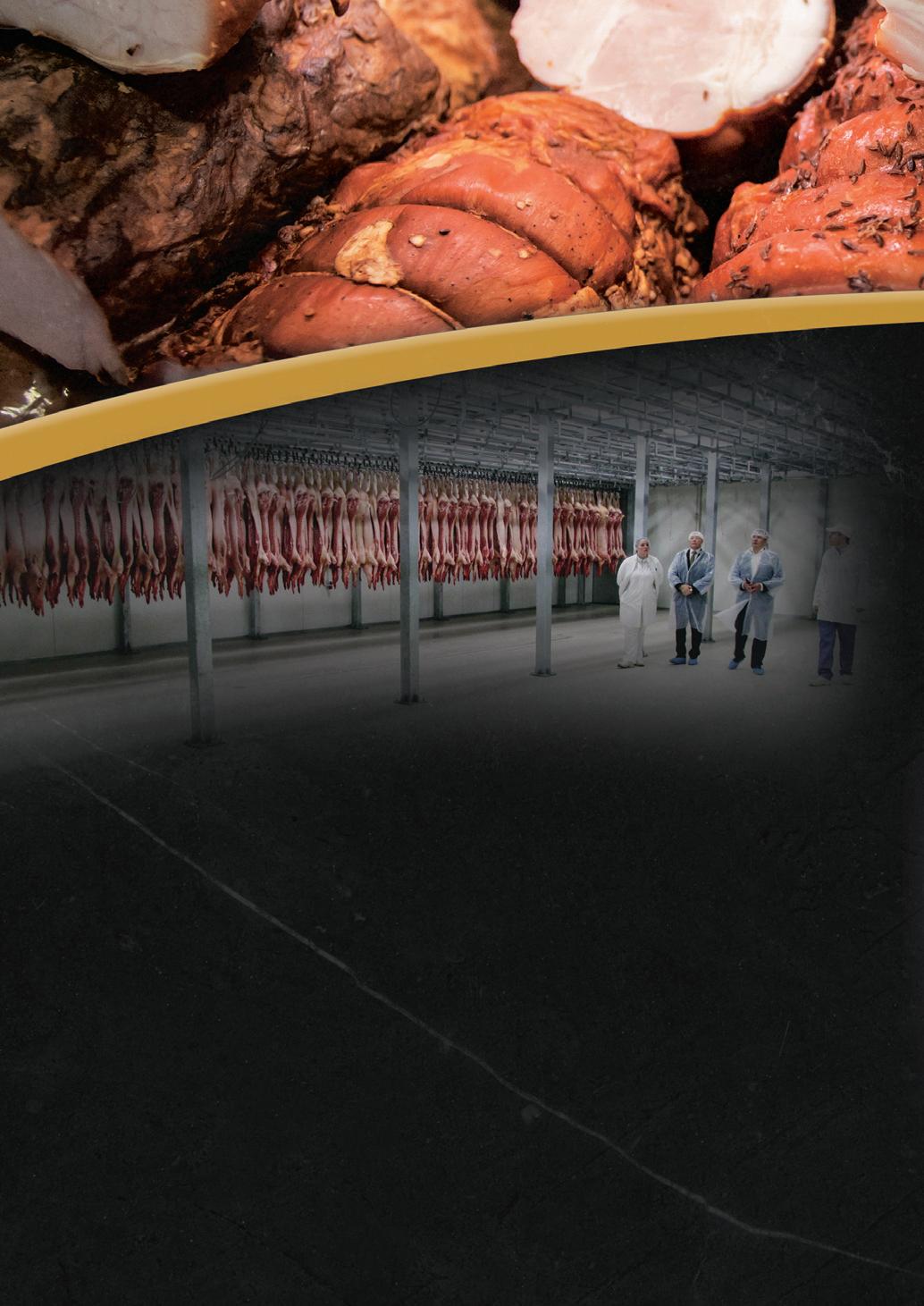
Its canned food production began in 2009 and presently includes more than 75 products made of beef, pork, chicken and game meat , with optimum capacity running at 1.5 tons per month.
Semi-finished and frozen food production includes dumplings with pork, beef, lamb, chicken and halal dumpling, as well as pancakes and meatballs. These and other frozen products are available in Latvia and exported to Europe.
Shashlik and barbecue meats for grilling are also offered with an assortment of diverse marinades, including greens, vinegar, onions, yogurt and spicy products.
RGK’s second factory, in Cesis, offers slaughtering capacities, mainly for cattle, sheep, goats and ostriches, and handles the
distribution of beef and lamb, as well as wild and raised-in-captivity, hunted animal carcass processing. It is the acknowledged market leader in beef processing in Latvia, with the slaughtering of 1,600 cattle per month and 100 tons of meat distribution.
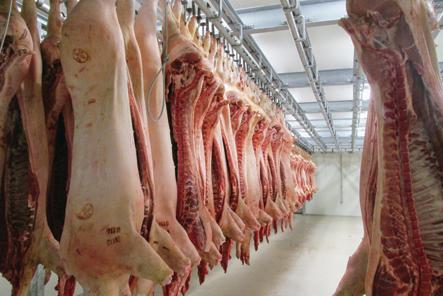
As well as running the Riga Structural Unit and a unit dedicated to dried-smoked sausages and halal products, RGK operates 48 temperature-controlled vehicles that regularly deliver countrywide, and to Germany, Lithuania and Estonia.
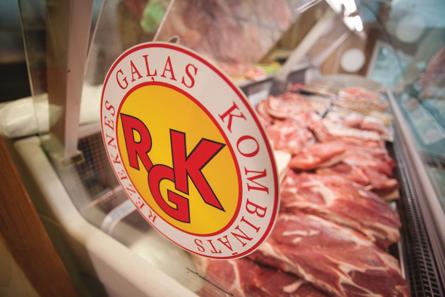
Growing demand from clients has prompted the company to invest in the further modernisation of its facilities, including the building of a new high-tech slaughterhouse to help increase capacity.
“We are also investing in new technologies and energy effectiveness, such as solar panels, to ensure reliable power supplies,” revealed Mr Žurav l ¸ ovs
In 2022, the Re - zeknes factory’s deboning, production of chilled and frozen meat products and the production of canned meat were recognised with the BRC Global Standard for Food Safety.

Mr Žurav l ¸ovs said: “RGK’s focus for the next few years will be to expand its reach across Europe, and continue developing our high-quality, innovative product range.
“As a client-oriented and reliable partner, RGK is not simply trying to sell what is produced. We remain ever vigilant to fast changing trends and are always looking to tailor what the customer wants in their country or market segment.” n
Sensacions Gastronomy and Emotions has 12 years’ experience delivering stunning catering to corporate events, weddings and family celebrations. Owner and Events Director Josep Carreras highlighted a beautiful portfolio of venues and the importance of teamwork, in conversation with Phil Nicholls.
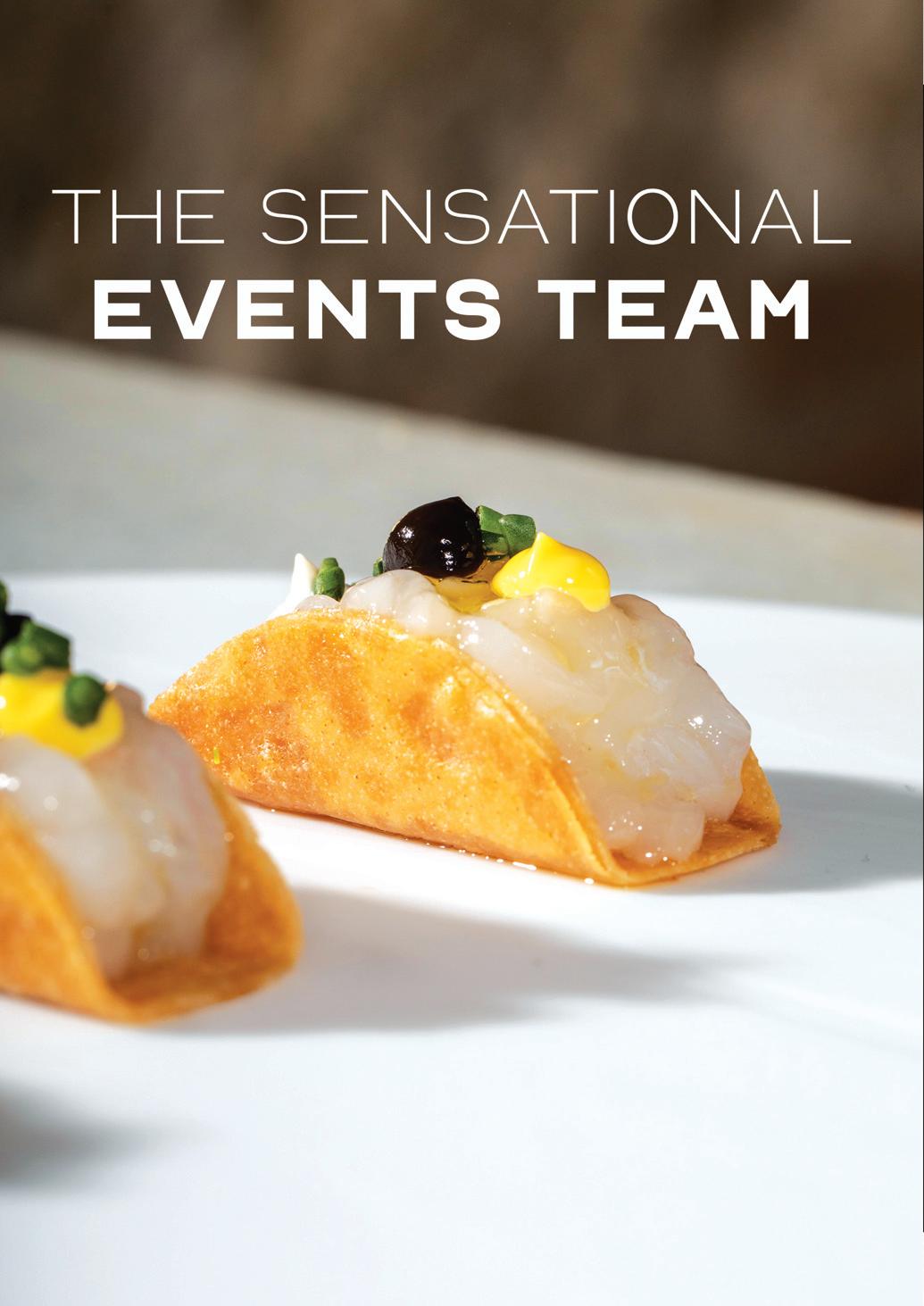
Like so many companies in the hospitality industry, the past few years were a challenge for Sensacions Gastronomy and Emotions. However, the combination of a depletion of savings, the negotiation of new finance lines and sacrifices by the loyal team helped the company weather the pandemic and emerge in 2022 stronger and revitalised.
“The recent difficulties we experienced brought the Sensacions team even closer together and strengthened our bonds,” explained Owner and Events Director Josep Carreras. “Companies are made from the people who work there, and the workforce represents a company’s greatest differential value.”
Sensacions was established in 2010 by four founding partnersJosep, Oriol, Elena and Sergi. The founders met when working for another company and decided to set up their own first-class catering service for events principally in Barcelona and across th e width and breadth of Catalonia.
In 2015, Sensacions acquired its headquarters at Can Magí, with superb kitchens and event space. The Can Magí farmhouse is part of the town Sant Cugat del Vallès, close to Barcelona. The venue offers a wealth of versatile interior and outside spaces for corporate and private events all year round, up to a maximum of 1,200 people. The building was built in 1878 and maintains a historic charm.

“Sensacions also runs Vallfont,” said Mr Carreras, “a recently renovated 12th century venue, set amongst three hectares of vineyards. Vallfont is set in the heart of the Penedes region, 50 minutes from Barcelona and 45 minutes from Tarragona. Here we have a variety of indoor and outdoor spaces that can hold groups of up to 240. The site also offers accommodation for up to 30 people.”
Finally, Sensacions is the preferred caterer at Xalet del Nin a farm located in Vilanova i la Geltrú, on the Garraf coast. Xalet del Nin was built in 1913 by renowned Catalan architect Josep Font i Gumà. Up to 250 guests can enjoy the incredible views of the Mediterranean Sea from Xalet del Nin’s impressive gardens Delivering events at these amazing venues is the highly trained Sensacions Gastronomy and Emotions team. It is the quality of this team that ensures every guest has an enjoyable experience, according to Mr Carreras: “We have more than
50 people directly employed in Sensacions, and many more who add to the services as waiters, kitchen and logistics assistants, and florists.
“Some of our team have the restlessness and freshness of youth, while others bear the responsibility of their experiences. All of them form the Sensacions team, sharing the same values and helping us improve daily.”
The flexible Sensacions team offers a wide variety of comprehensive corporate services to complement and personalise e vents in small, medium and large formats. The company will organise corporate events, anniversary parties and any famil y celebration, turning each event into a magical experience.
However, the core of Sensacions’ business revolves around hosting weddings. Every wedding is personalised according to the requirements of the couple, with the experienced team offering a variety of wedding themes, including classical, outdoor, rustic, vintage, family style and many more.
Once the Catalan government’s Covid restrictions were eased at the start of 2022, Sensacions enjoyed a productive year.
“We started working again in March,” explained Mr Carreras, “and by the end of November, we exceeded 2019’s turnover by 25%.
“As they say, the calm always follows a great storm. With our instinct for survival, the empathy of our team and suppliers, and above all the widespread support of our customers, Sensacions retains its presence in the sector, with greater strength and enthusiasm than ever.
“We specialise in large corporate events, where the preparations and especially the presentation, requires experience and a lot of effort. However, weddings are our main day-to-day event, where we like to exceed the expectations of customers and help make a memorable day.”
As a dedicated catering company with in-house specialist chefs, Mr Carreras was clear about the appeal of Sensacions: “What makes us unique is how we create everything we offer. Also, we are committed to our origins, with priority for local products, which are excellent in Catalonia and Spain.
“Of course, what also makes us different is our team, the way we love our work. We are creative and responsible, safe and
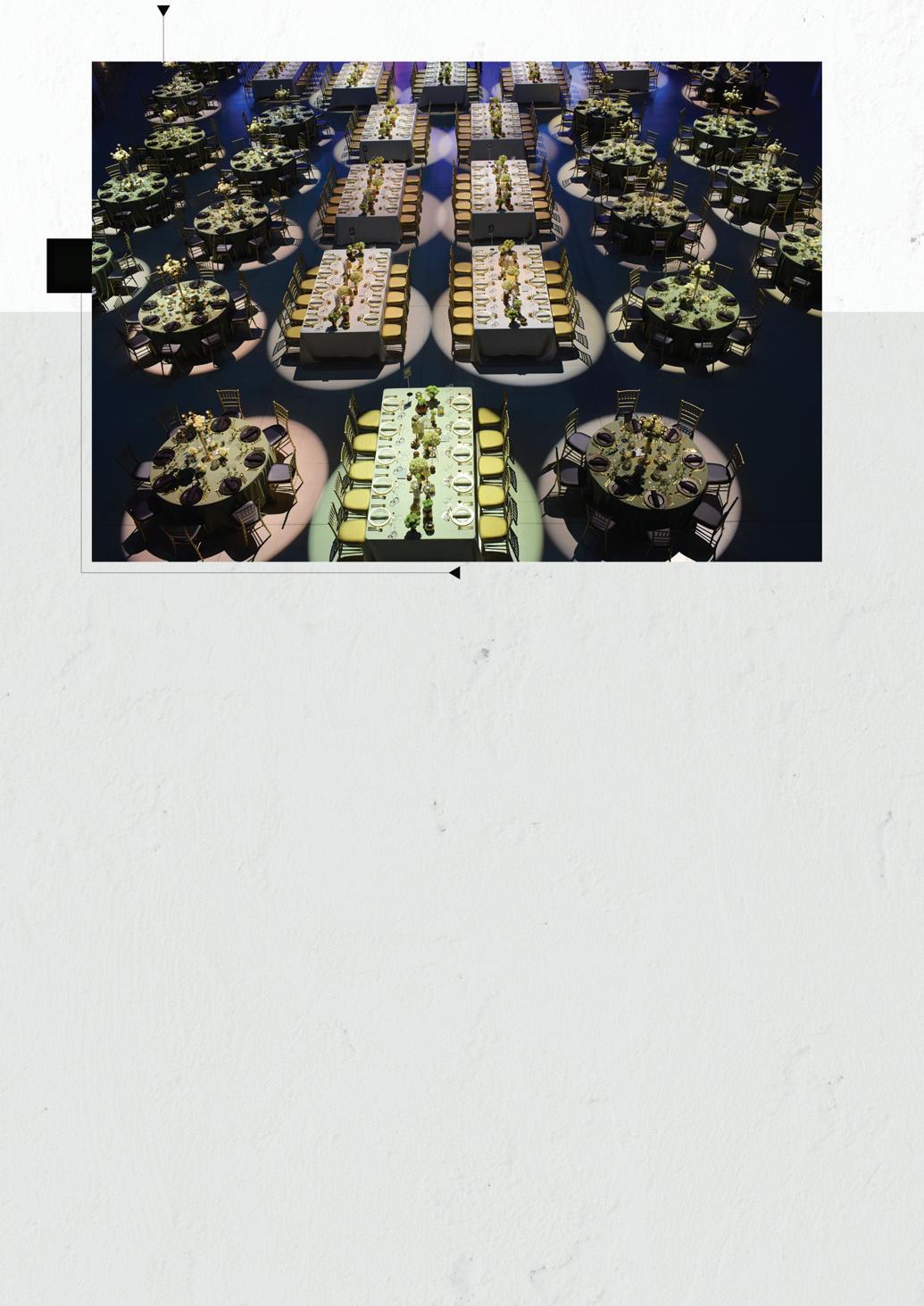
“What makes us unique is how we create everything we offer. Also, we are committed to our origins, with priority for local products, which are excellent in Catalonia and Spain”Corporate Event in MNAC, Barcelona
passionate, combinations that align us very closely to the expectations of our customers.
“Sensacions offers a comprehensive service, as well as food and drink. What sets us apart from the competition is our team of experienced event specialists who create unique and bespoke events with fantastic decorative and entertainment options, regardless of the size, type and location of the event.”

Close partnership with suppliers is another aspect of the amazing Sensacions’ offer. Mr Carreras emphasised the importance of honest teamwork and the necessity for high standards throughout the supply chain.
“Sustainability is one of our biggest challenges,” Mr Carreras said. “We began taking responsible actions in 2020, and the plan for 2023 is to accentuate them. Our priority is to use local products with a low carbon footprint. At the packaging level, with
fresh products, we only accept sustainable containers. With beverages, we already use only 10% single use bottles or cartons, while the rest are recyclable or reusable.
“While the nature of our business requires transportation and energy,” he continued, “we are considering ways to offset these greenhouse emissions via carbon-offsetting companies. This is our contribution to mitigating climate change and protecting the environment.”
Despite a difficult few years due to the extended Covid restrictions, Sensacions remains optimistic for the future. Mr Carreras cited the team’s self-belief and dedication as grounds for this positive outlook.
To accommodate this potential for growth, Sensacions already has a plan to expand, according to Mr Carreras: “We are evaluating grouping the central kitchens with the logistics centre, to optimise our resources. The volume of work we perform has taken us almost to the threshold of our capacity. In the coming years, this expansion will surely be a great investment.”
Supported by an extensive, highly trained team, Sensacions is looking forward to helping more clients enjoy memorable weddings and events. “At Sensacions, we have the great luck to make people happy with our work,” Mr Carreras concluded. “This experience excites the team and gives us the energy to keep going with as much passion as ever.” n

Mission Foods is one of the world’s largest manufacturers of tortilla wraps and a leading supplier of flatbreads, tortilla chips and accompaniments. Richard Hagan explores how Mission Foods is extending its brand footprint and meeting consumer demand for its authentically delicious portfolio.

Mission Foods is part of the Mexican GRUMA group of food brands, with a stunning portfolio by any measure. Even more impressive is the continuous growth of the company, rising from a family business to a global food operation. This growth is sustained by Mission Foods’ delicious range of products that are popular with customers around the world.
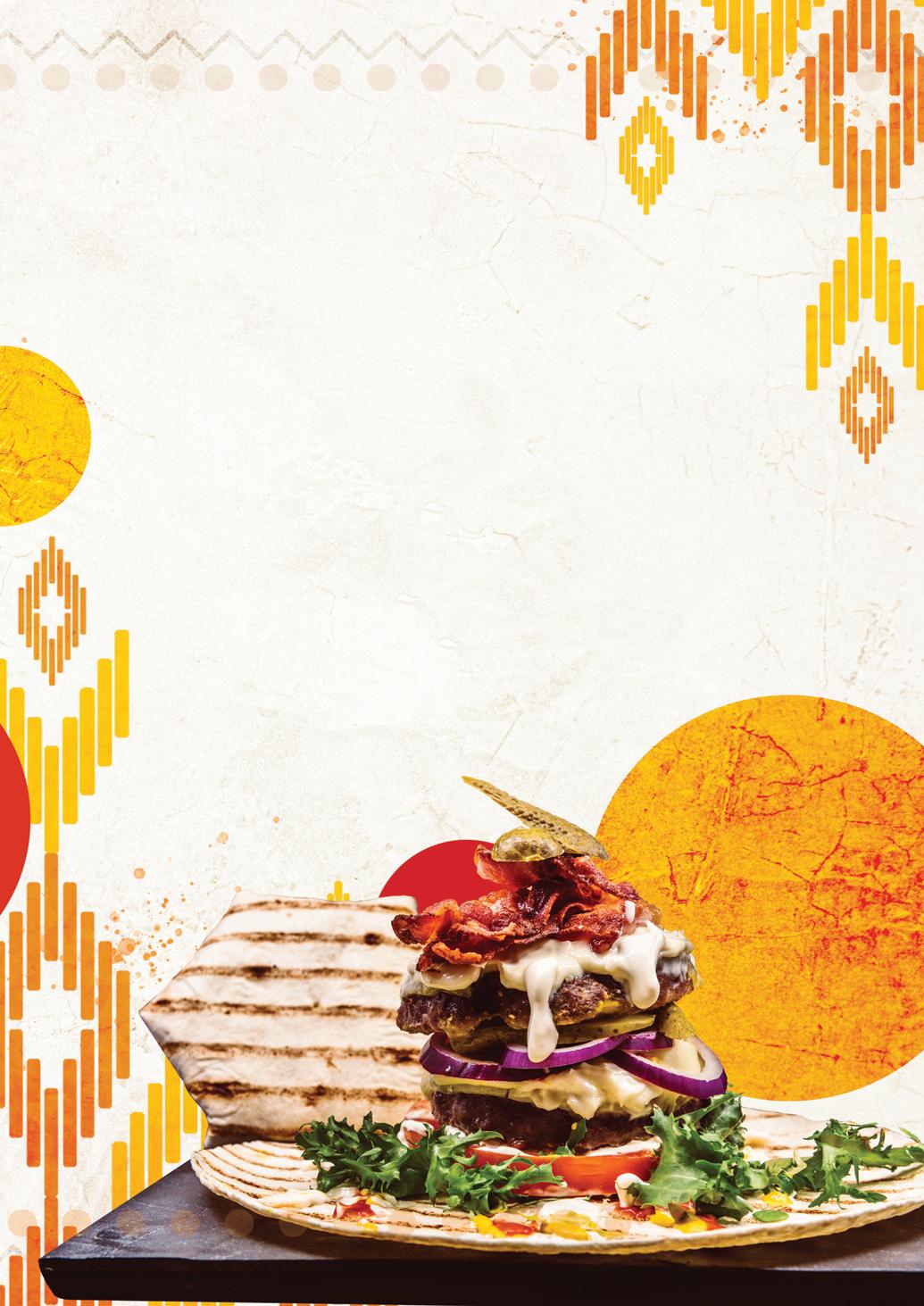
During a trip to Renosa Tamaulipas in 1949, GRUMA’s founder, Alberto Gonzalez Pereira, found an old mill for grinding dried ‘nixtamal’ (limed corn kernels) into flour. It could produce 18 tons of corn flour a month - specifically of the kind used for making tortillas.
Seeing the business potential of the mill, Roberto Gonzalez, the son of Alberto, refined the machinery and later opened for business making tortilla wraps.
The business grew throughout the 1950s, which is also when Mr Gonzalez registered the Maseca (‘dry dough’) trademark which became a cornerstone of the GRUMA empire. The 1970s and 1980s saw the business expand into Costa Rica and the United States. European expansion followed in 2000, when the company opened its first UK plant in Coventry. Since its establishment, GRUMA has had a simple focus - making tortillas readily available worldwide, enabling people to eat them at any time of day, anywhere.
Today, GRUMA remains managed and partially owned by its founding family, proudly ensuring that the company stands at the forefront of innovation and food production technology. Yet, despite this steady growth, Mission Foods has held true to its heritage, ensuring that every product delivers on authenticity, quality and taste.
Due to the diversity of products in the portfolio, Mission Foods is always seeking to enhance its manufacturing operations and expertise. The company continuously invests in ingredients, raw materials and production capabilities, so that it can deliver products to customers’ specifications. The market is constantly evolving, and Mission Foods is always looking to invest for longer term, sustainable growth.
Production capabilities are only half of any food company’s success. Arguably the most important aspect is the ingredients themselves. Mission Foods is equally focused on continuous innovation to ensure that its products meet evolving consumer needs and food trends, whilst also retaining the level of quality and taste which characterise its extensive portfolio.
In early 2022, Mission Foods completed a major project to reformulate its existing branded product range to meet incoming
The company’s new tortillas are compliant with those guidelines without compromising on taste.
The consumer and their love of food have not gone unnoticed. Consumers seek exciting, healthier and engaging food. Mission Foods is constantly striving to maintain the versatility of its products whilst also delivering inspiration, excitement and fun with f amily and friends. Finding solutions for consumers which are easy, engaging, affordable and enjoyable for the whole family is what the brand is all about.
Following the explosion of the street food trend, people are more creative with their cooking and try to re-create those dishes at home. They are making homemade tacos or nachos and having wraps for lunch. The shift in working patterns has created an evolving eating culture.
Children are not left out either – kids’ lunchboxes are also a big play for Mission Foods with the company’s range of mini wraps.
Although Mission Foods has its roots and heritage in Mexico, its food philosophy is not limited to Mexico. Mission Foods products can be used for creating different types of cuisine with quality in every dish, because each product is made to an authentic recipe.

Mission Foods always puts an emphasis on genuine flavours, while providing options that families and friends can enjoy together. The company aims to provide consumers with the inspi ration and the blank canvas to create authentic and delicious dishes using simple ingredients.
The company has also harnessed social media to bring personality to the brand and its portfolio, whilst engaging with consumers by offering recipe inspiration and meal solutions.
Meanwhile, Mission Foods and its parent, the GRUMA group, continue to work hard behind the scenes to ensure that its community support initiatives thrive. Mission Foods works hard to get food into the community in times of crisis. This plays into the history and sentiment behind the whole organisation. Ensuring people do not have to go without and that people can eat and enjoy the product - this is a key part of the ethical pillar within the organisation. These ethical principles also apply to broader sustainability
always puts an emphasis on genuine flavours, while providing options that families and friends can enjoy together. The company aims to provide consumers with the inspiration and the blank canvas to create authentic and delicious dishes using simple ingredients”
“Mission
Foods
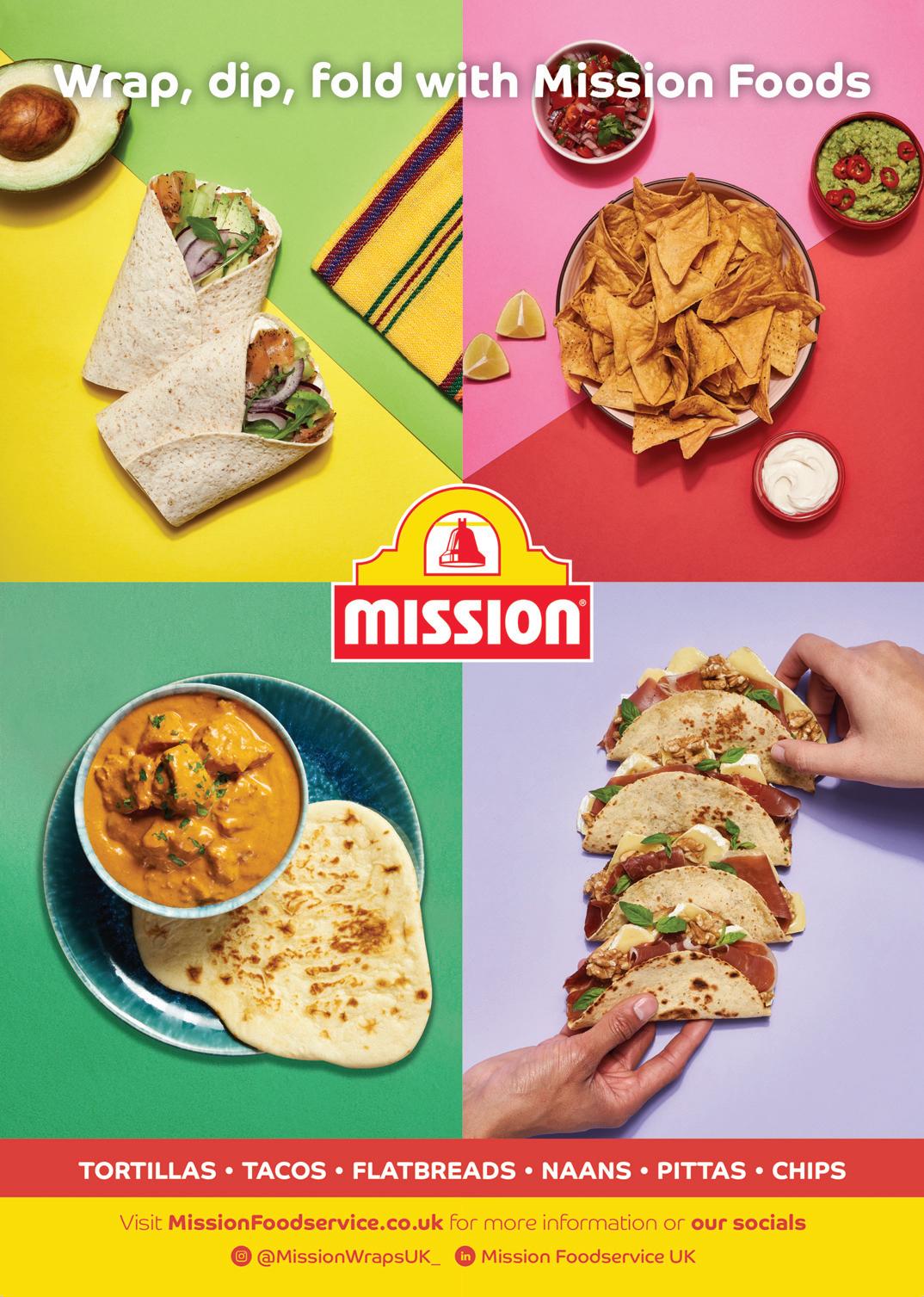
projects. Mission Foods is committed to conserving natural resources, recycling, waste reduction and pollution control to ensure clean air and water, and to limit landfill waste.
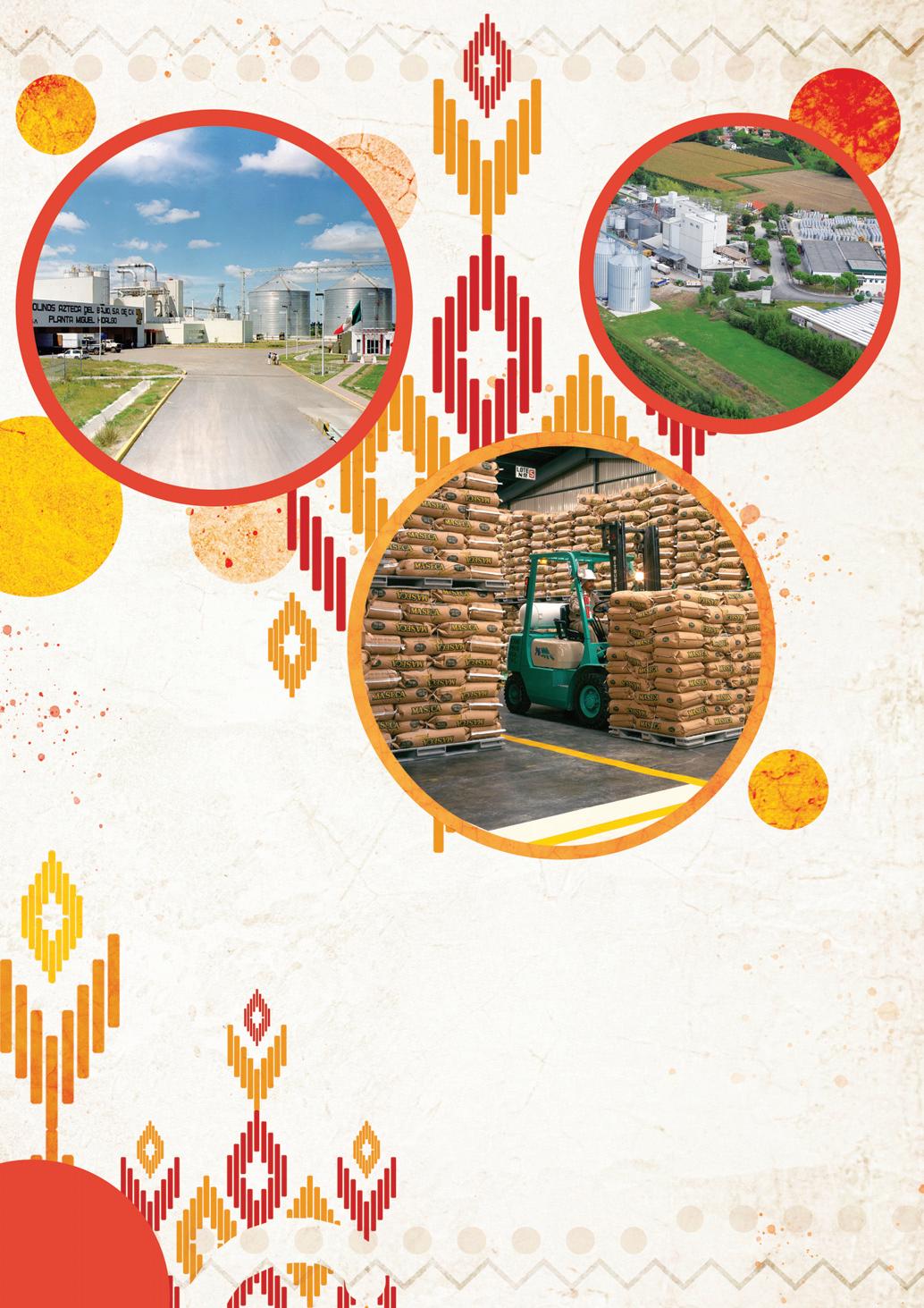
This is combined with a dedication to minimising the carbon footprint of the company’s operations, with an Environmental Management System to identify and manage environmental risks, obligations and opportunities.
Looking ahead, Mission Foods remains committed to the key themes that have b uilt the global brand from such humble beginnings. From the authenticity of the recipes, to delivering quality products and offering inspiring and tasty dishes to the global consumer, these themes remain firmly at the heart of the organisation Combined with the long-standing heritage of Mission Foods is the focus on sustainable growth: the result is a dynamic and innovative business, home to an engaged employee community. n

